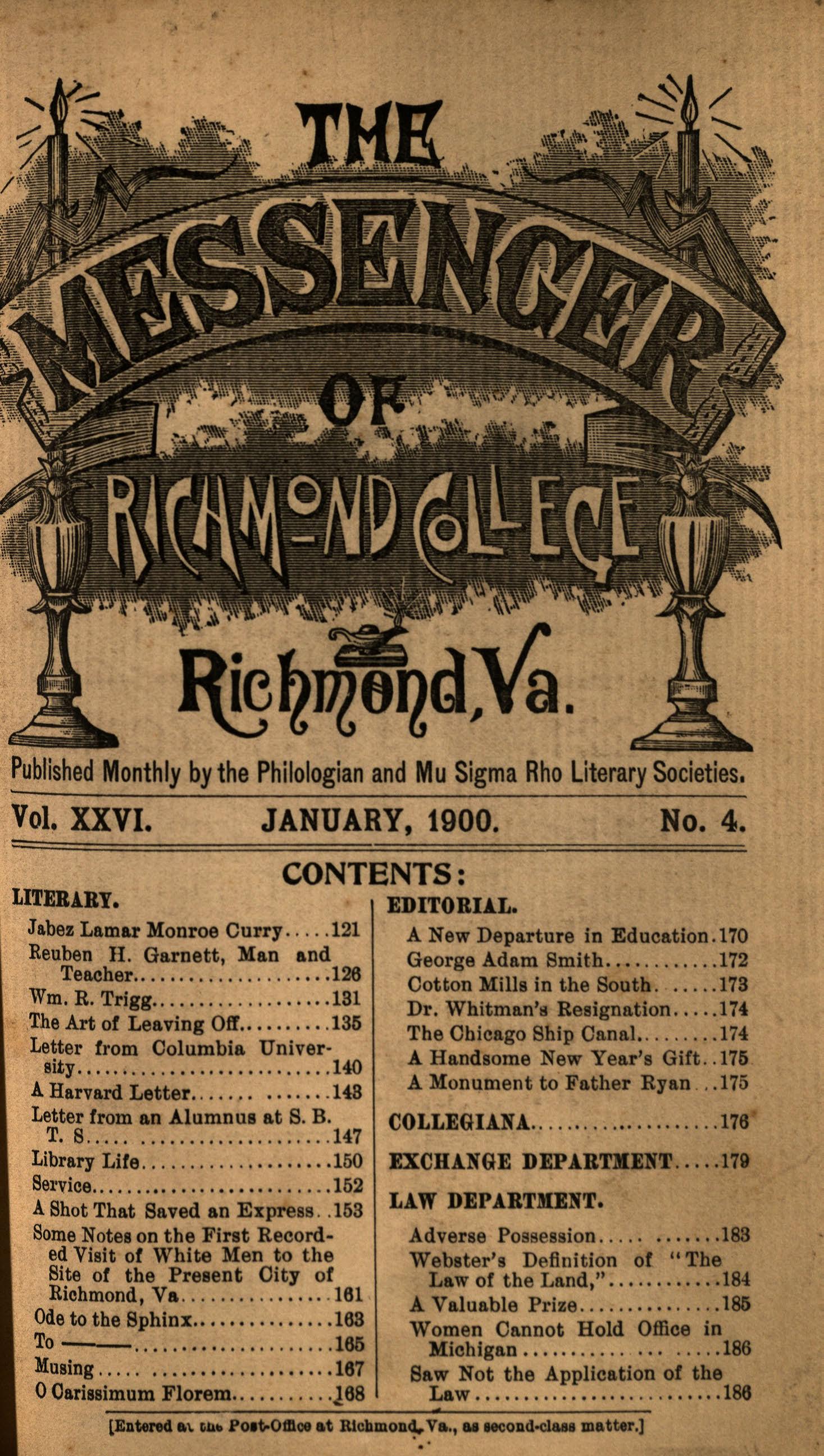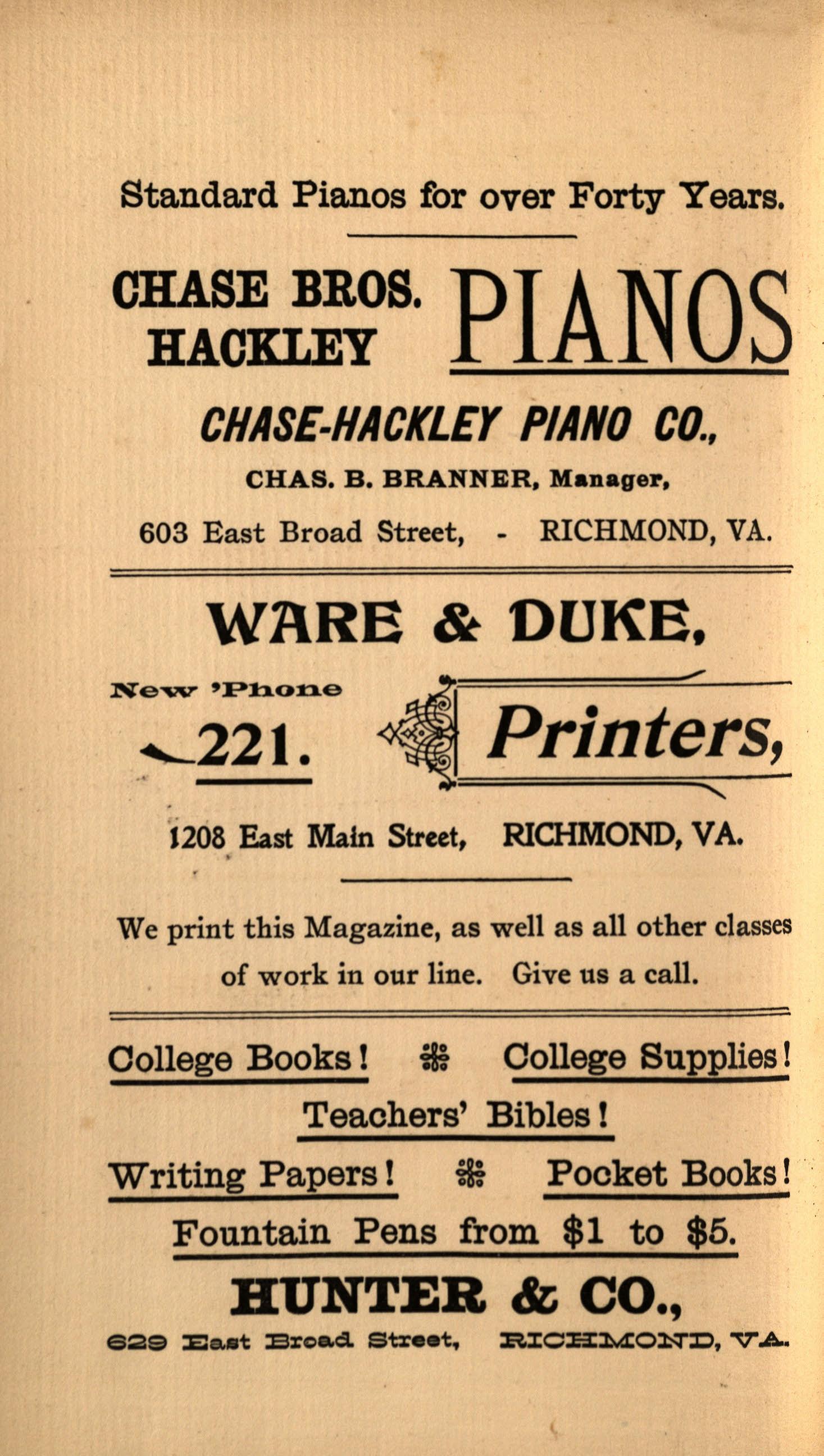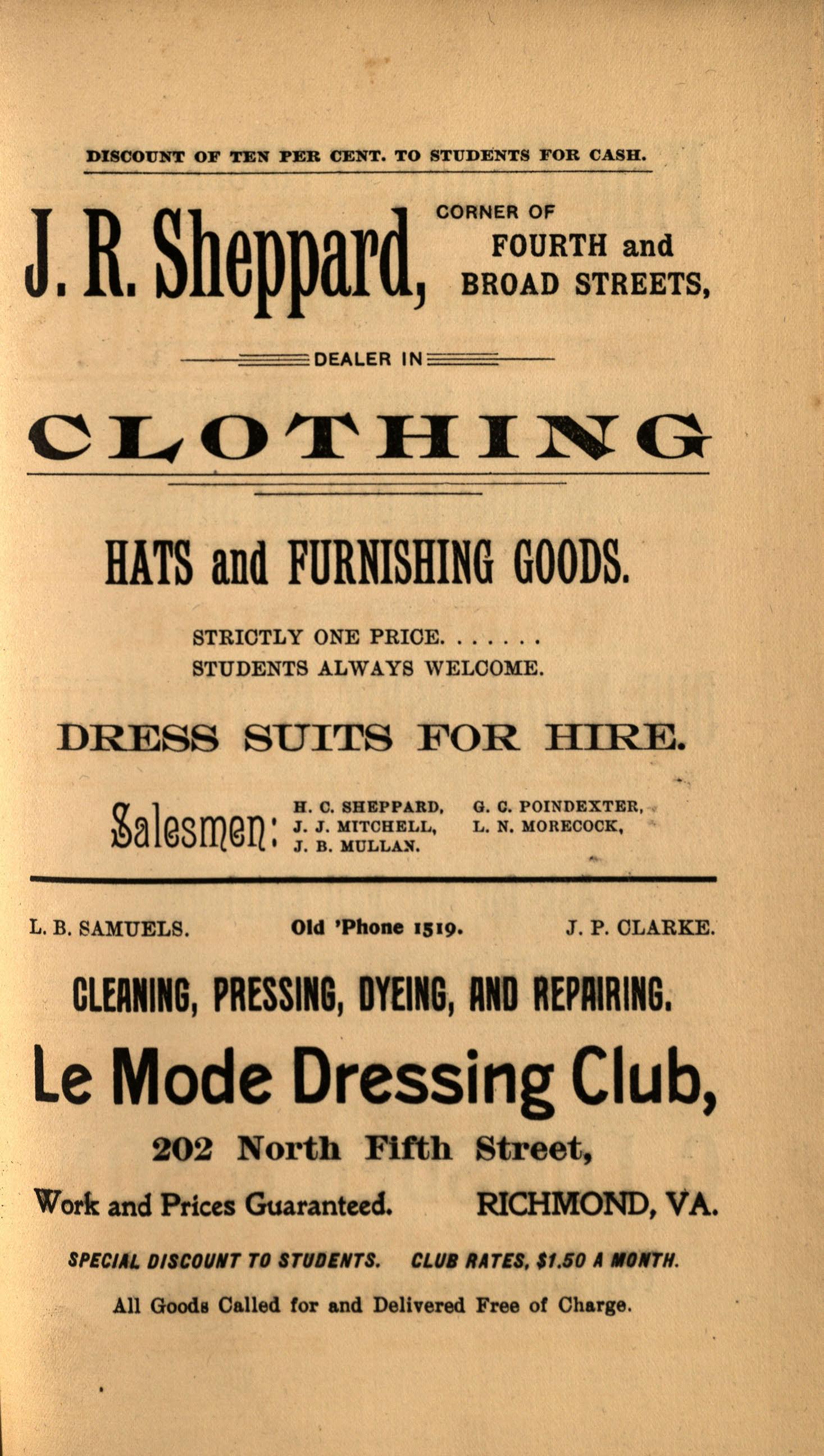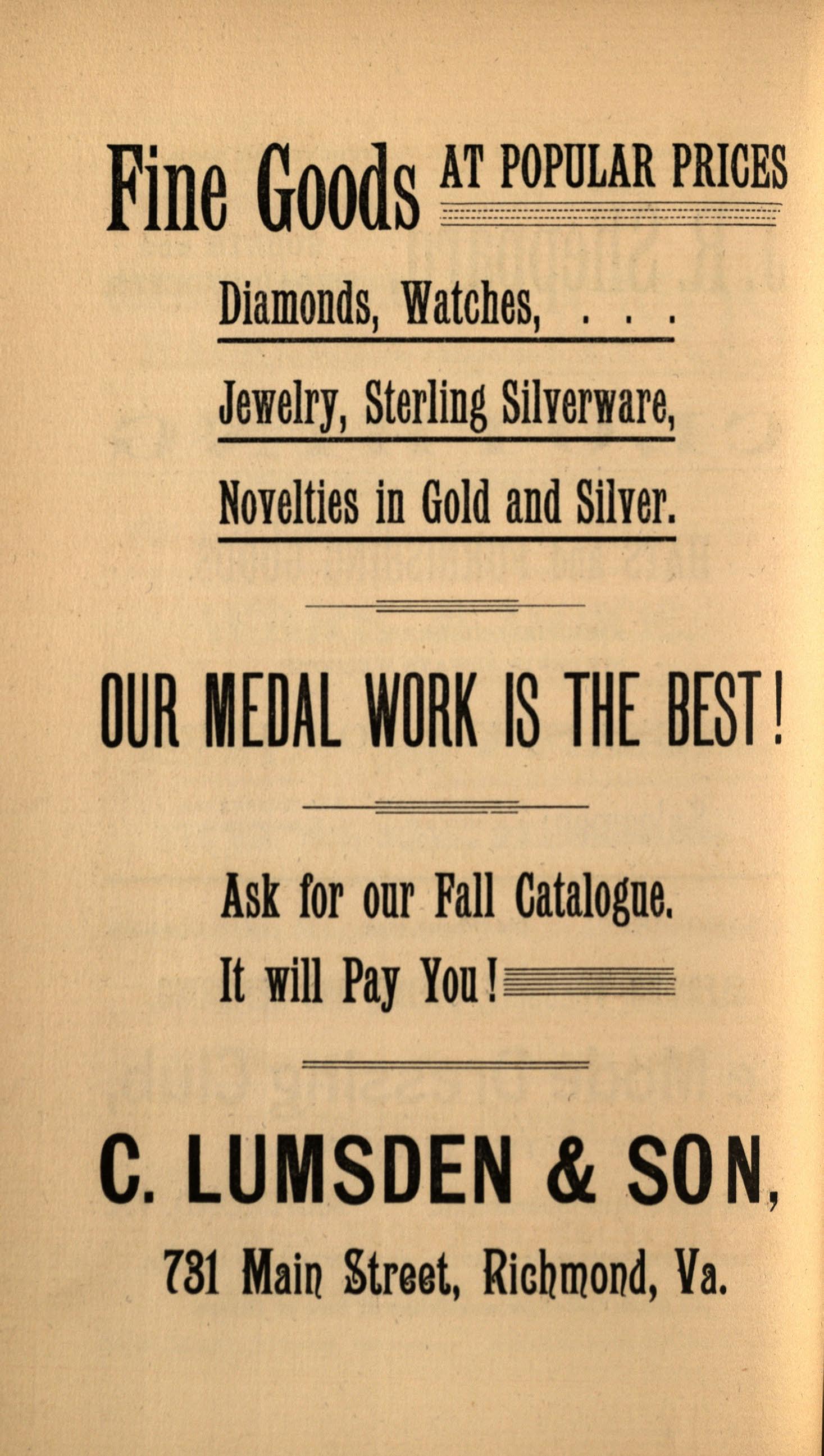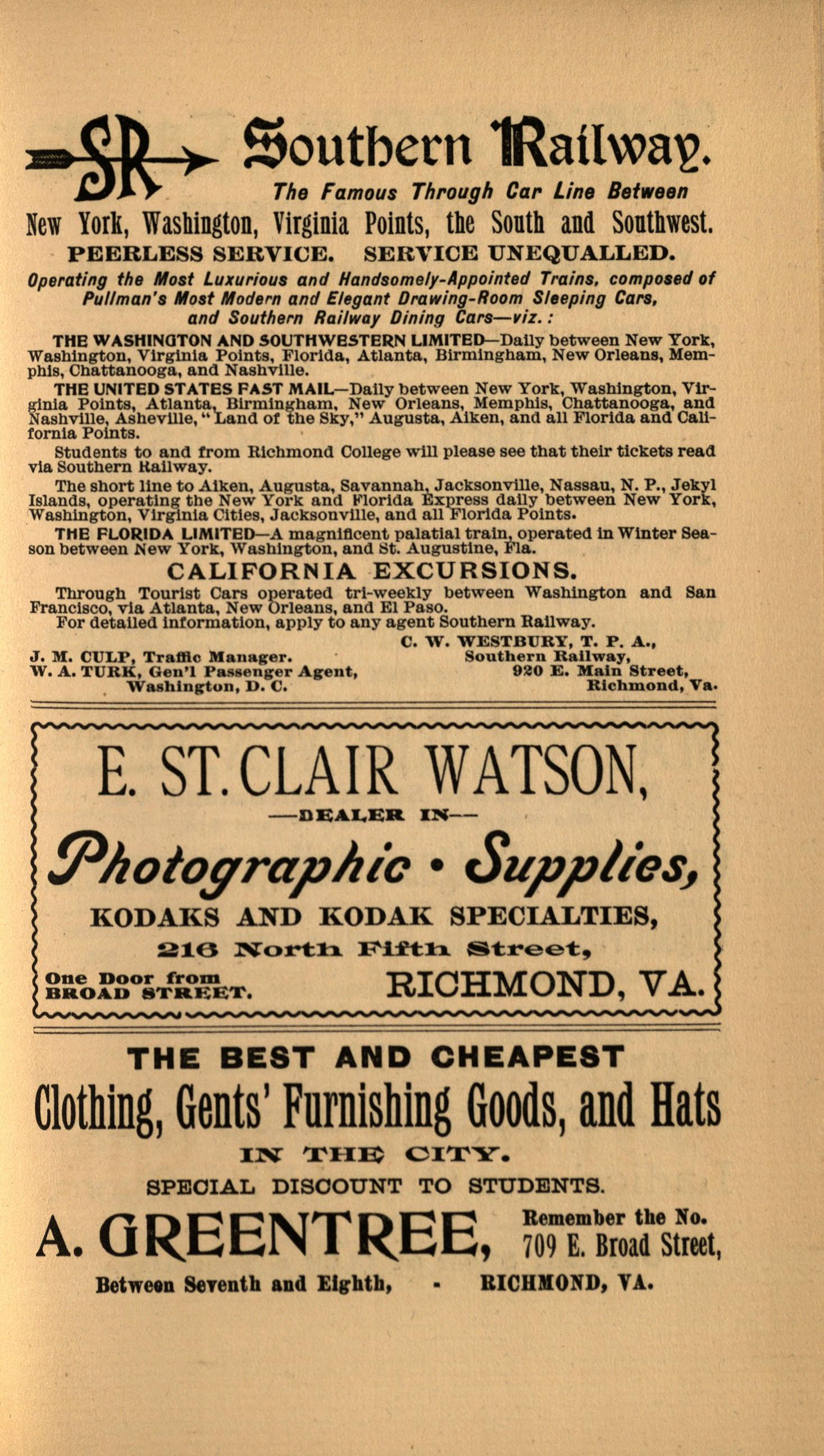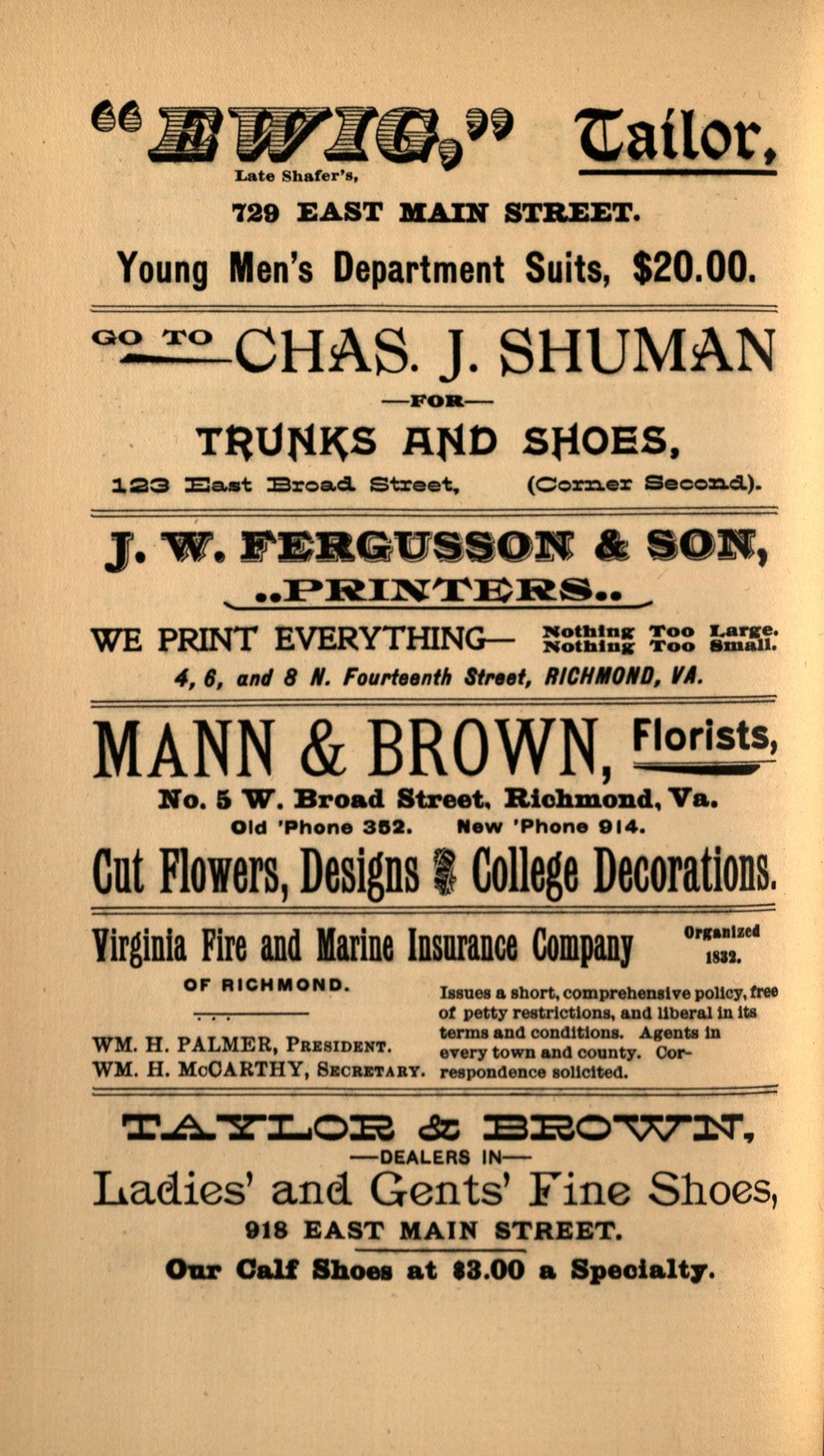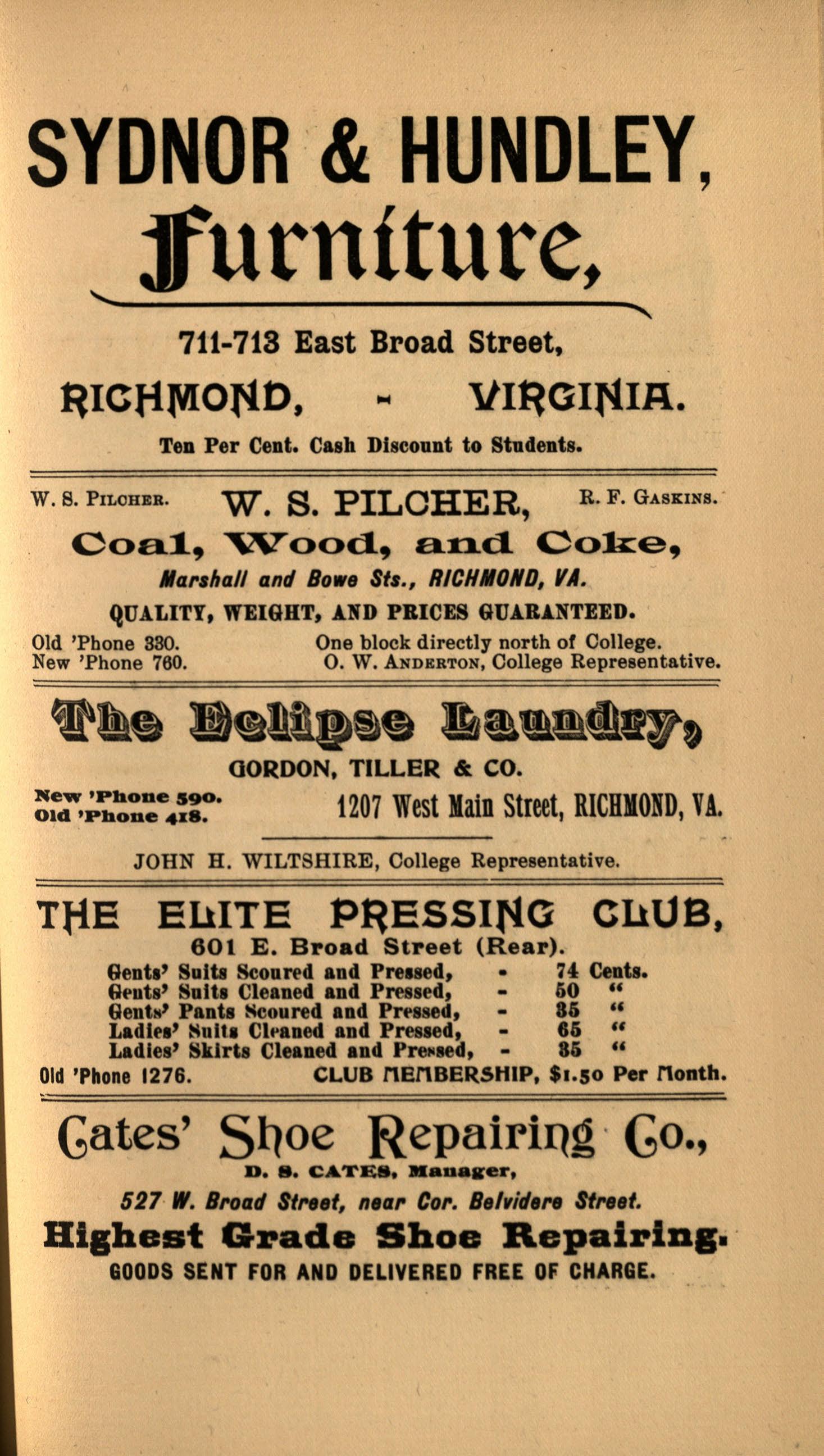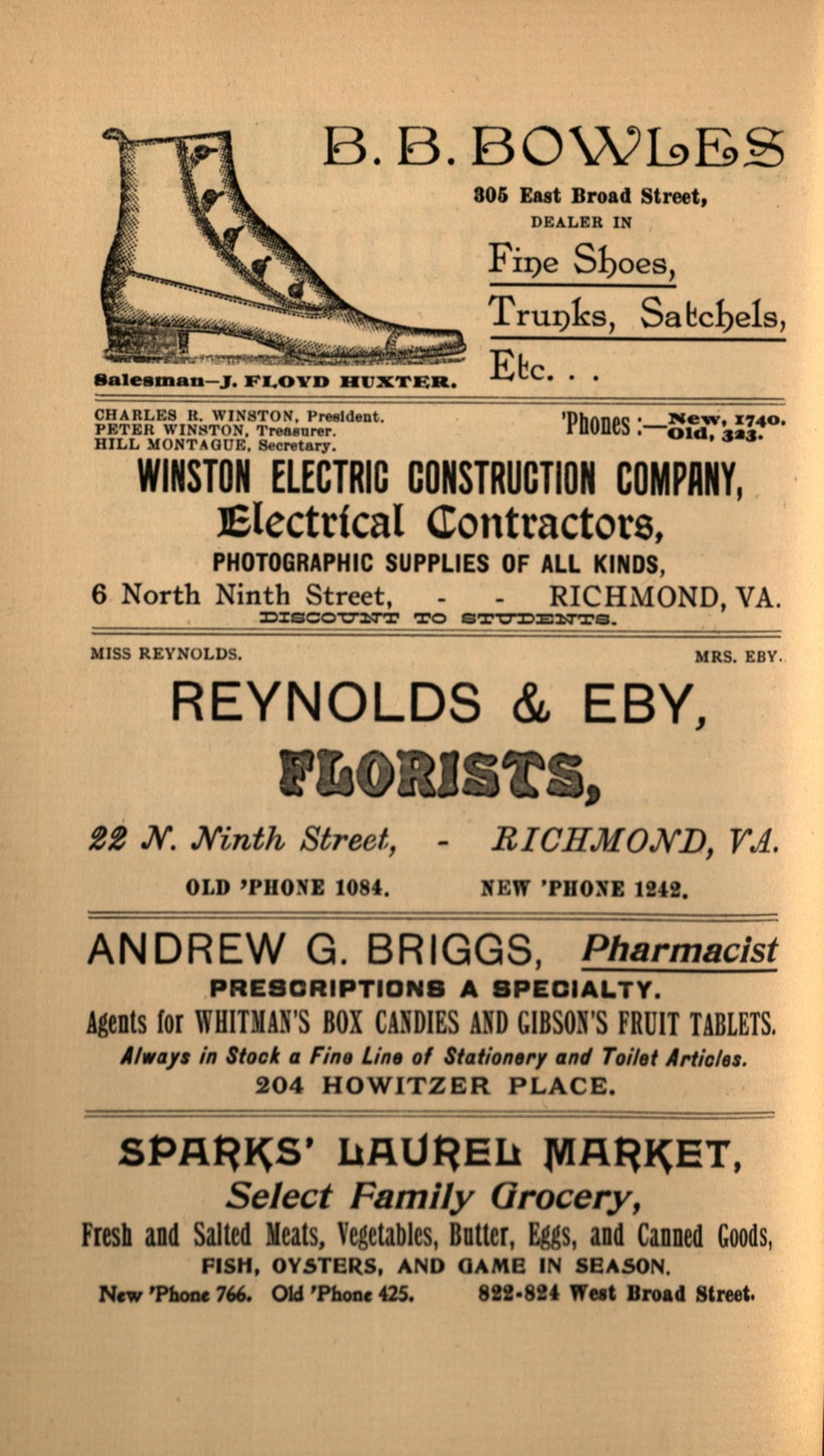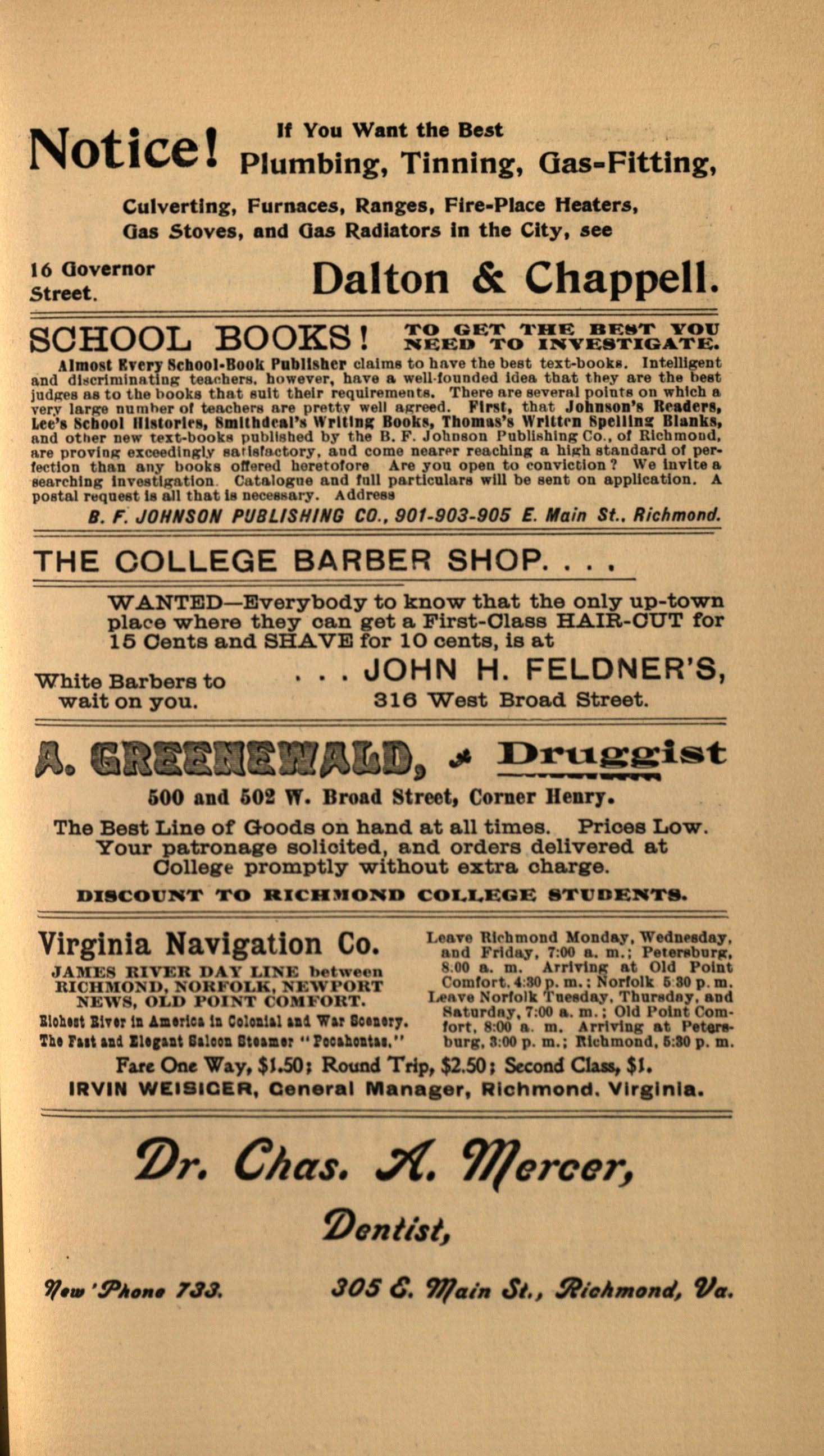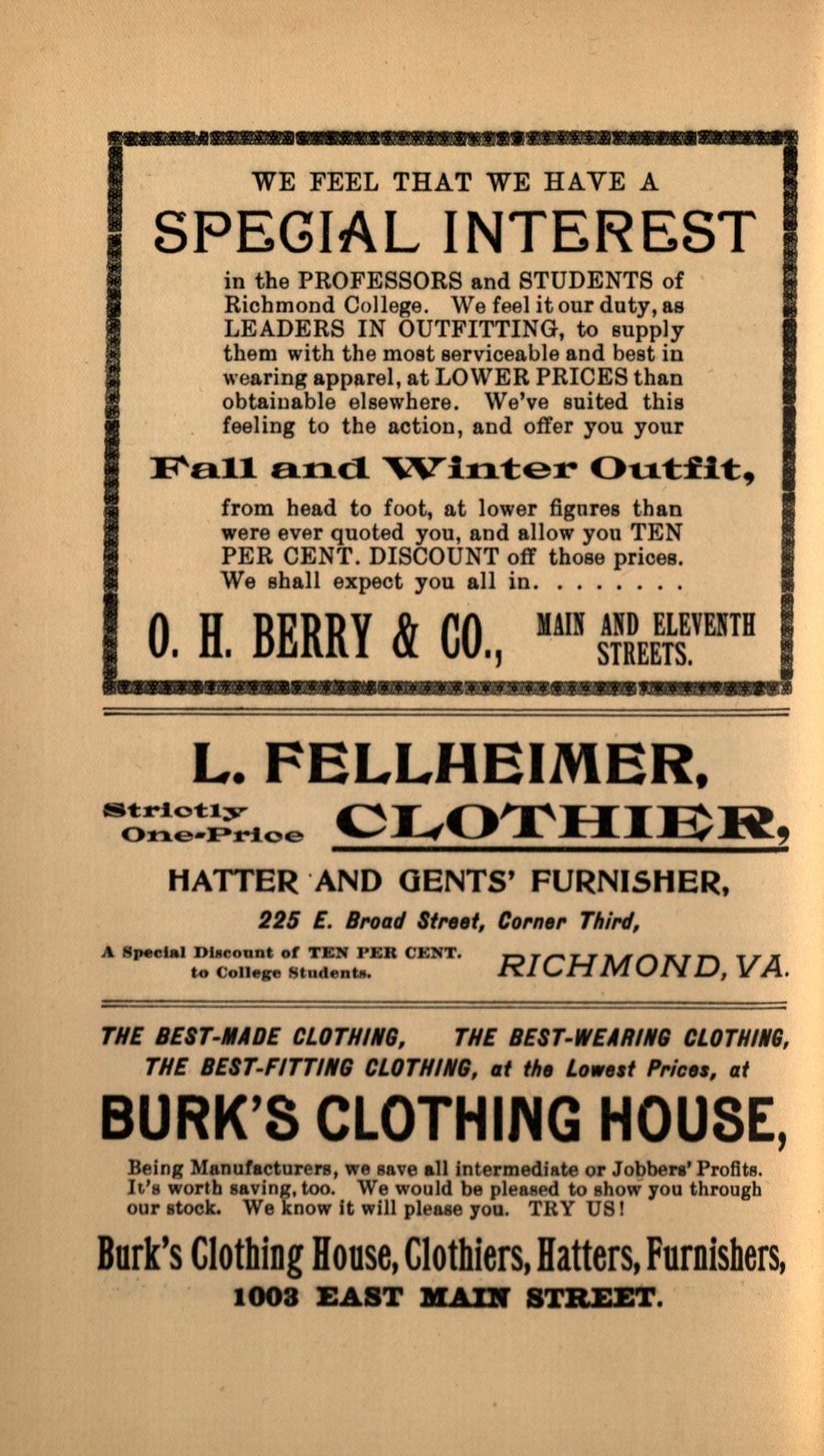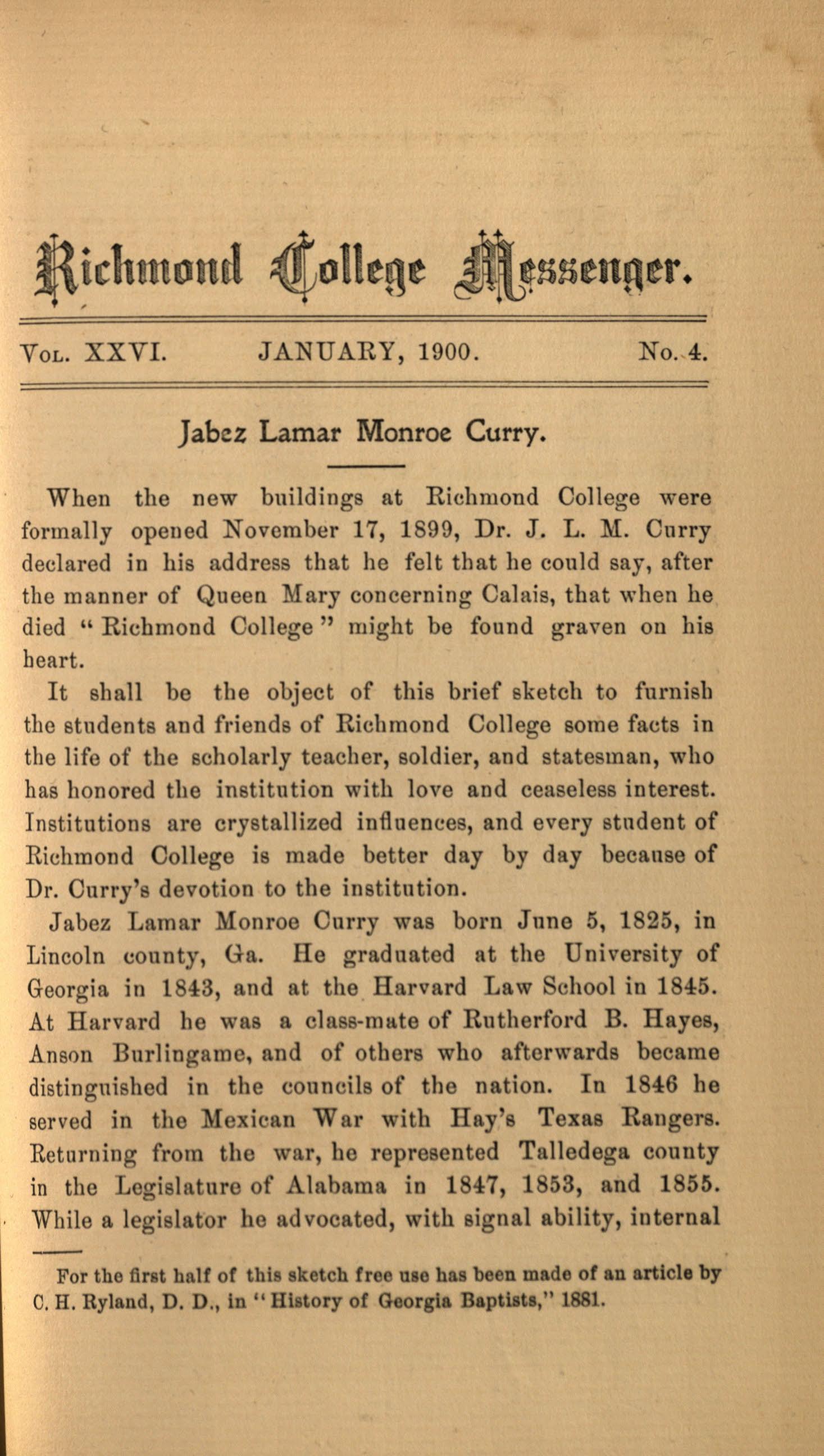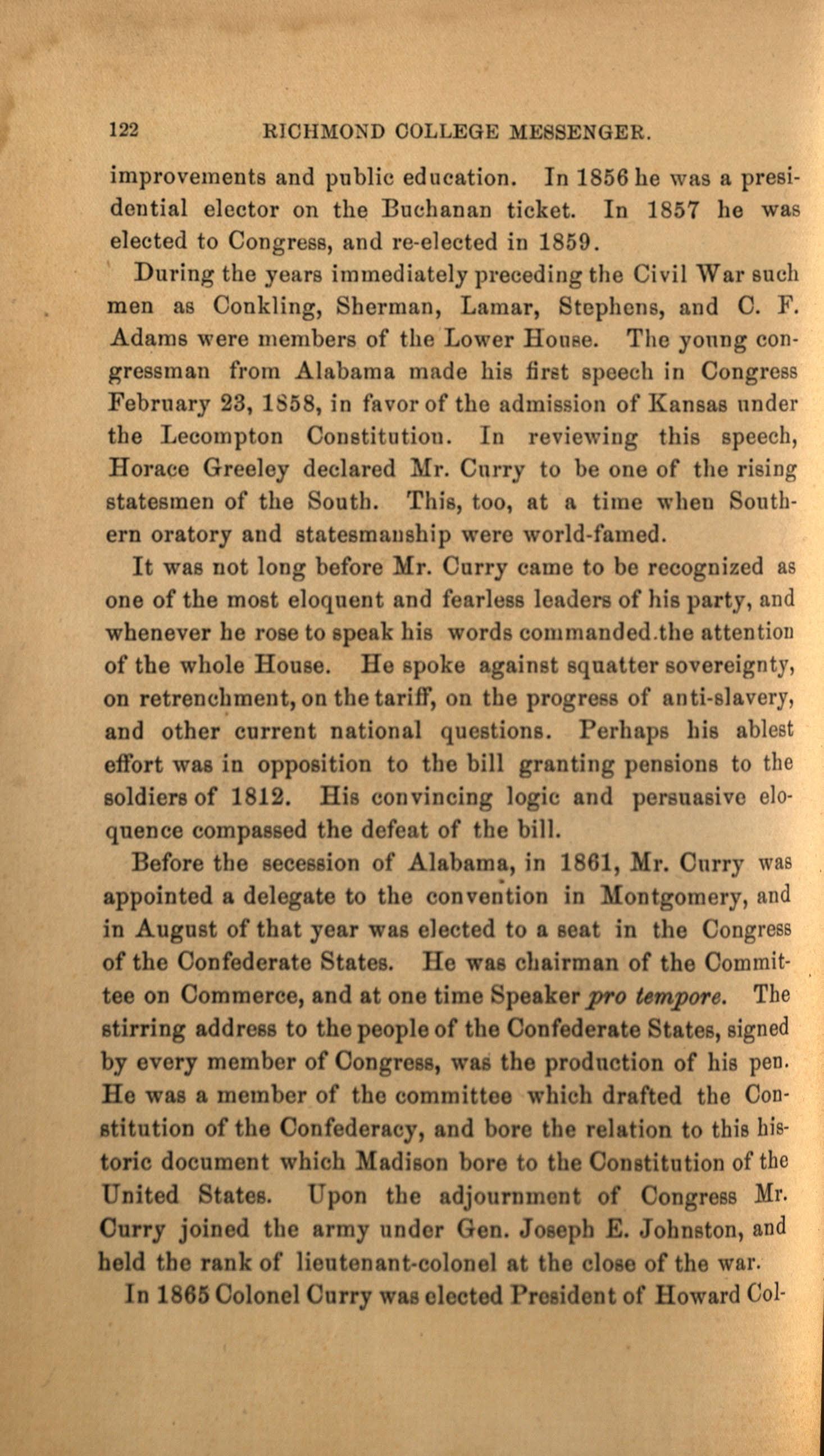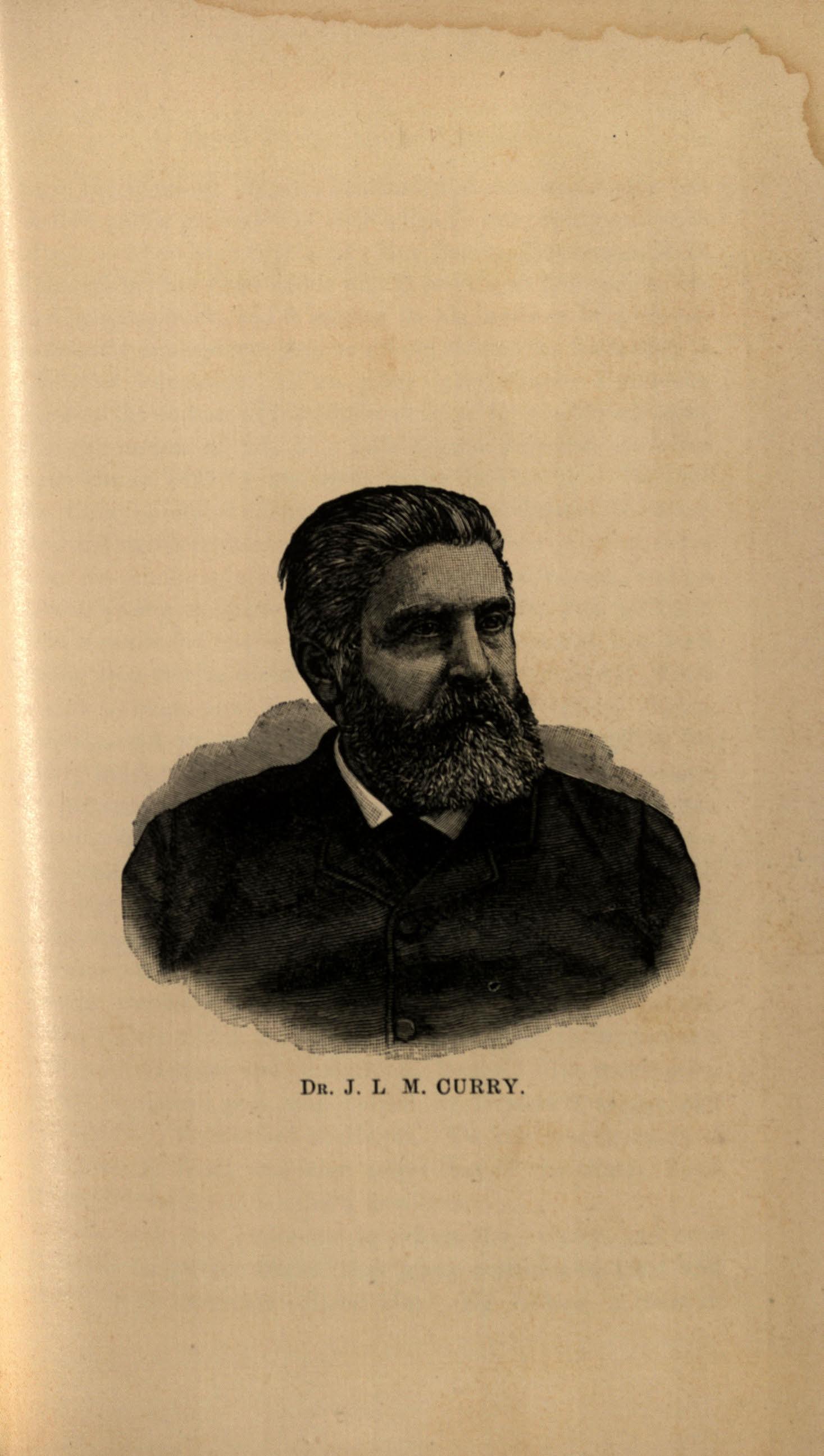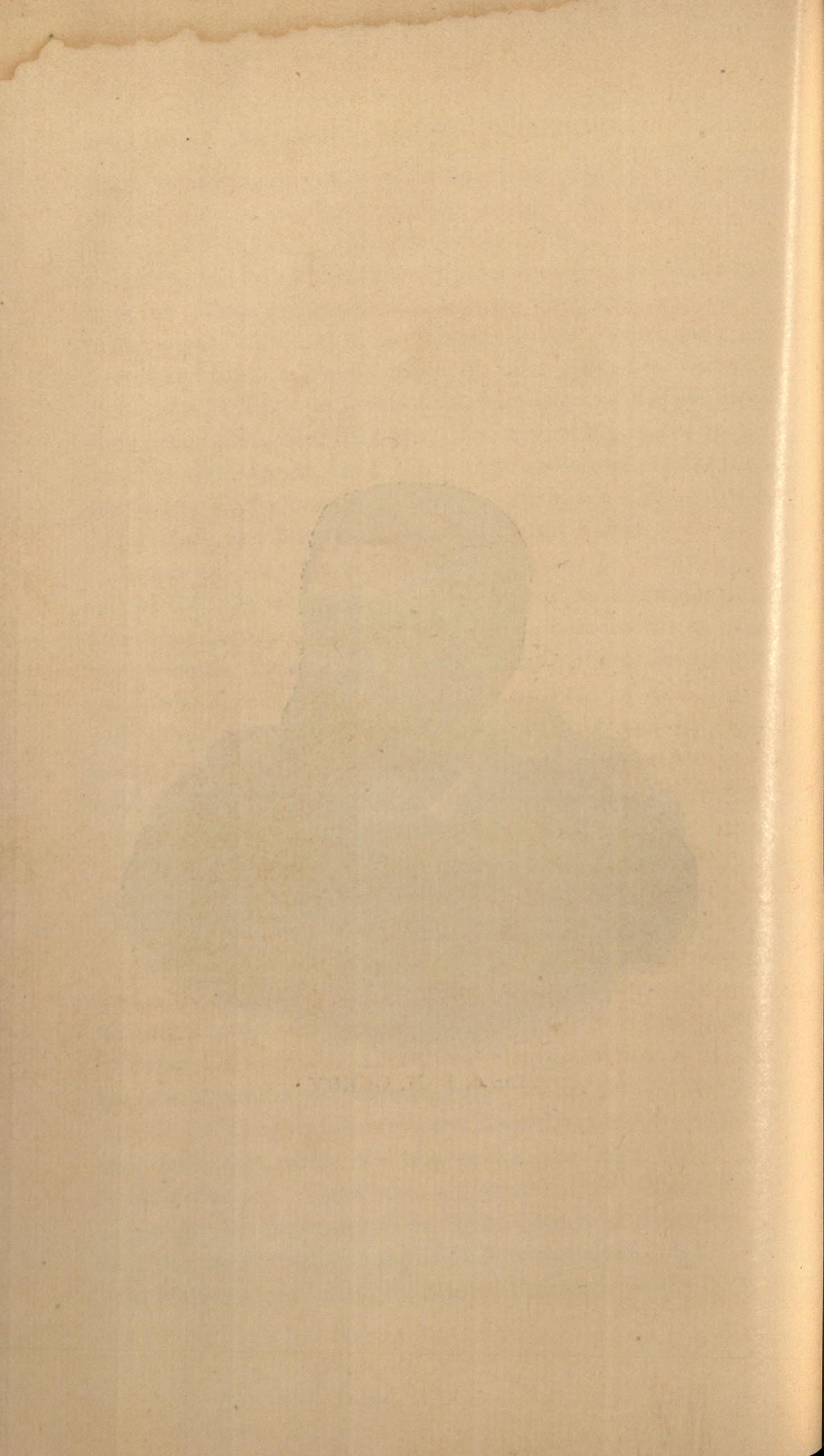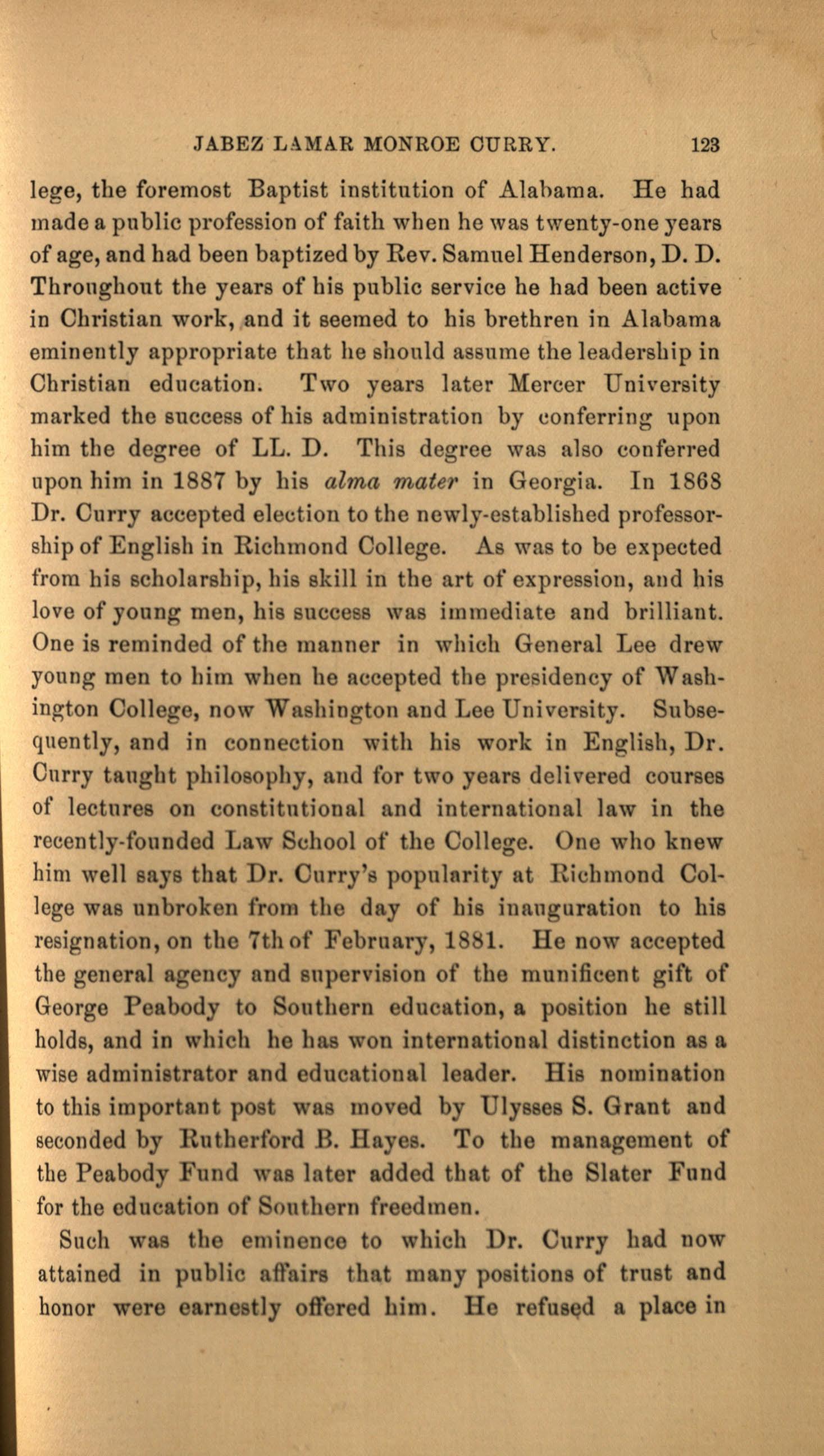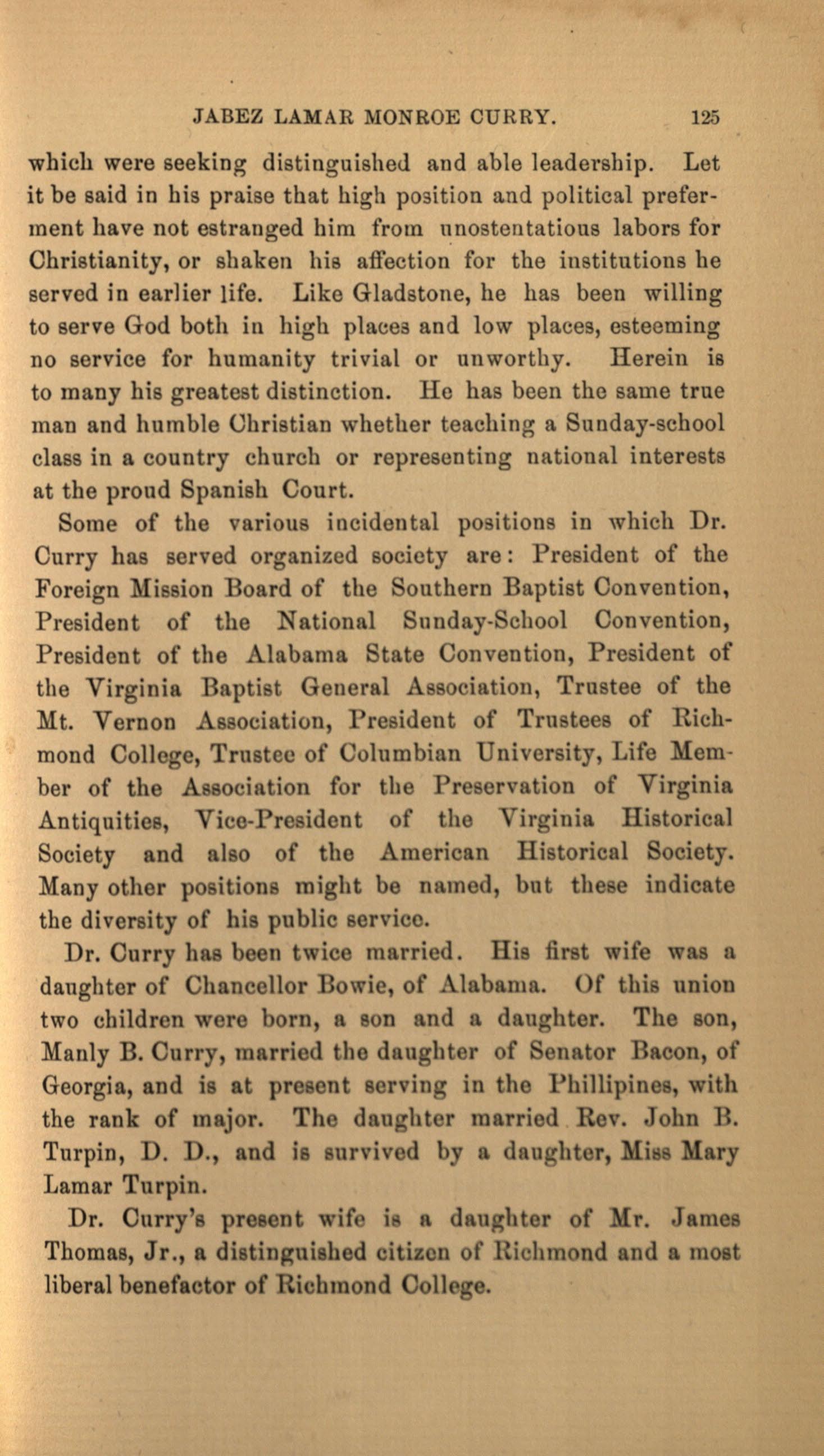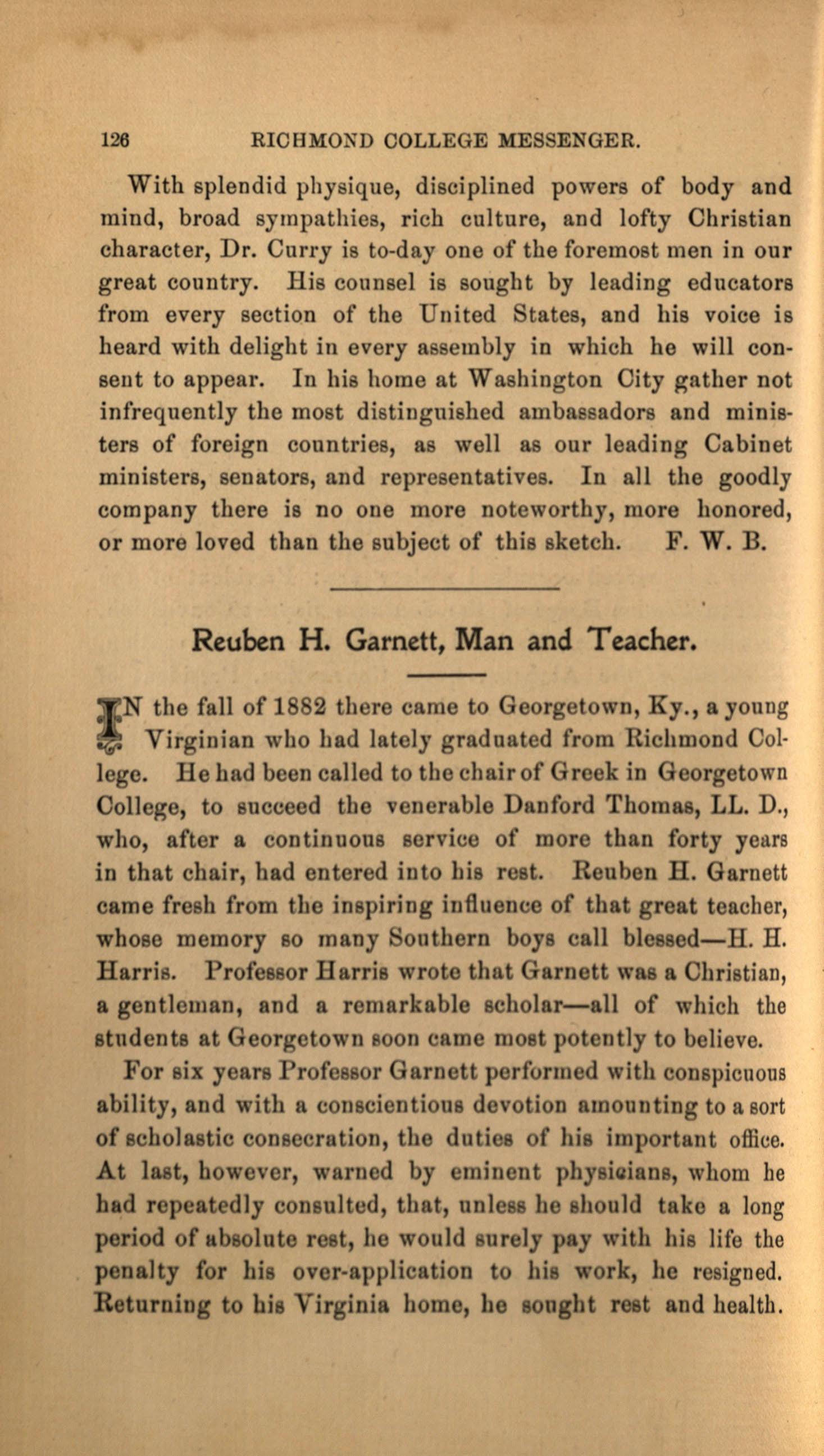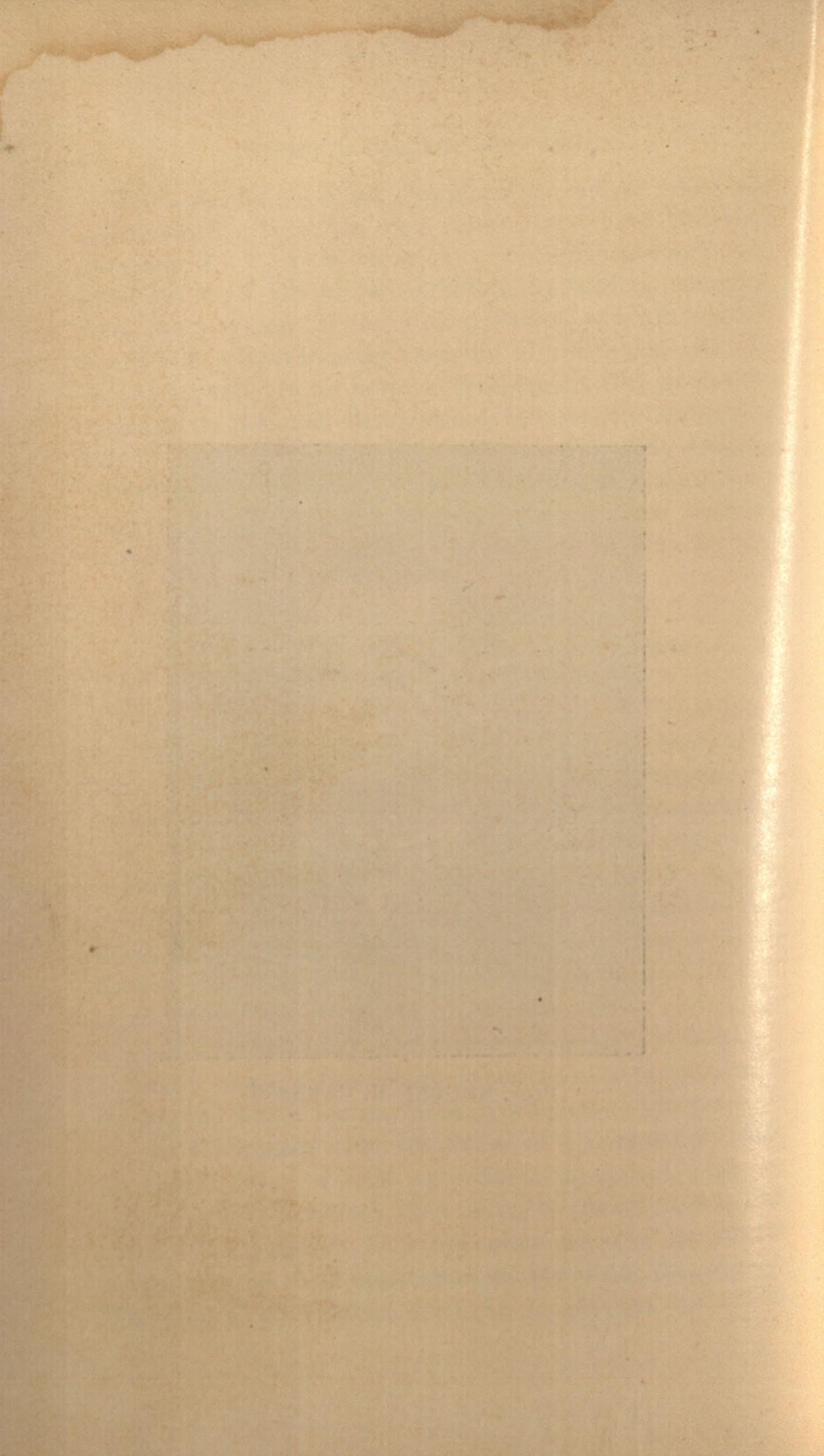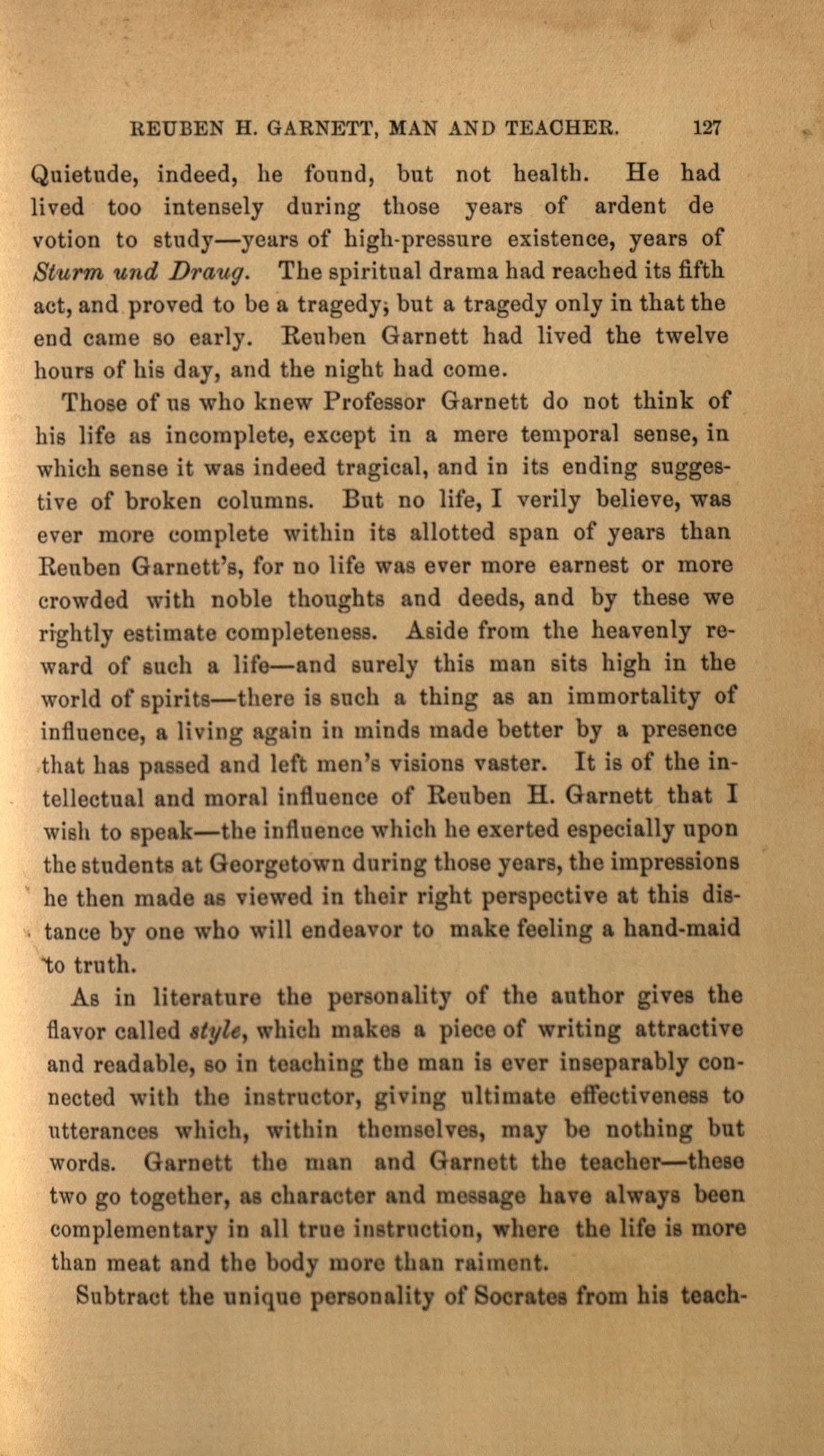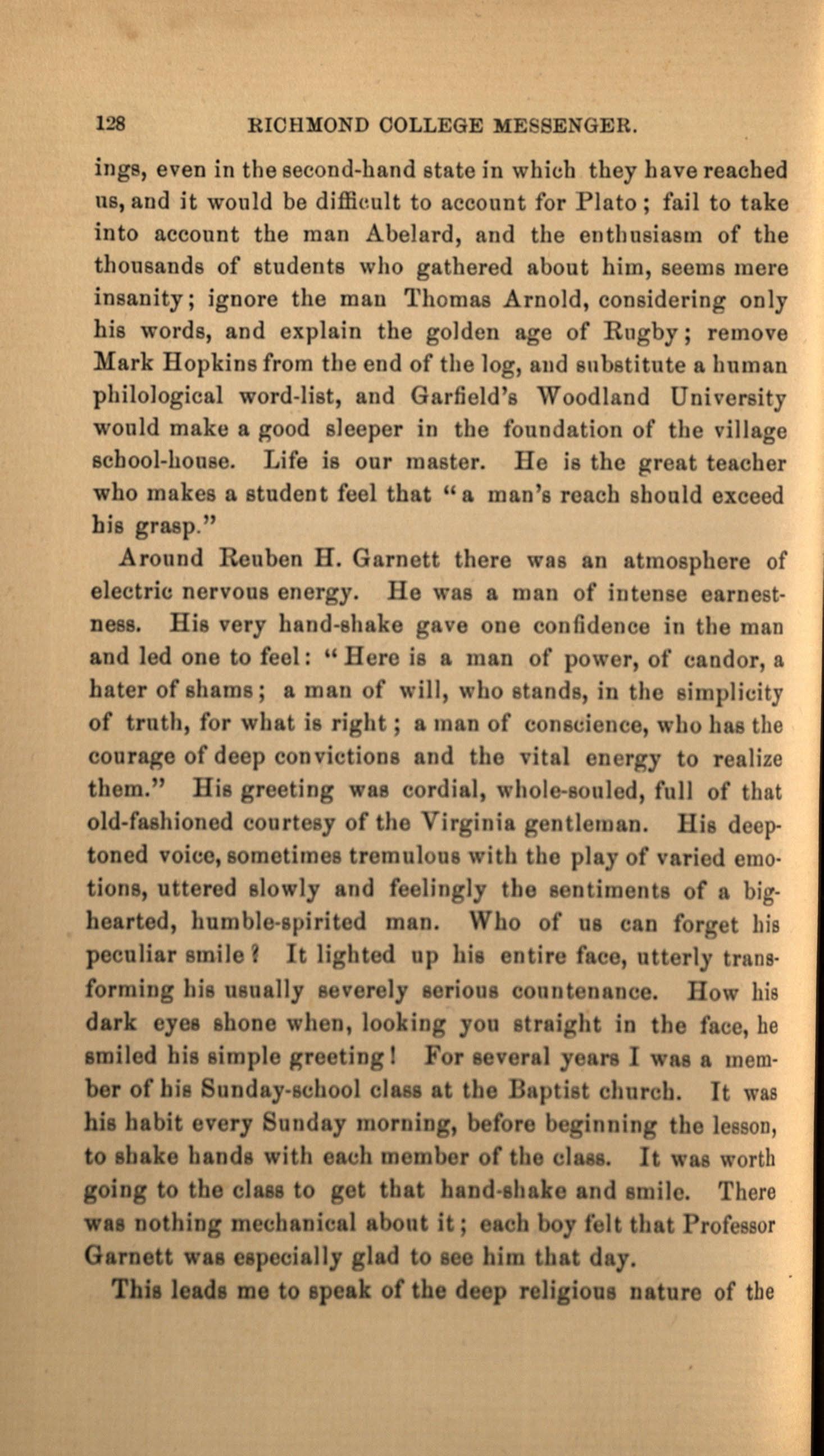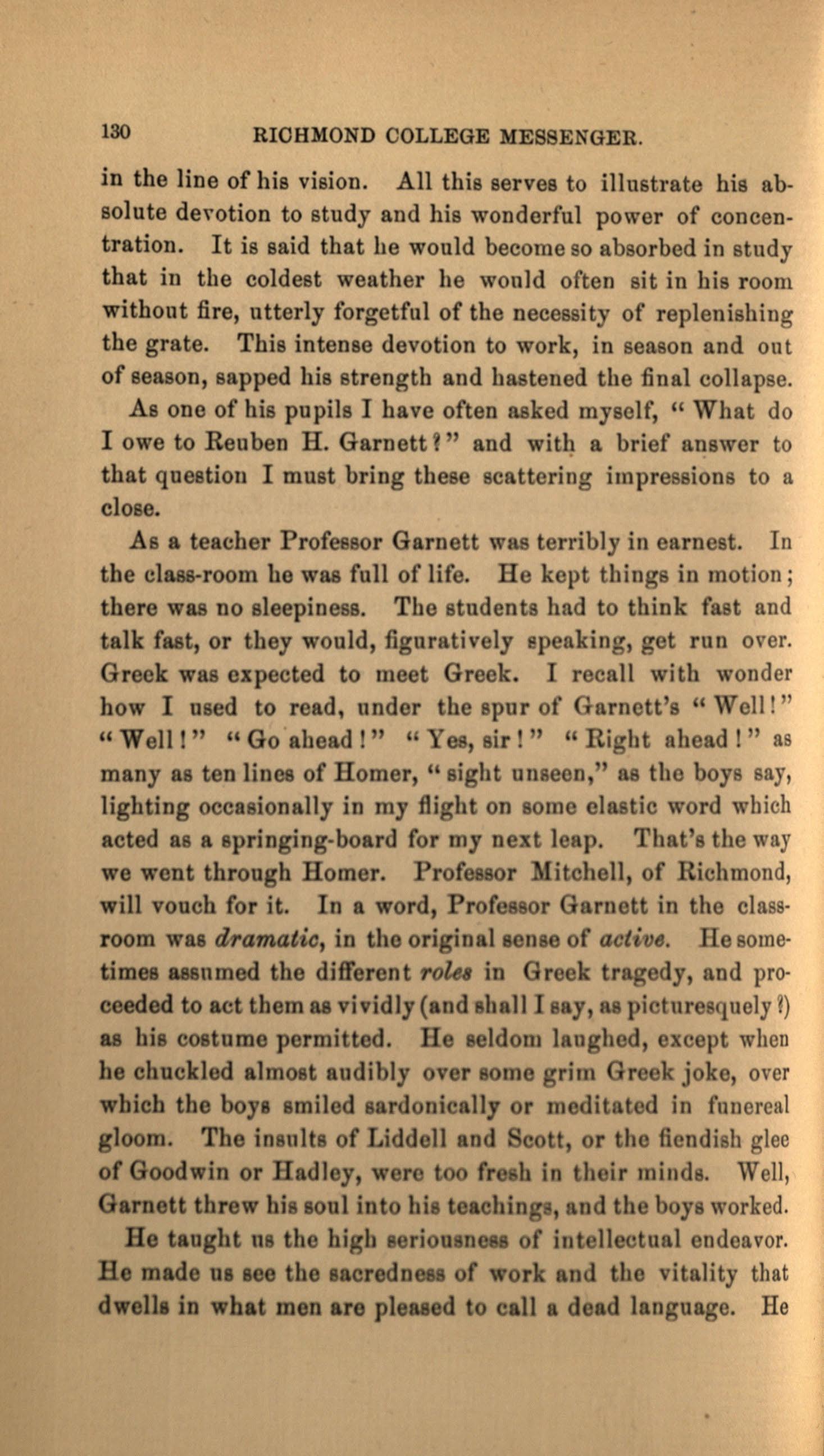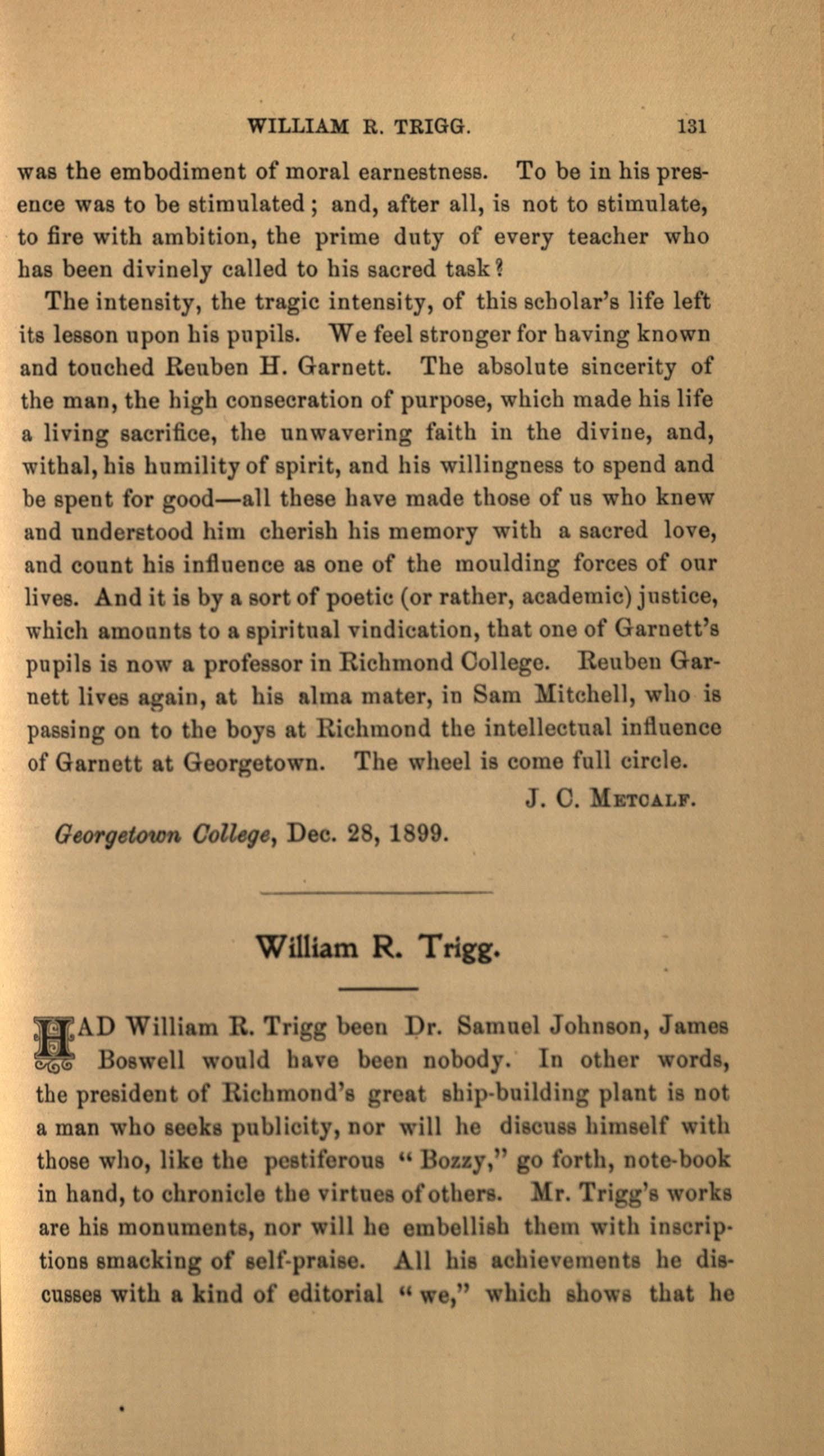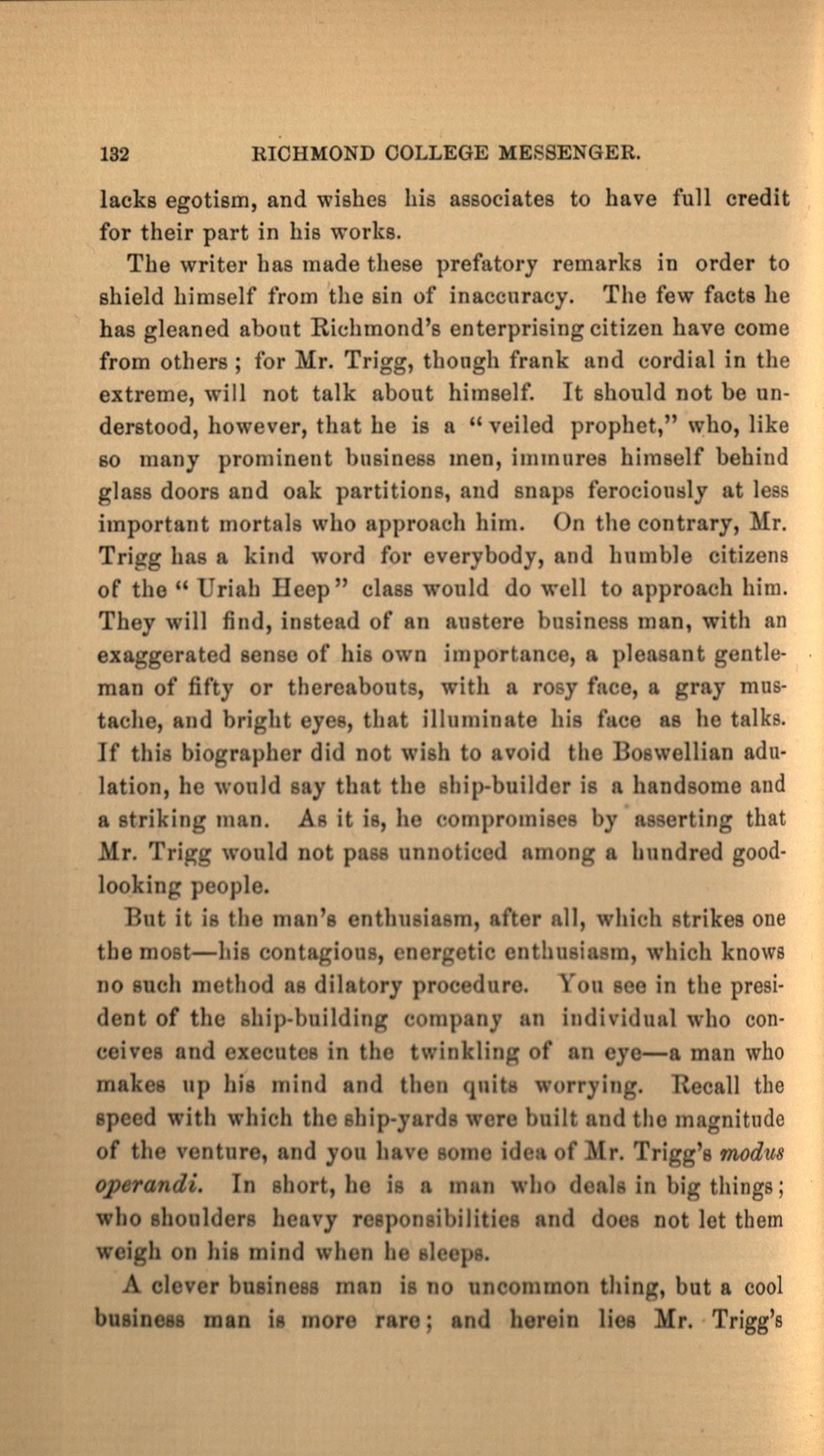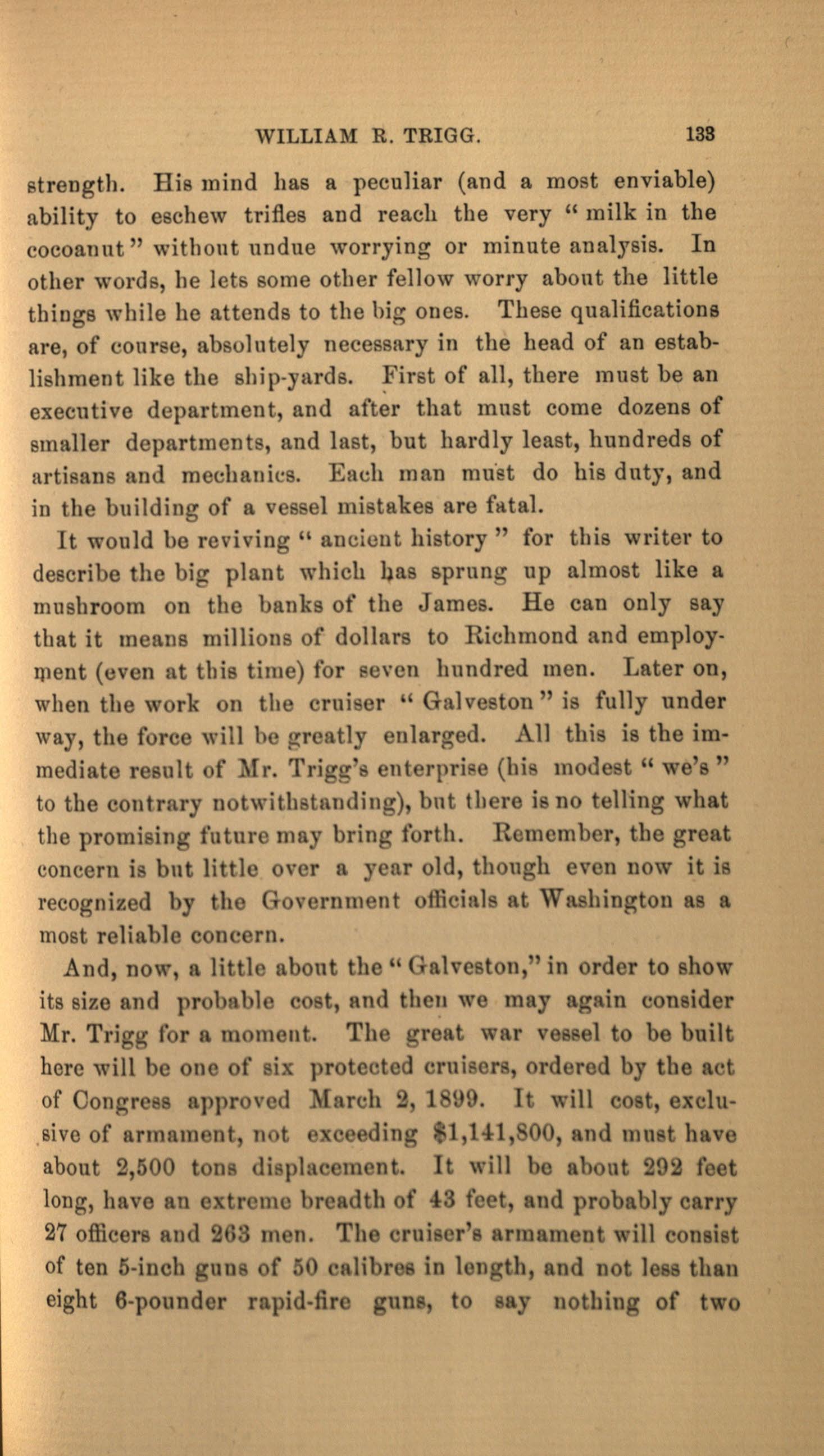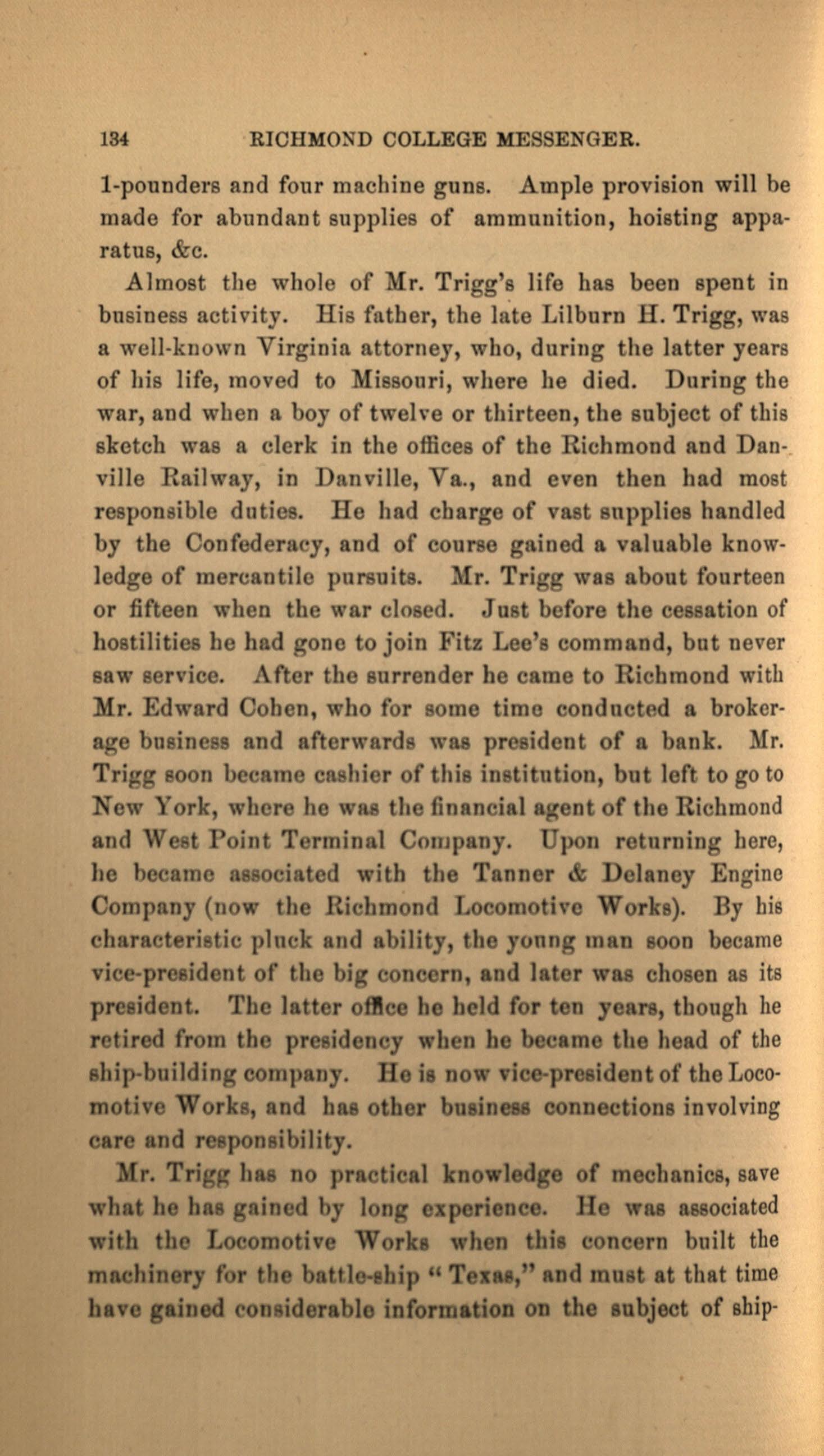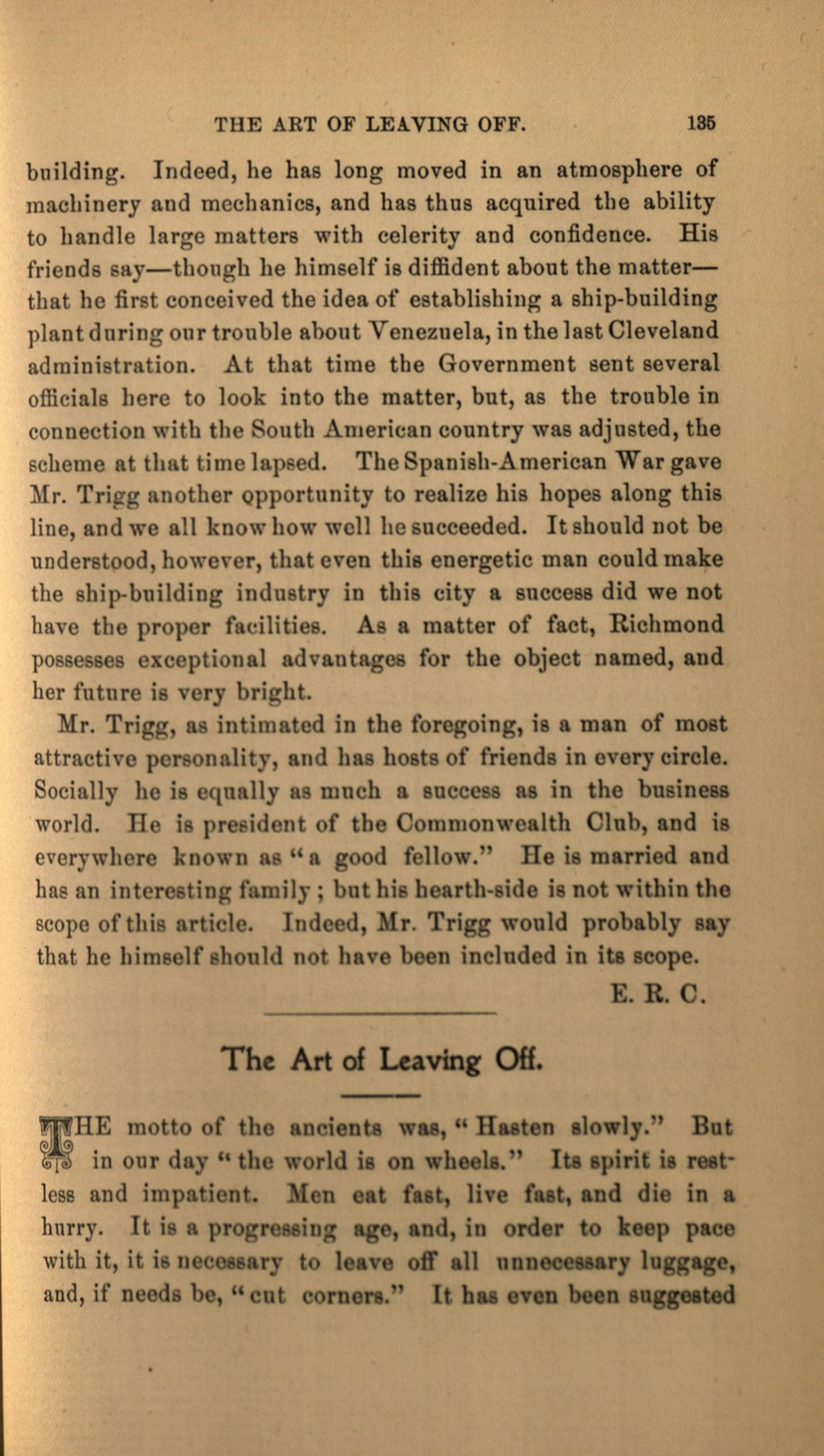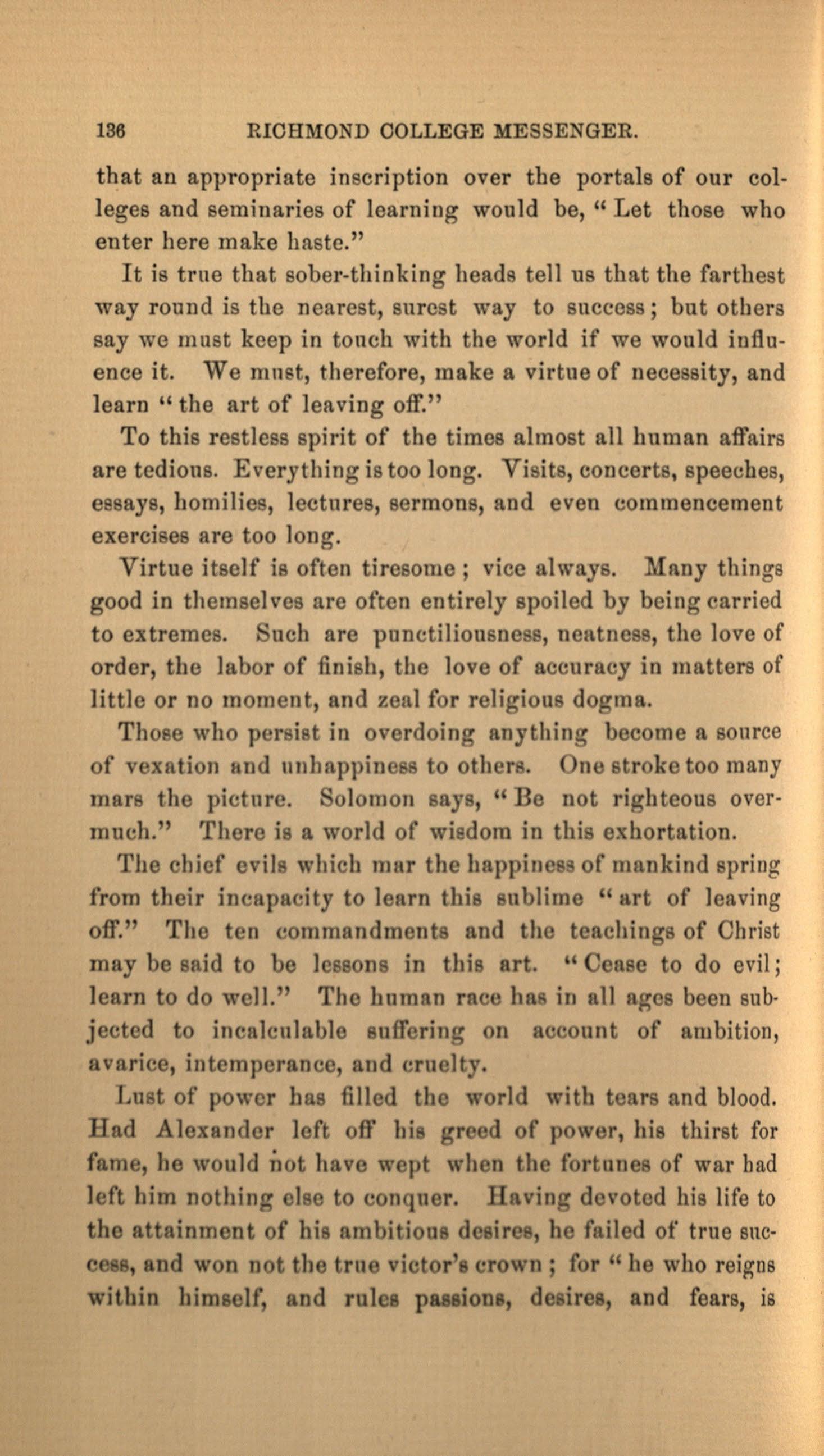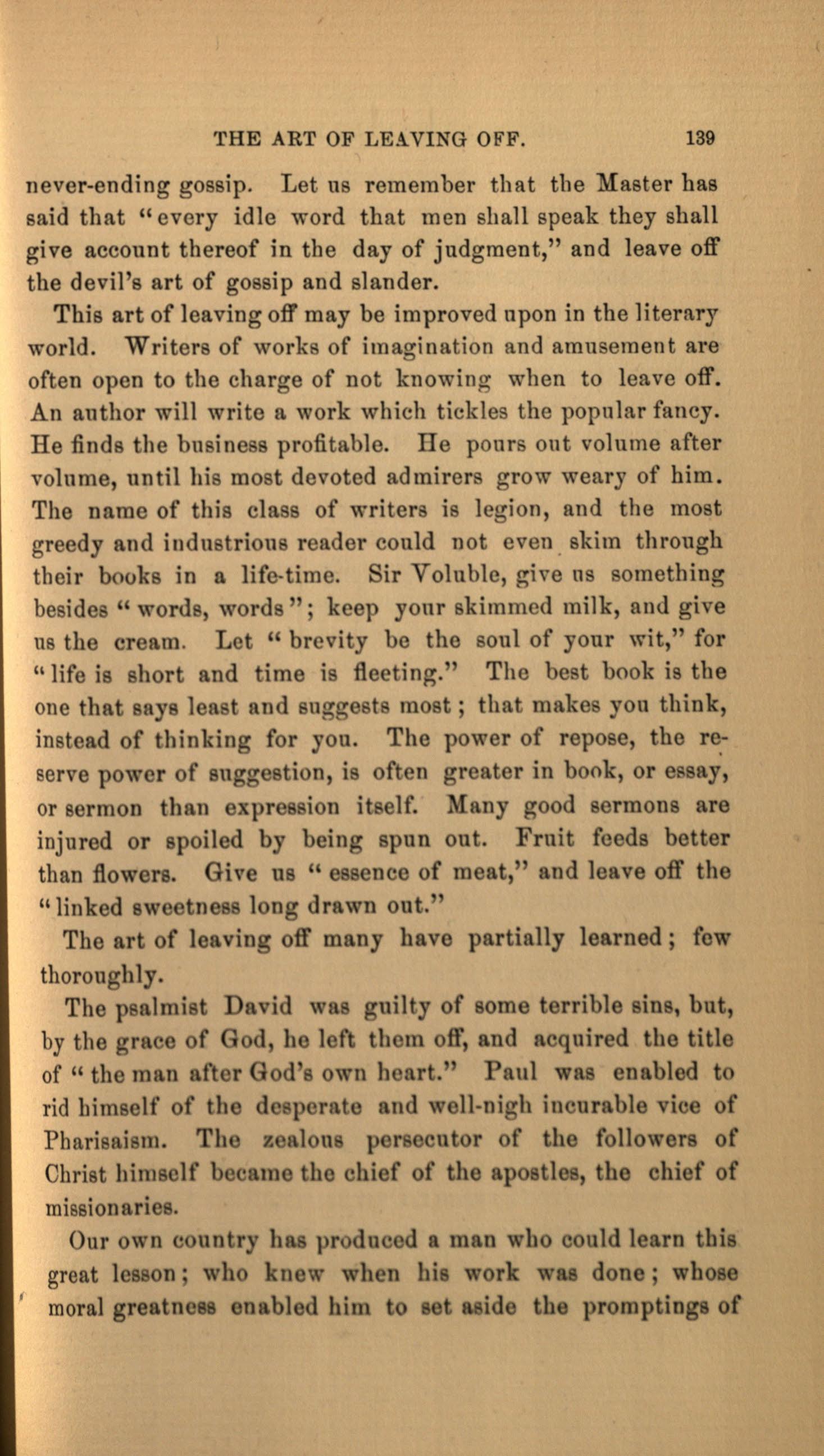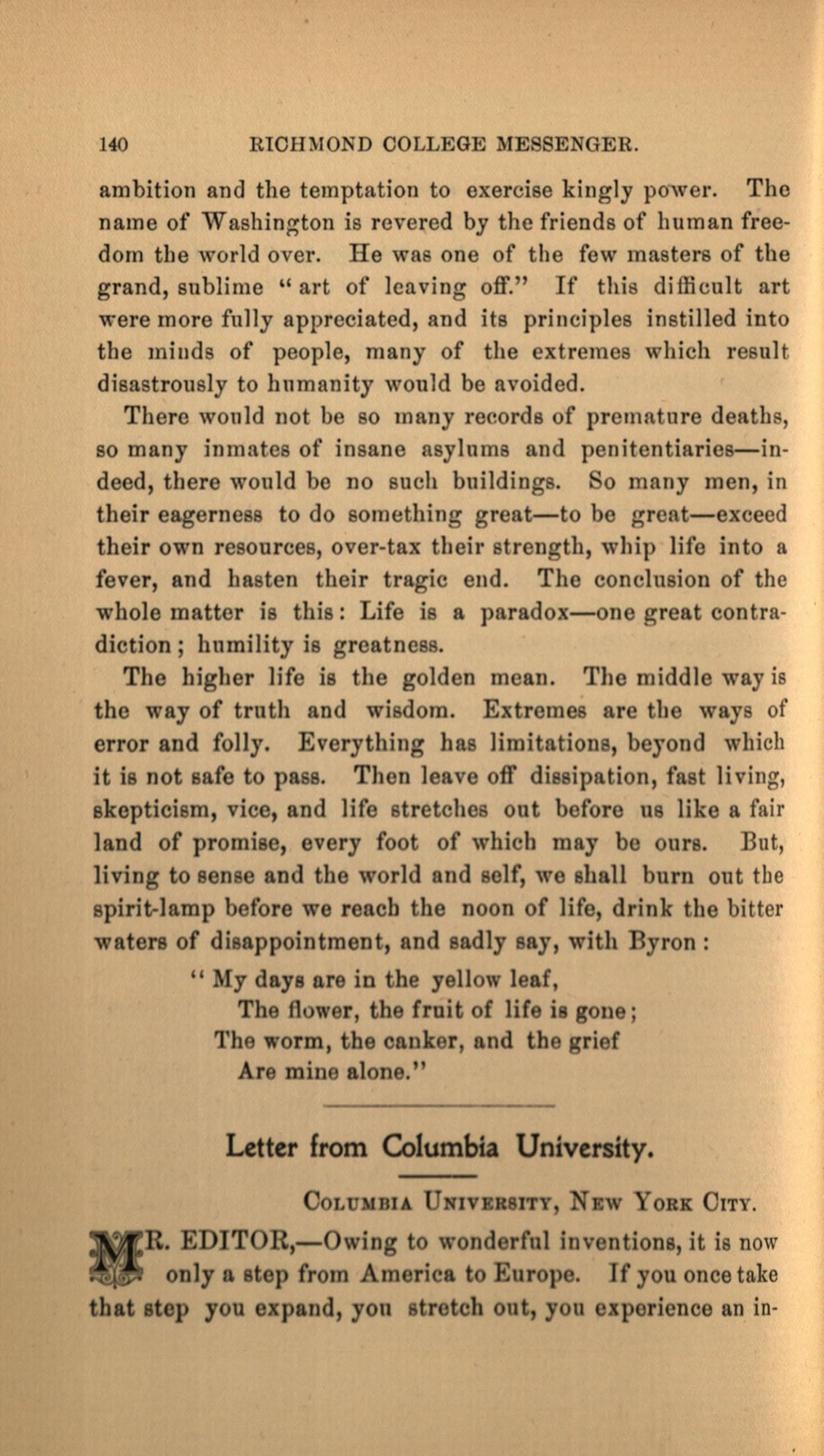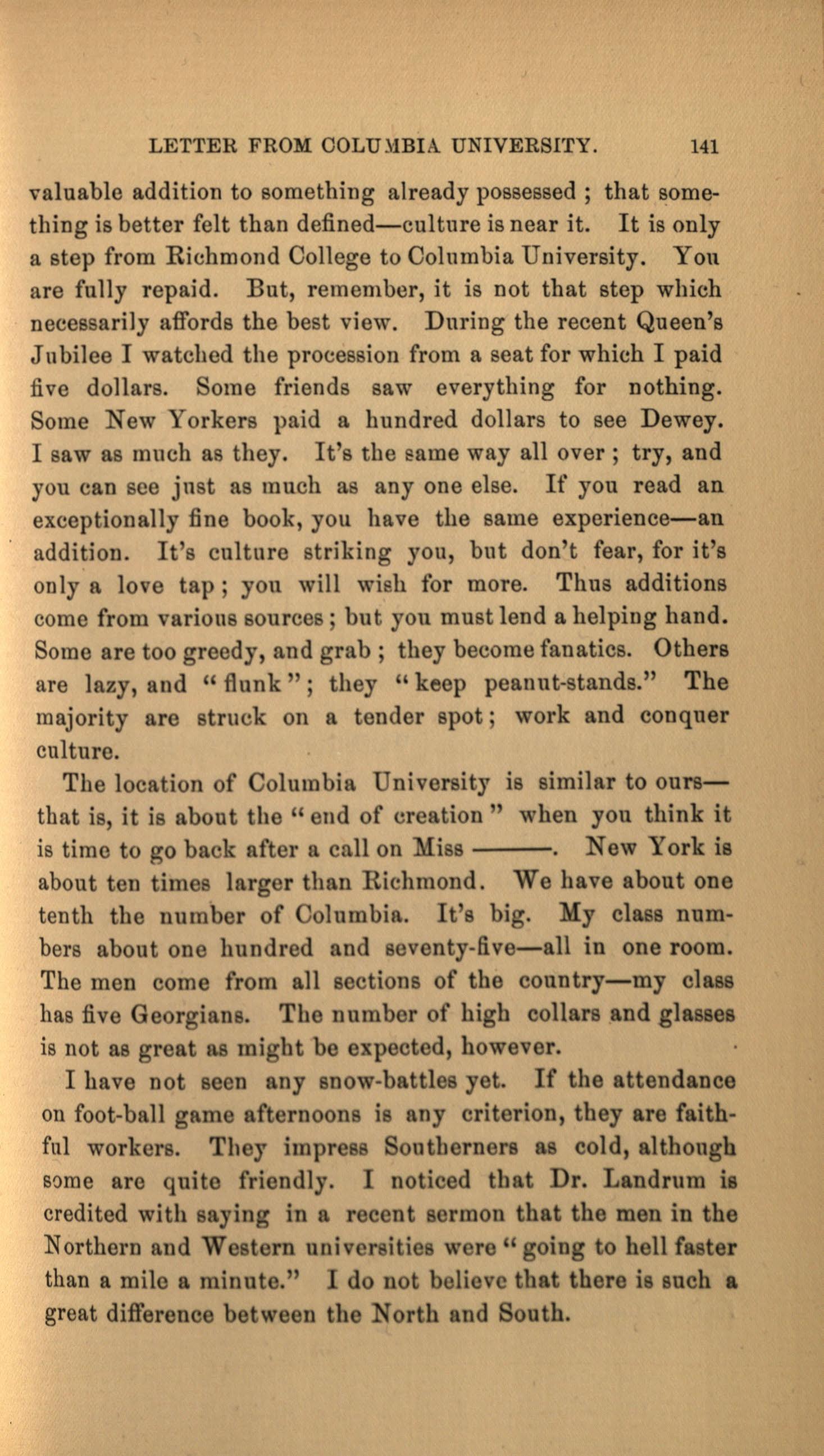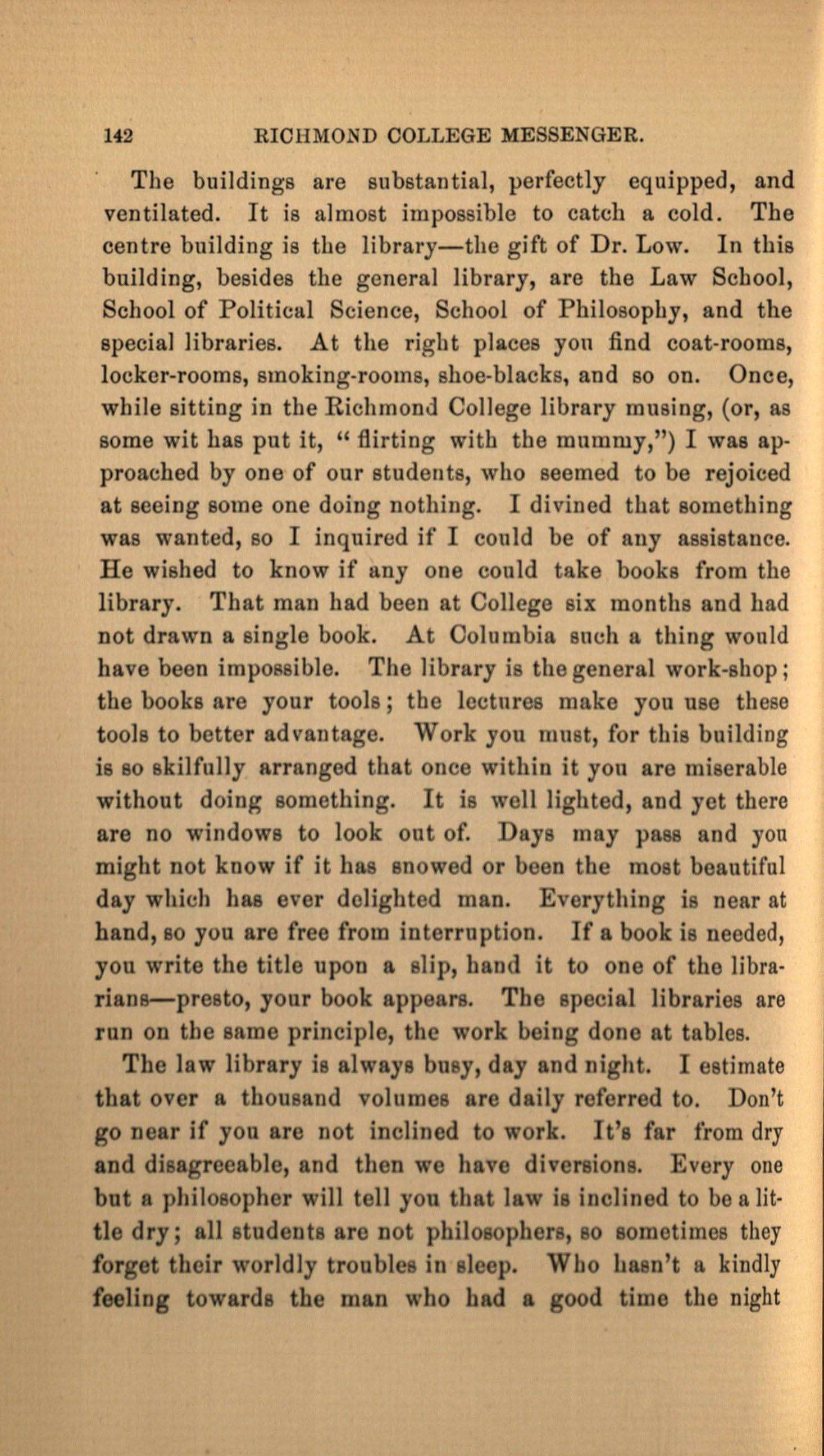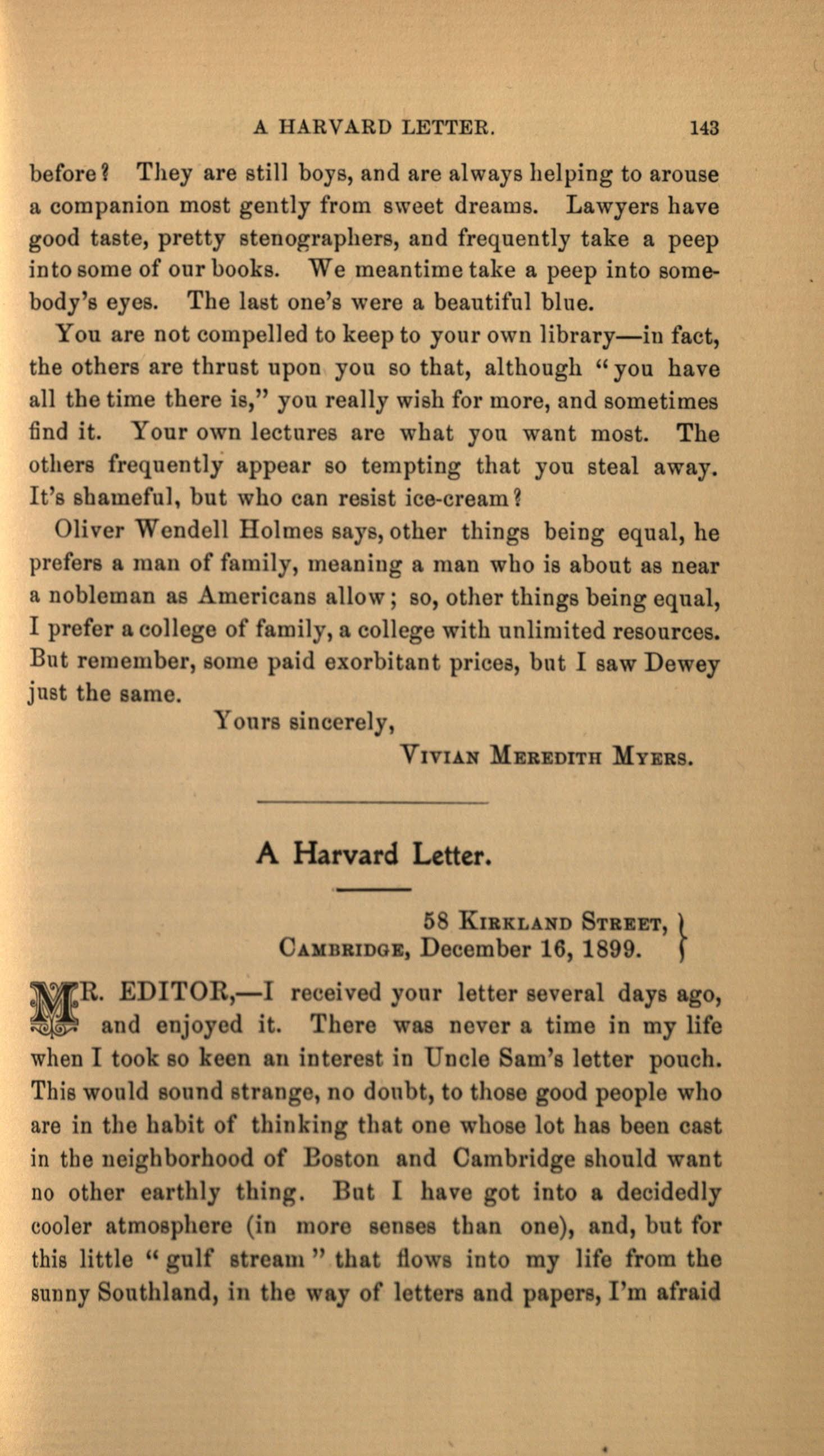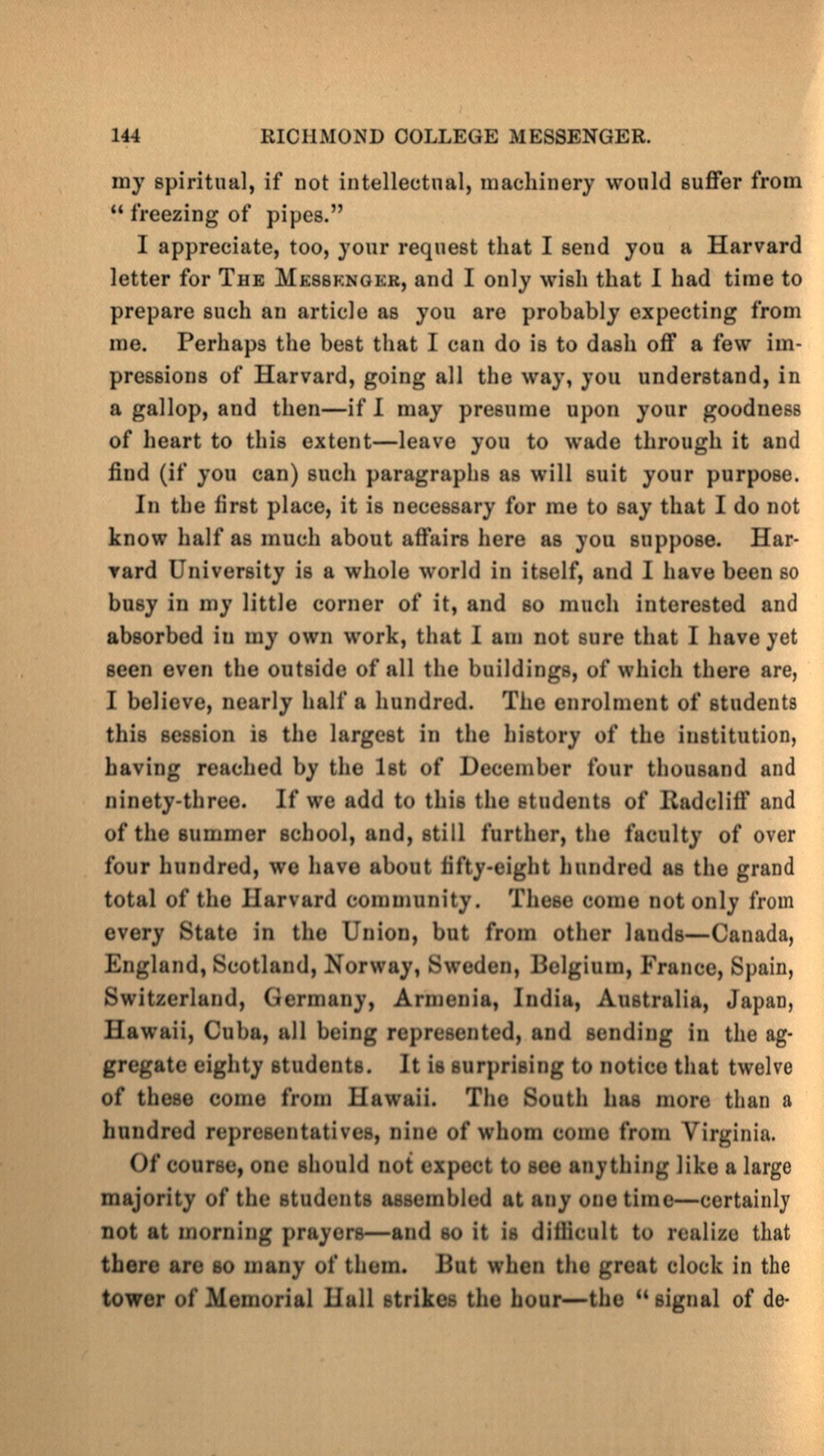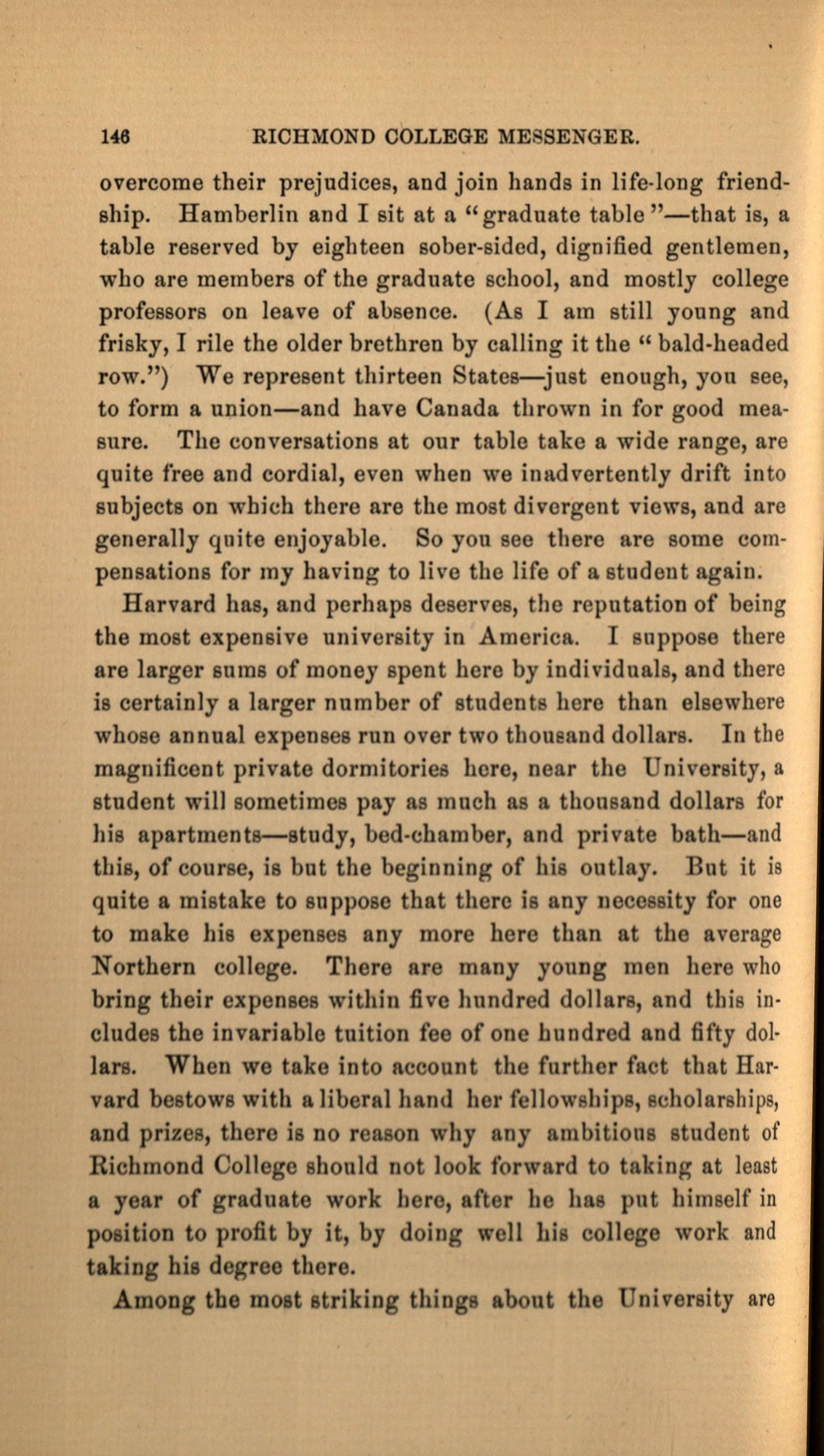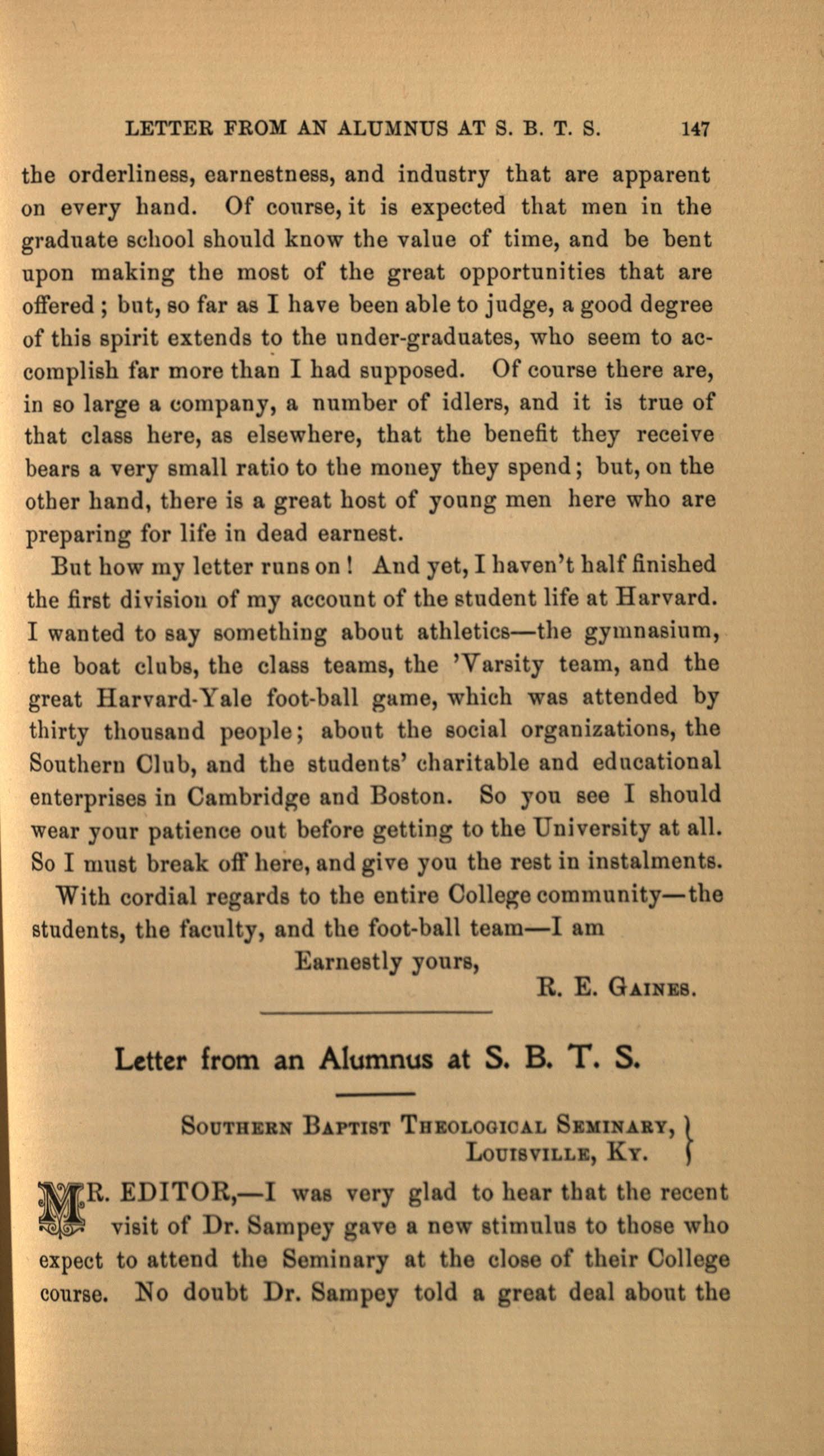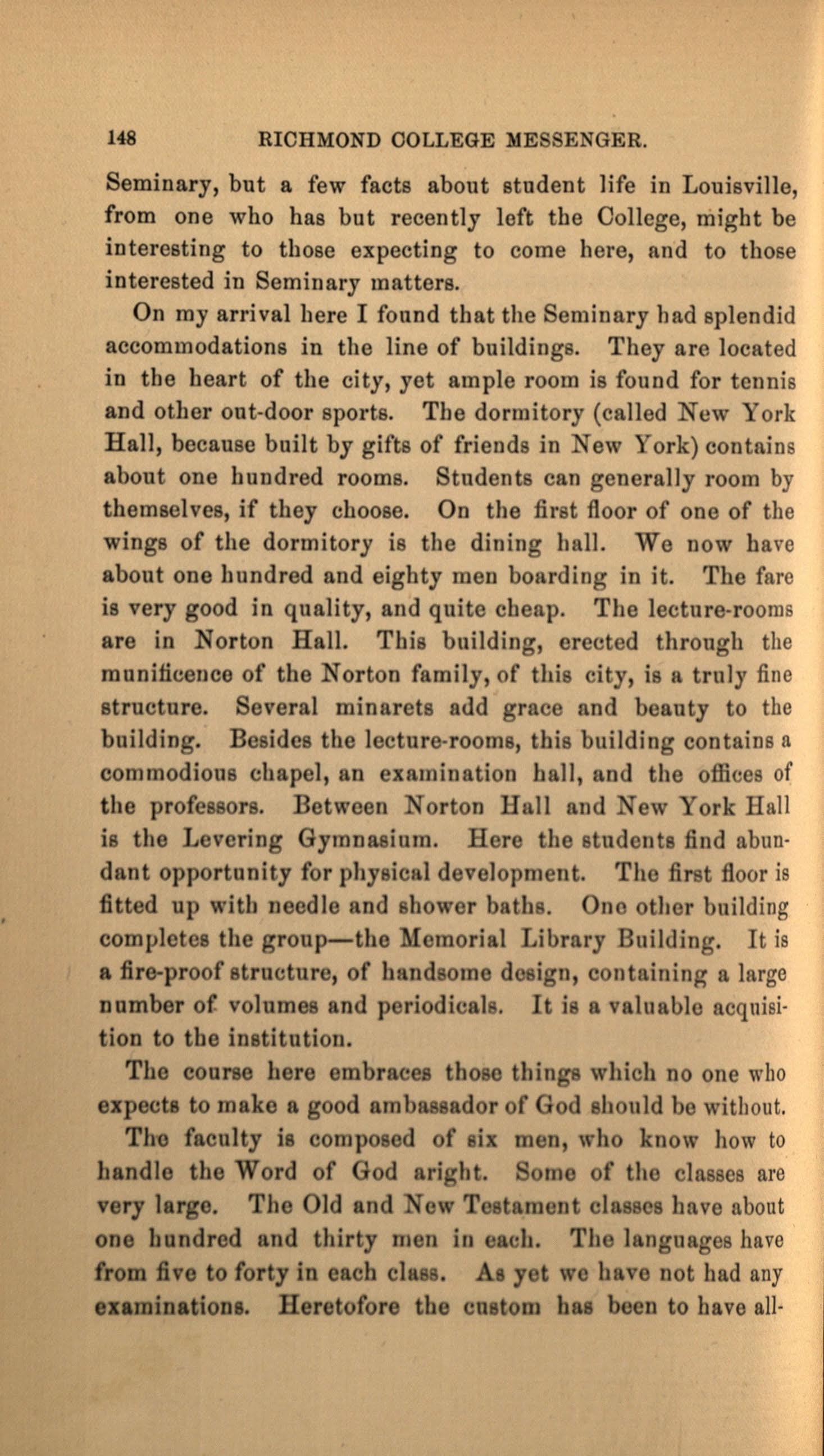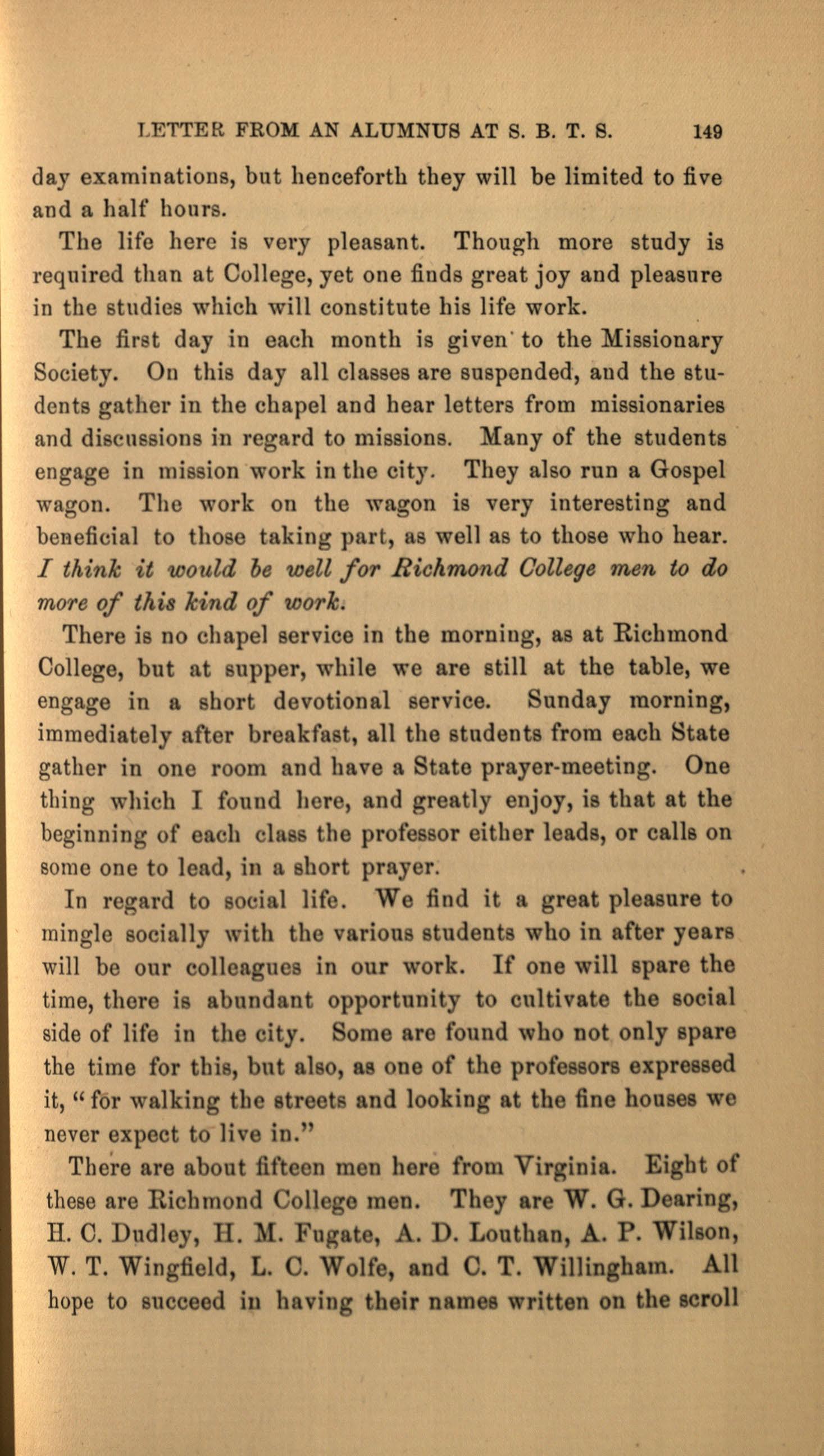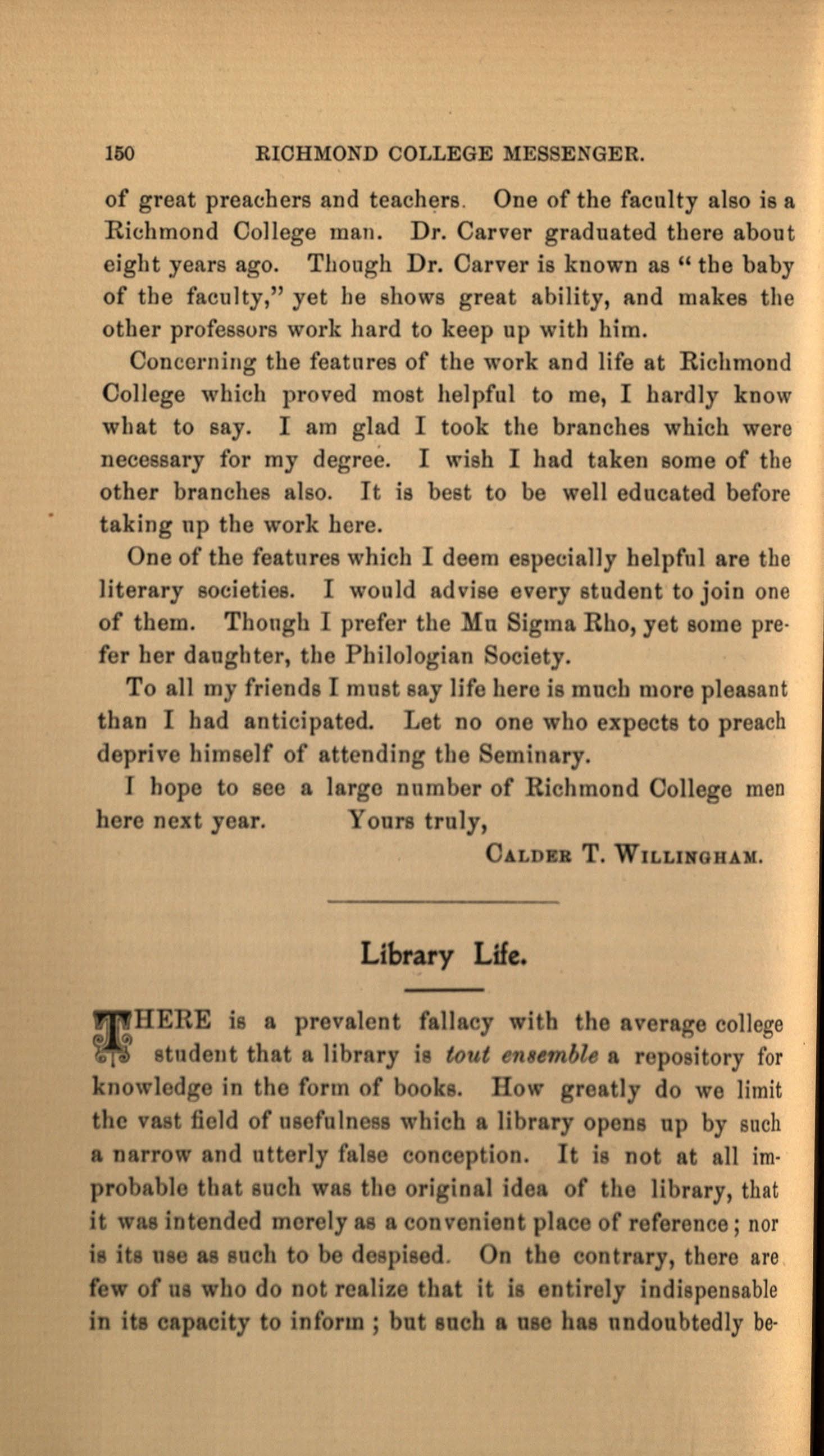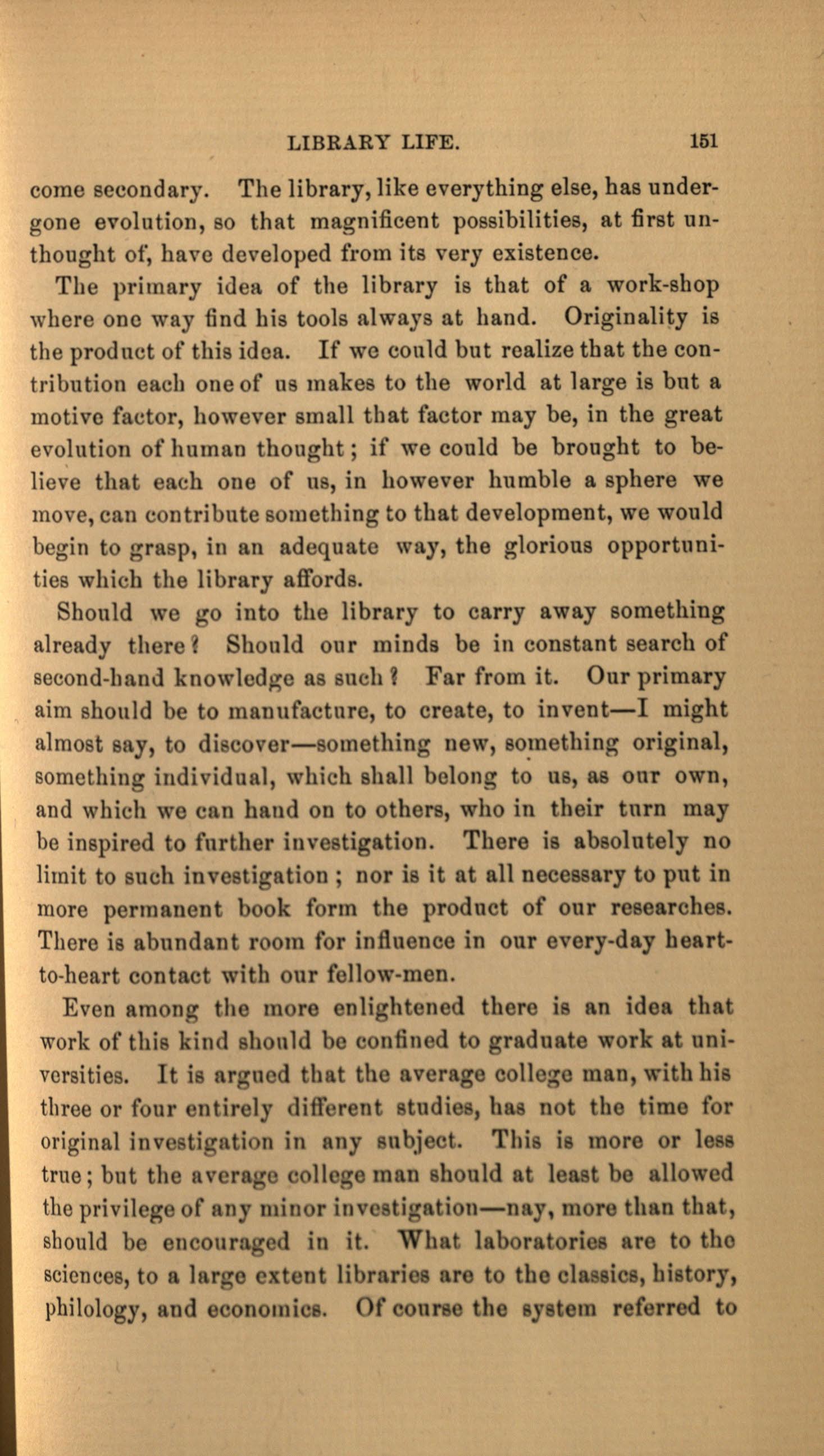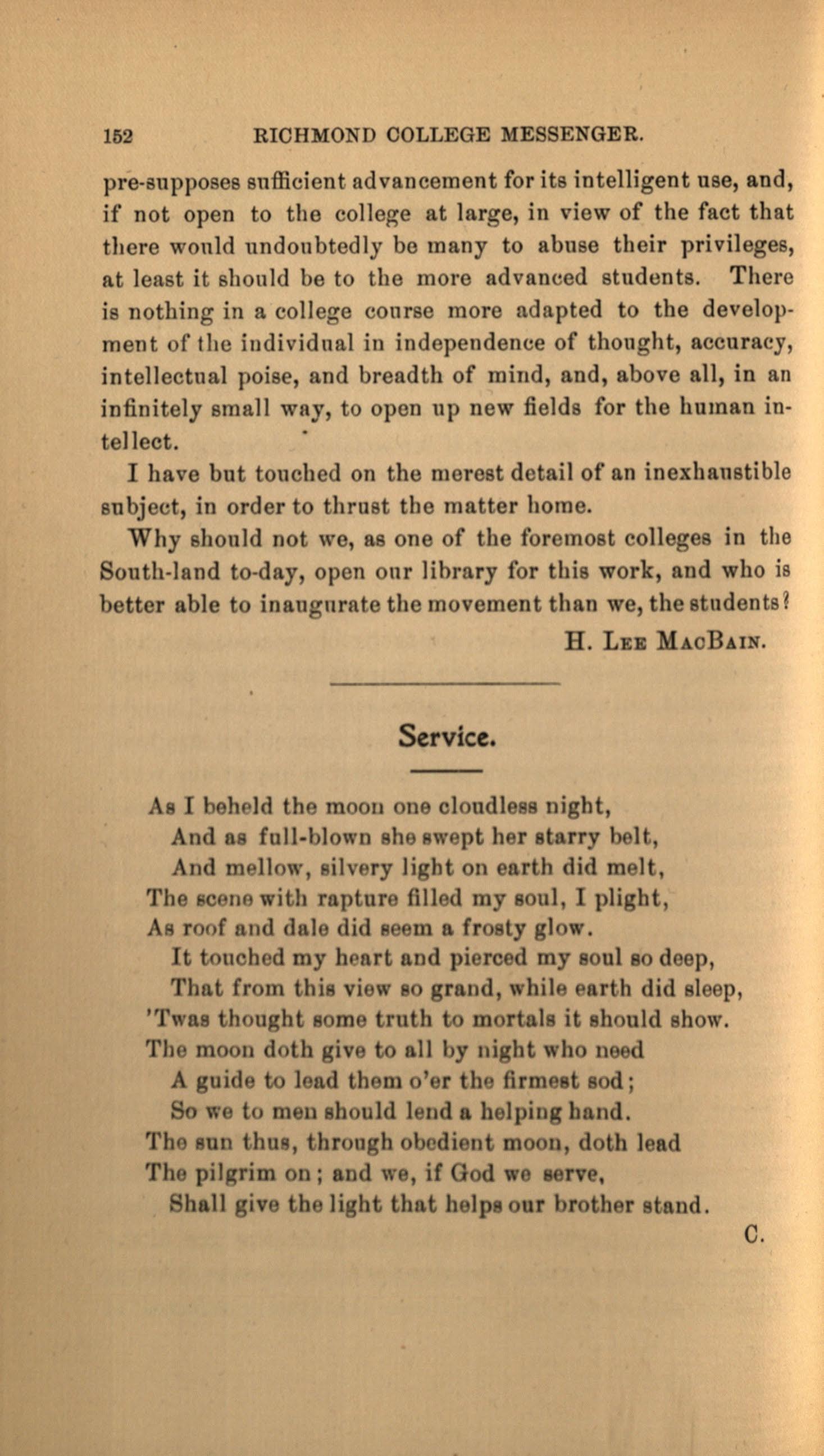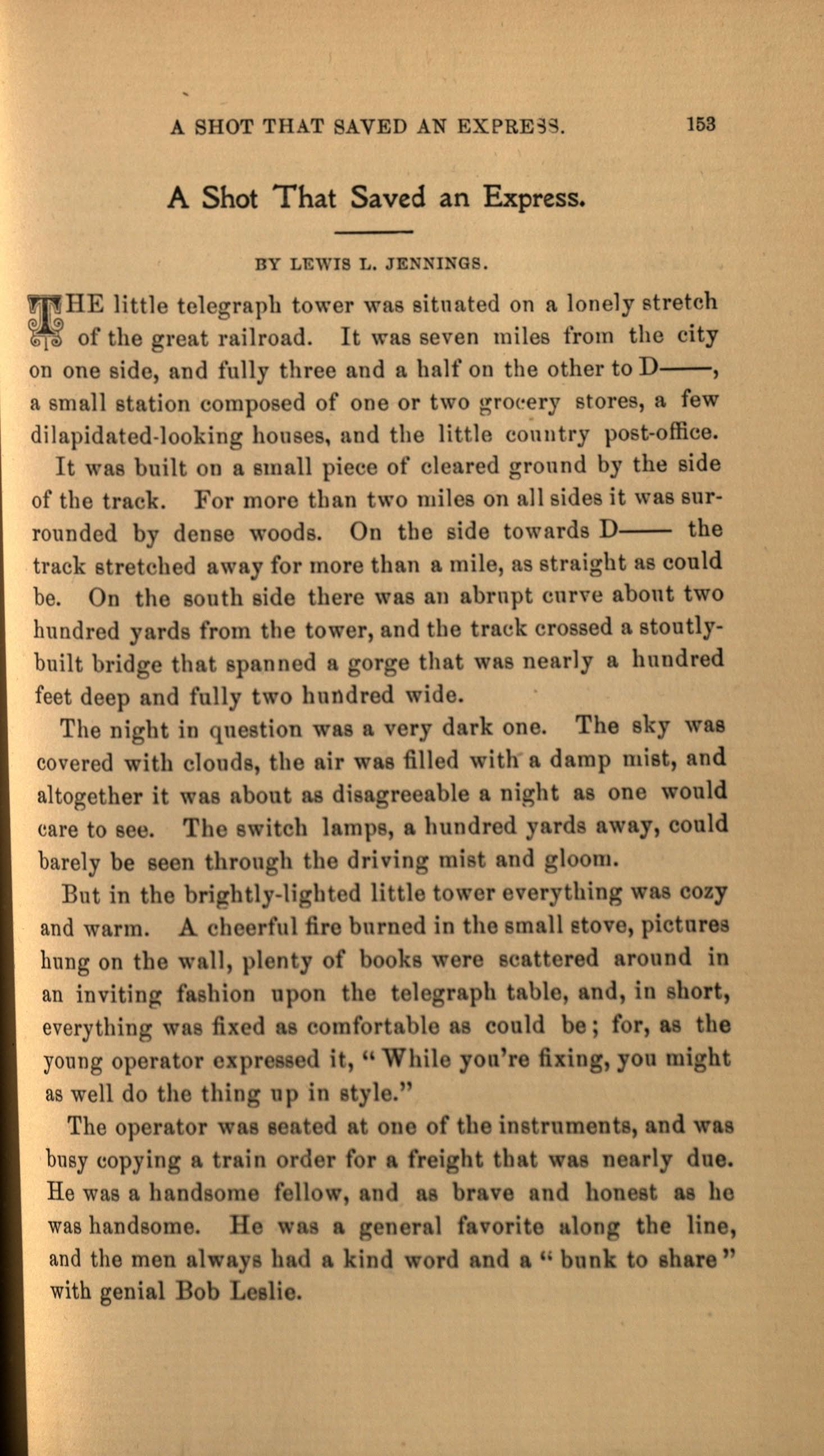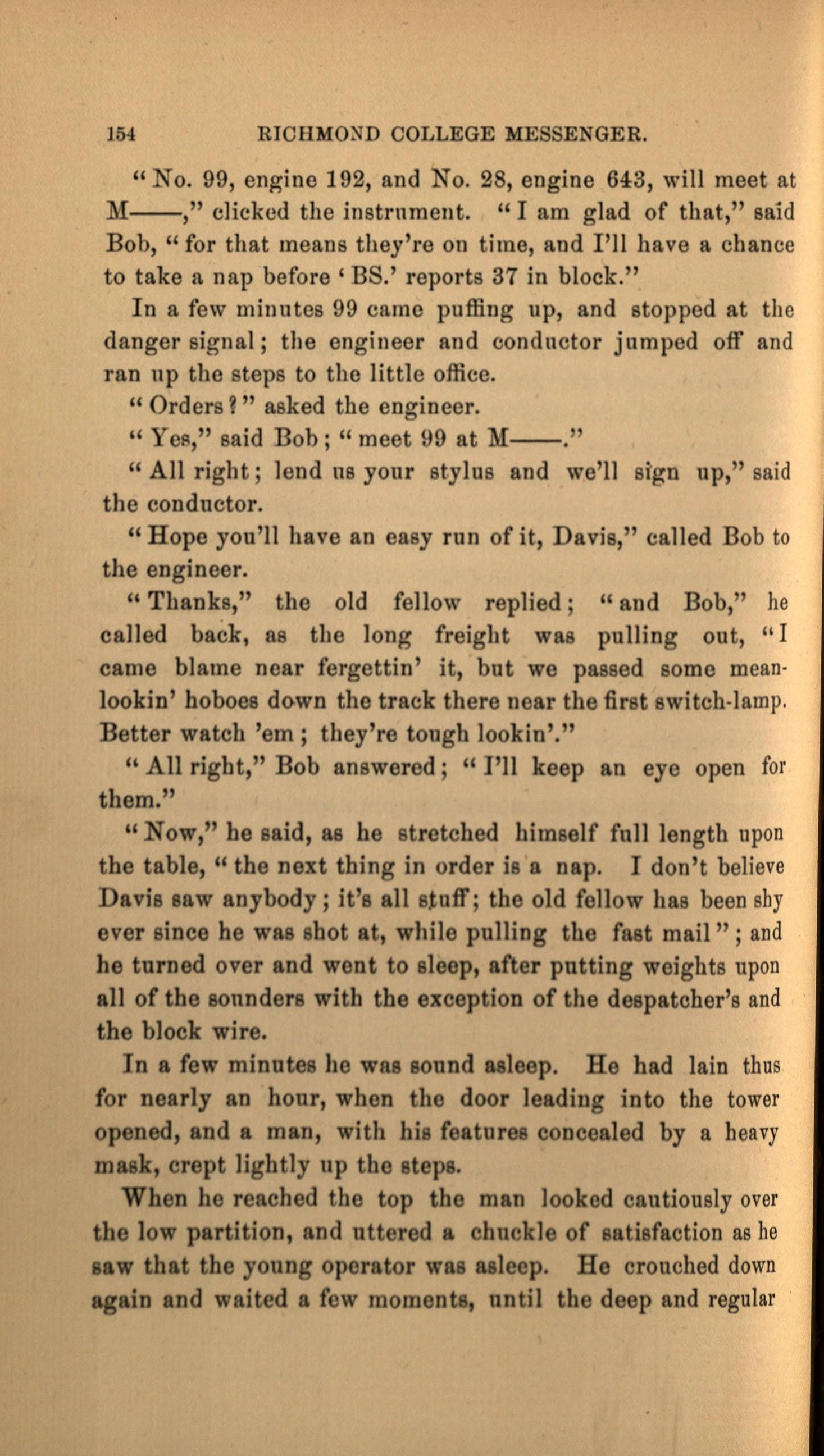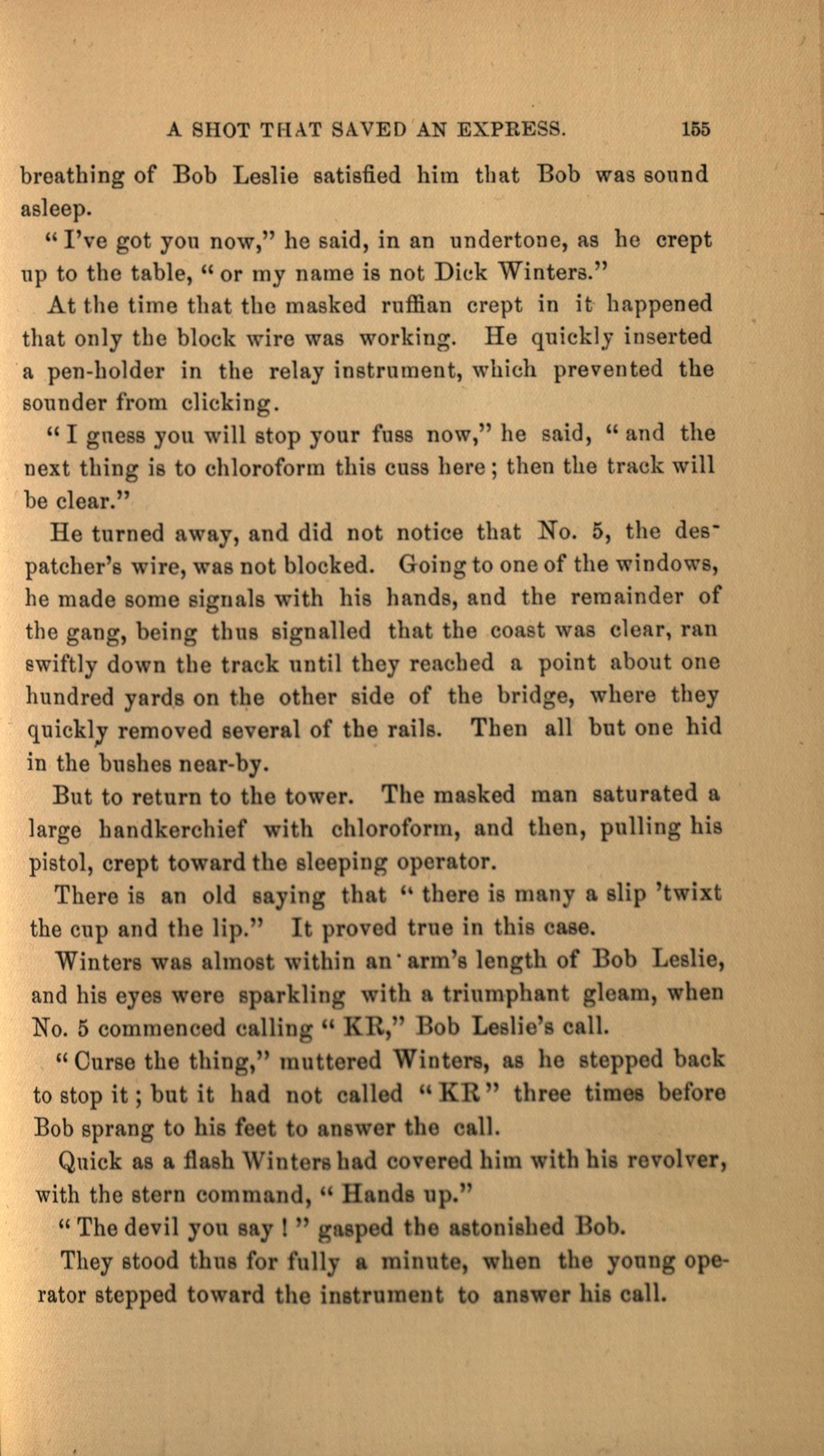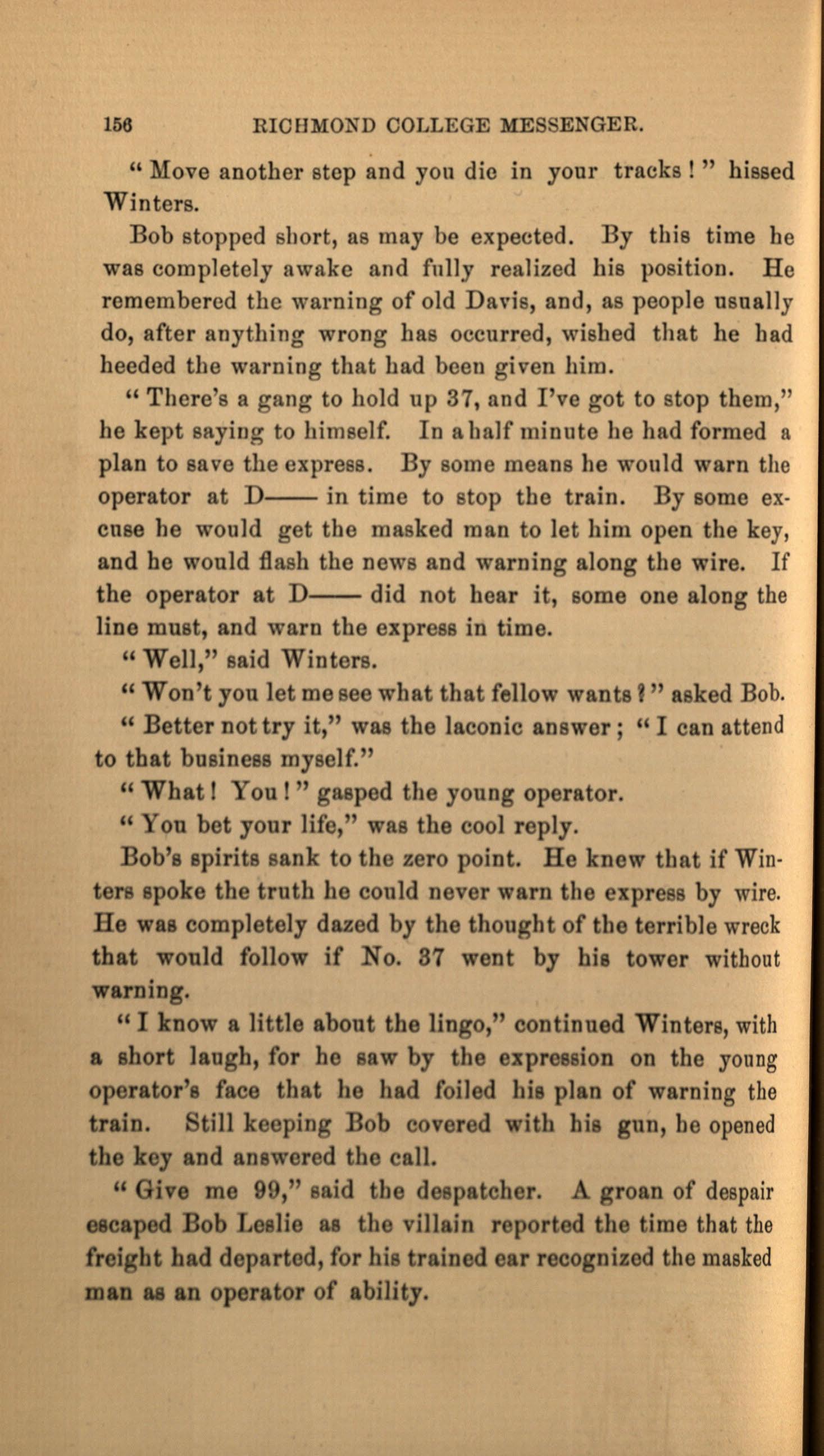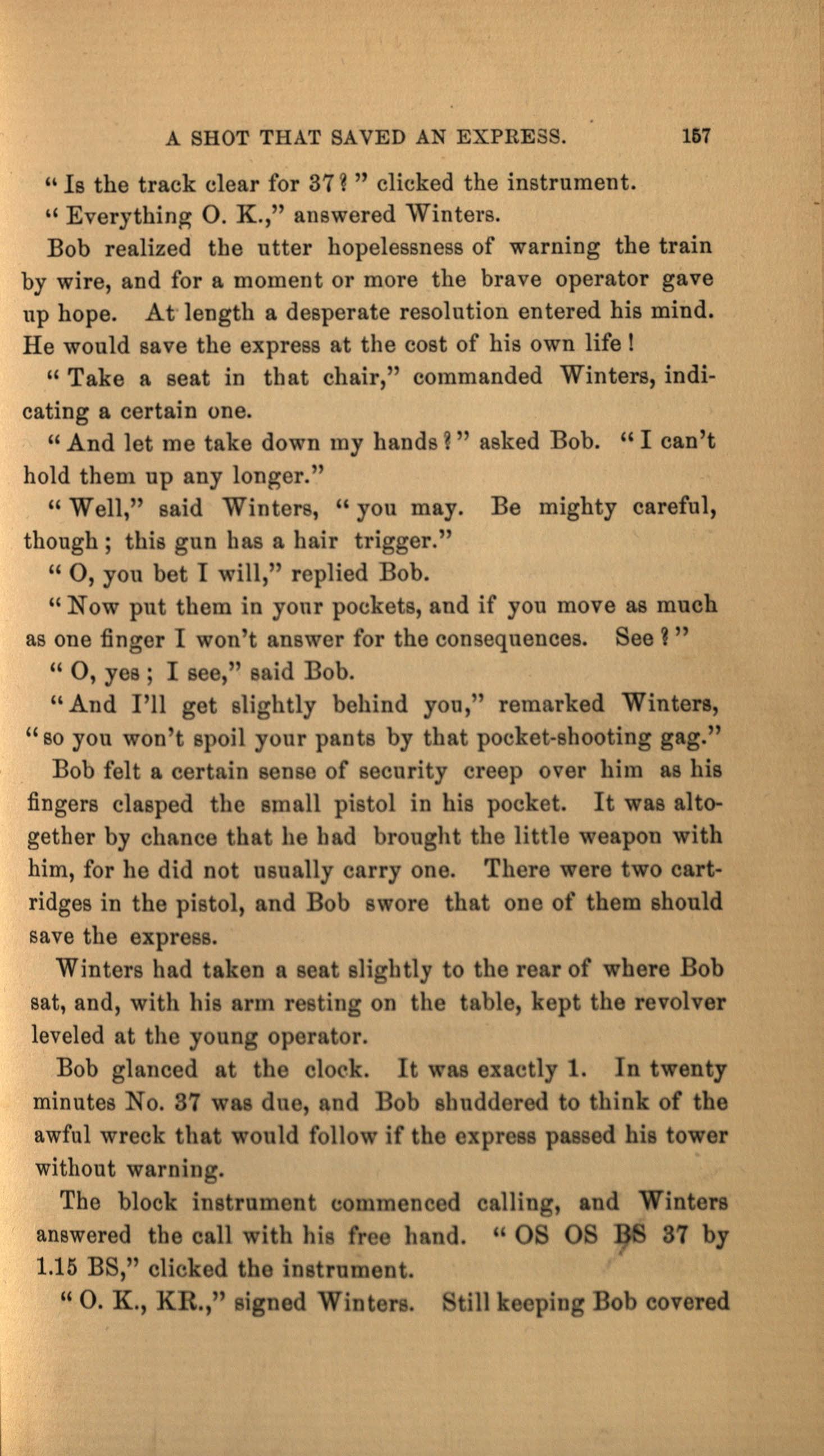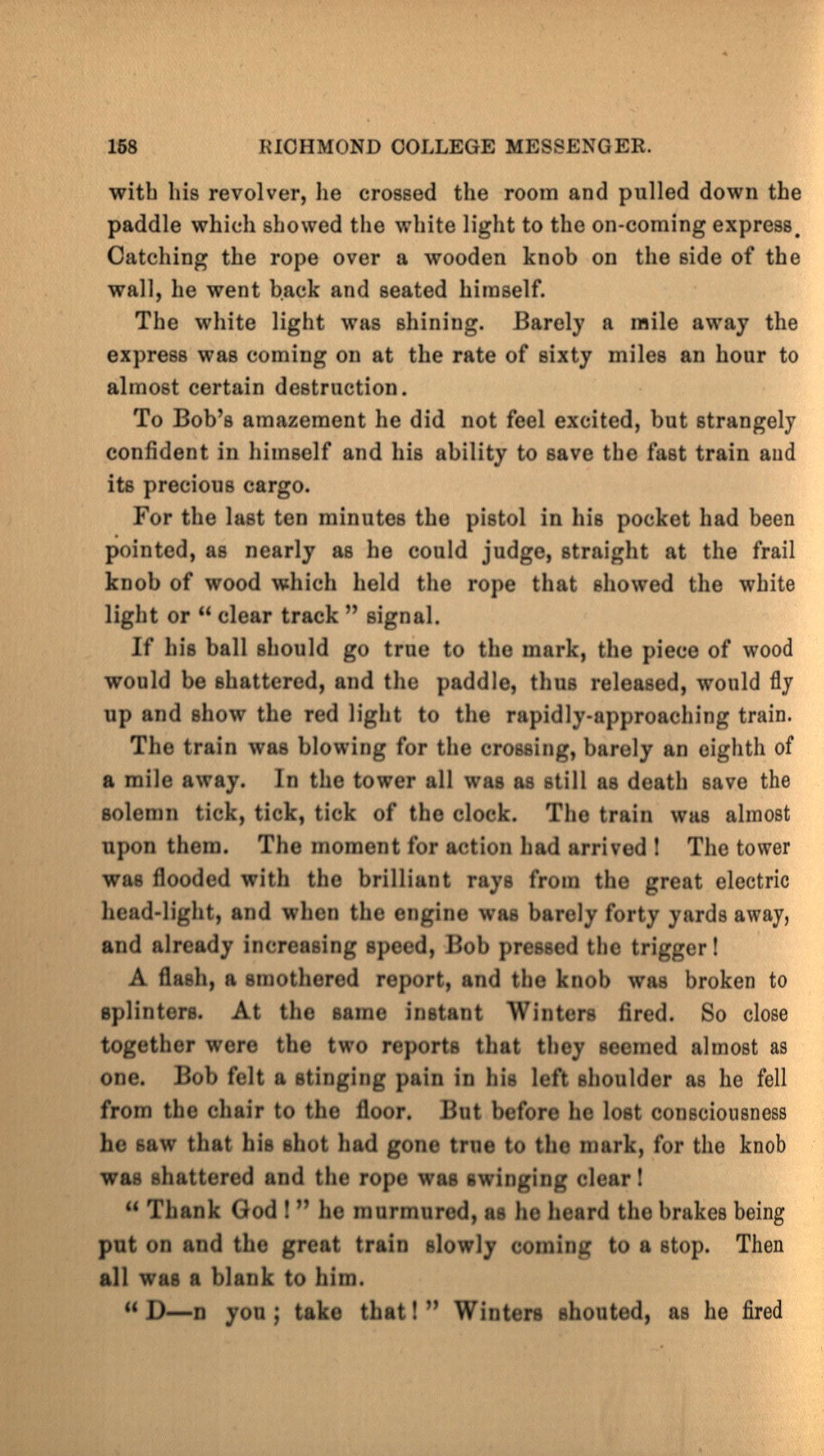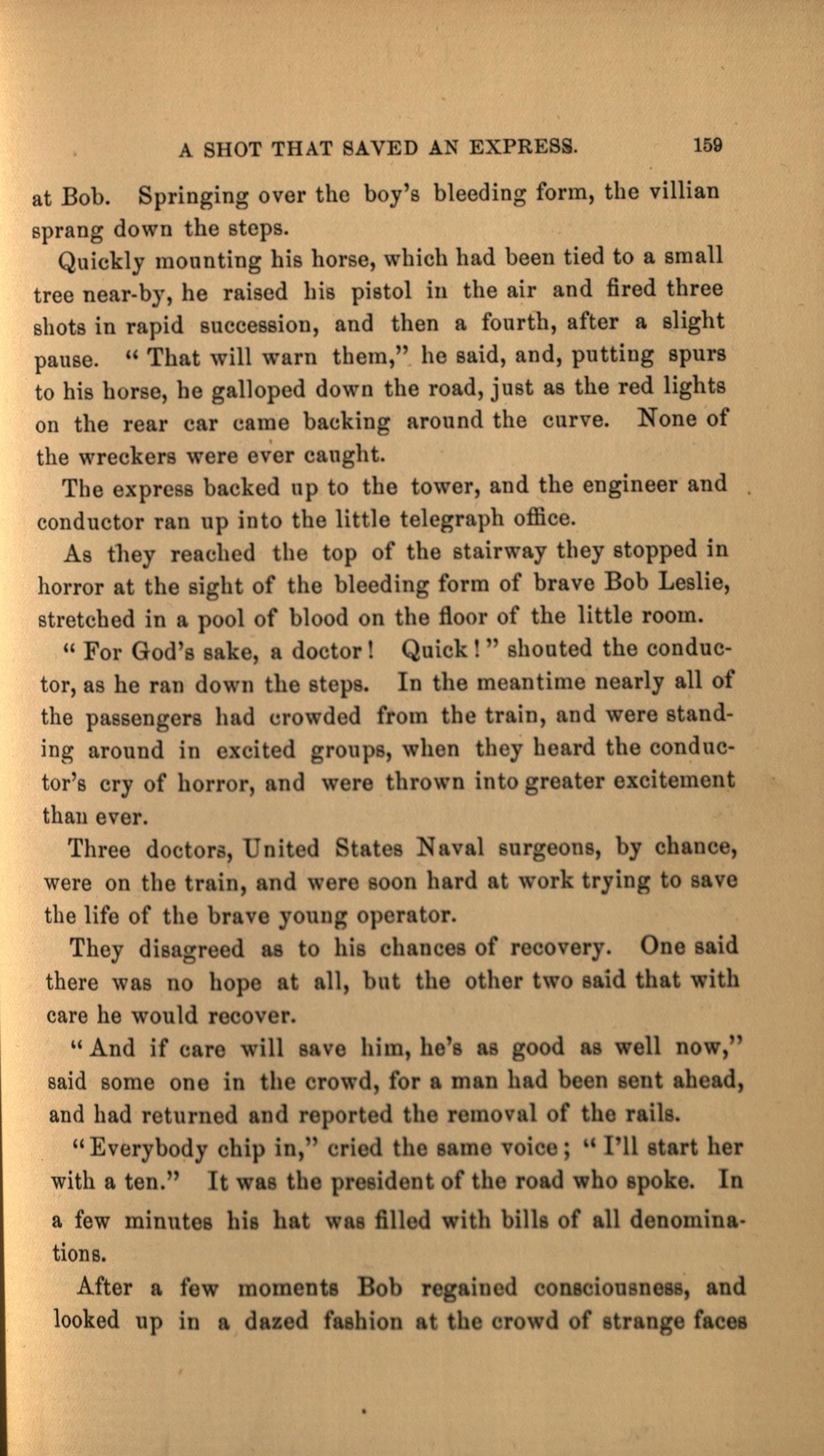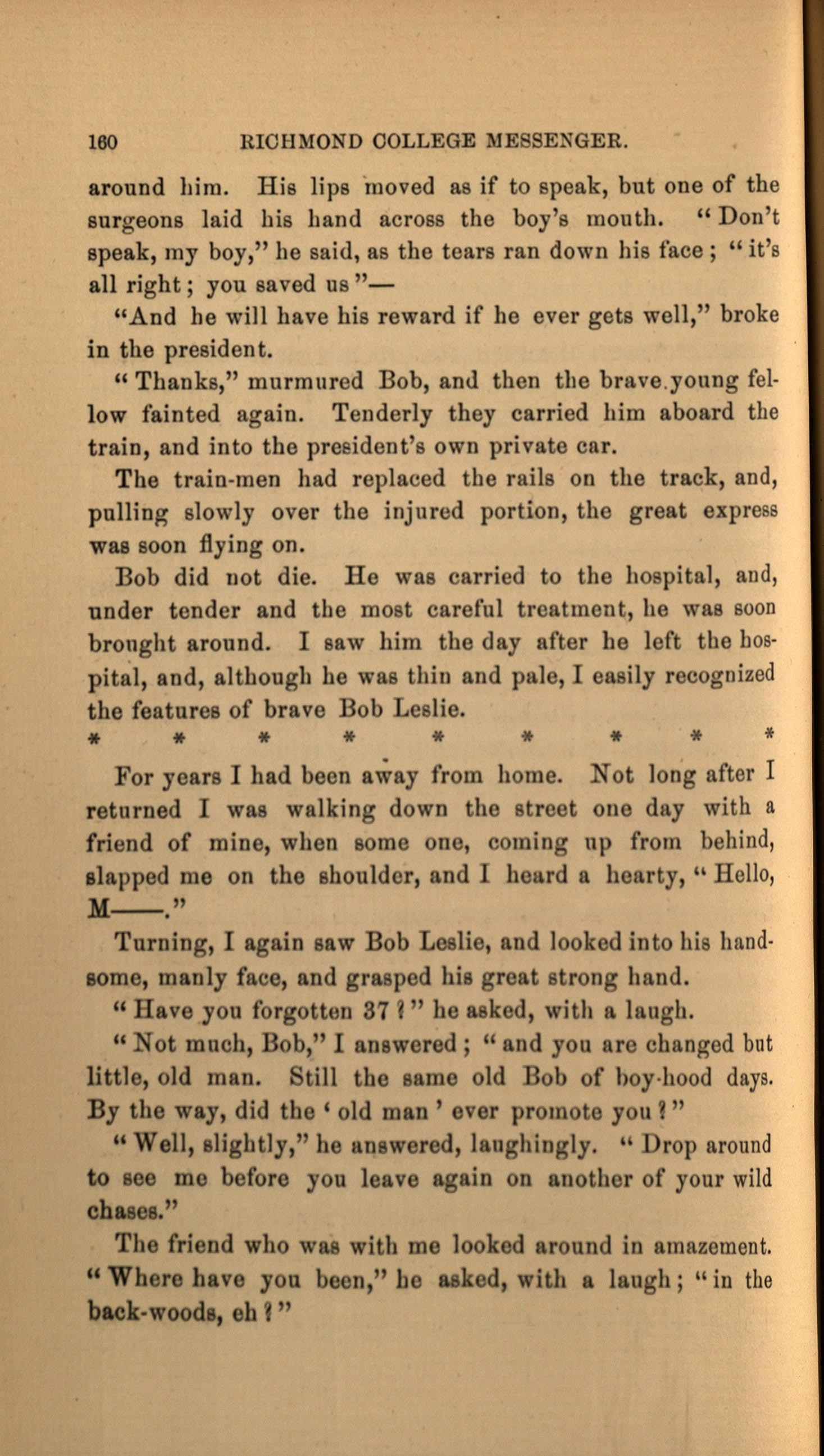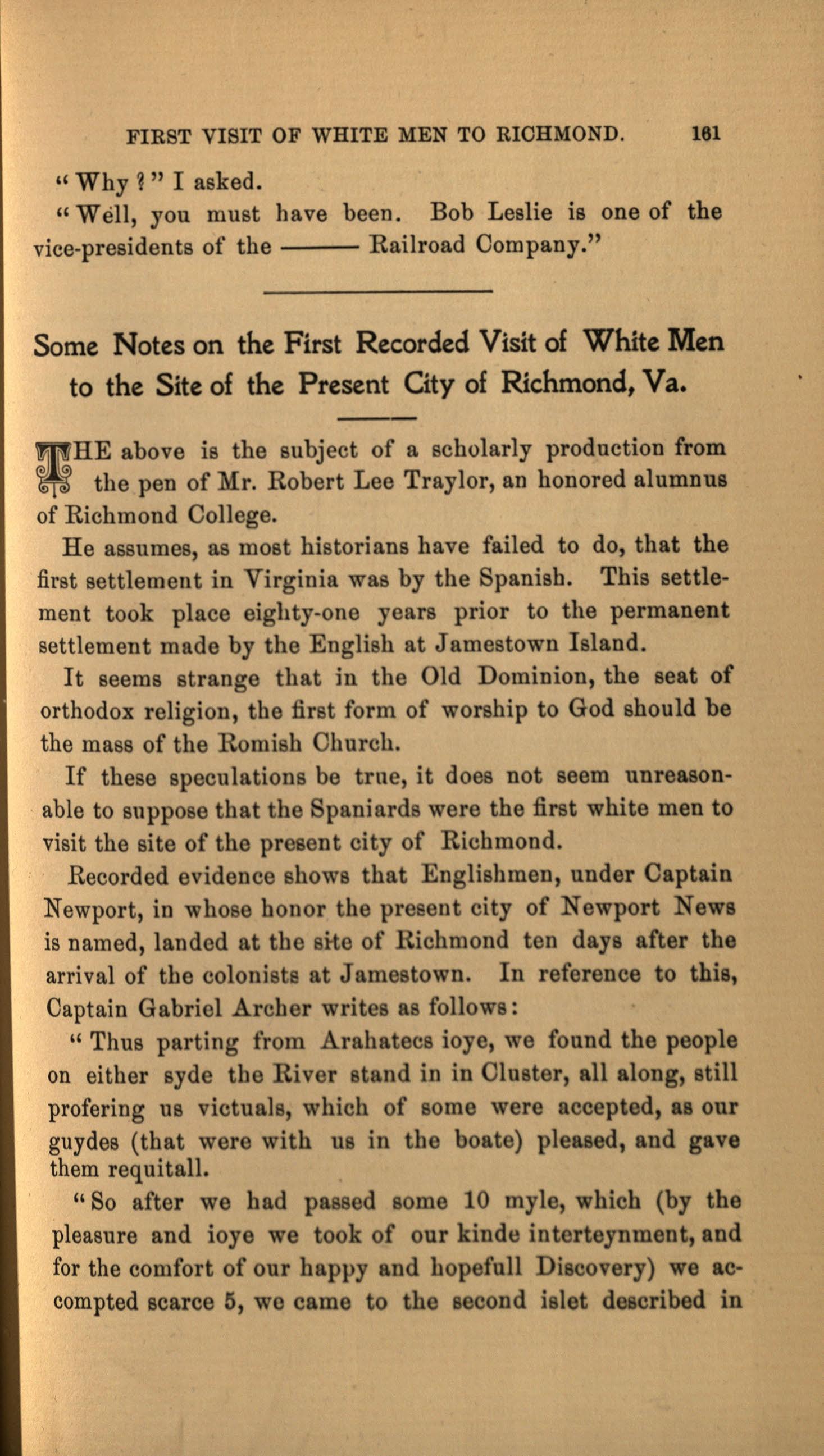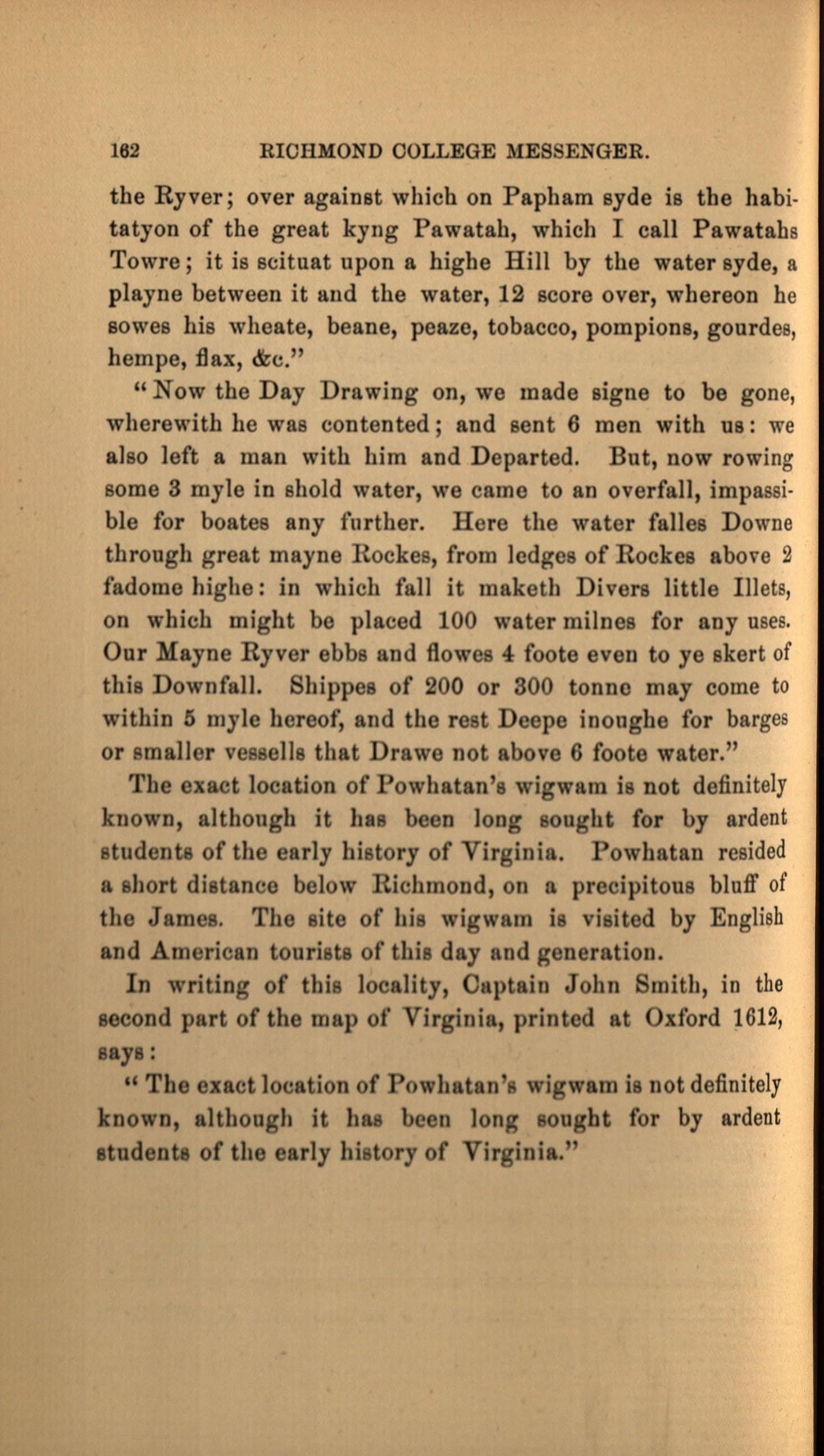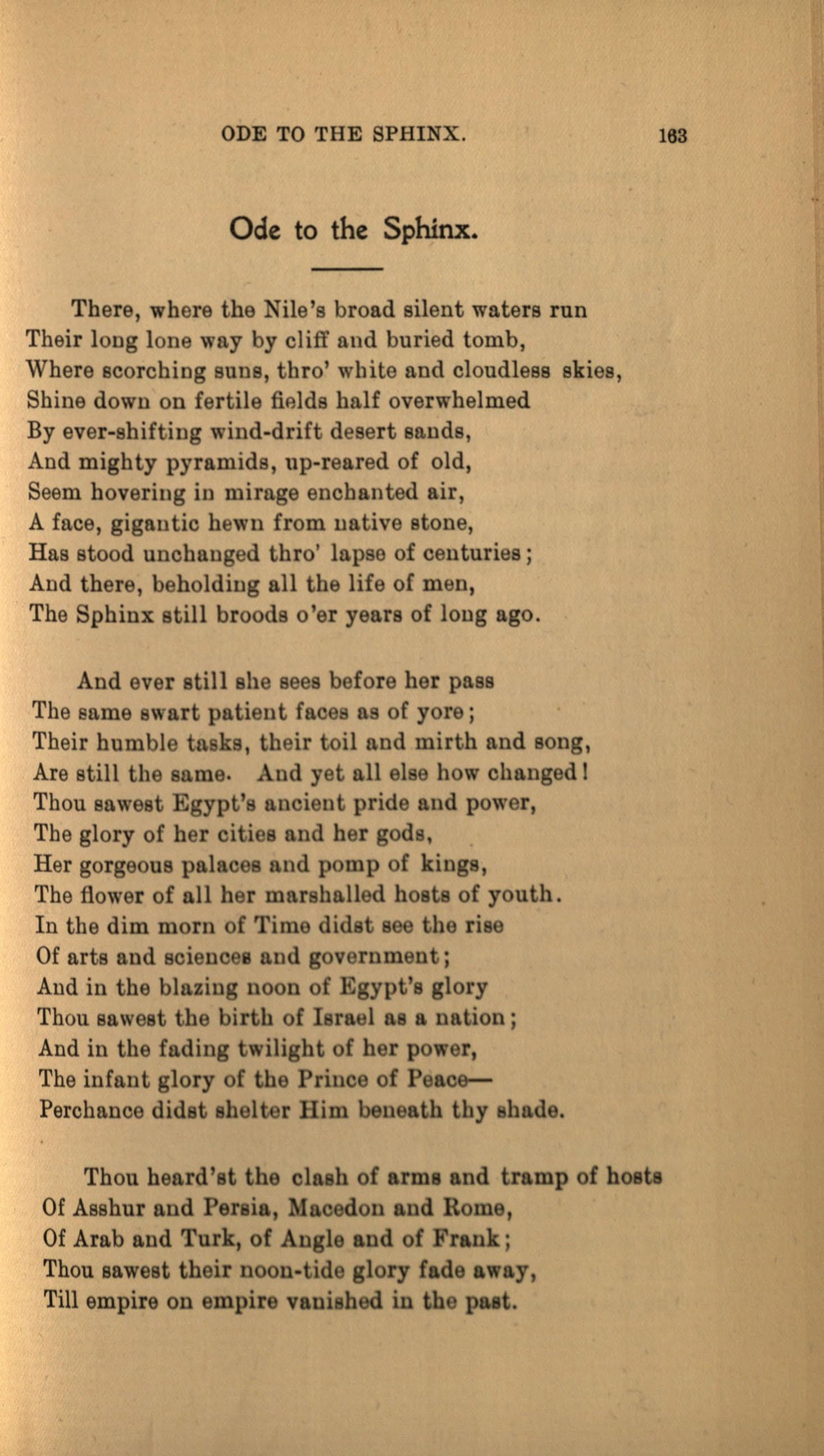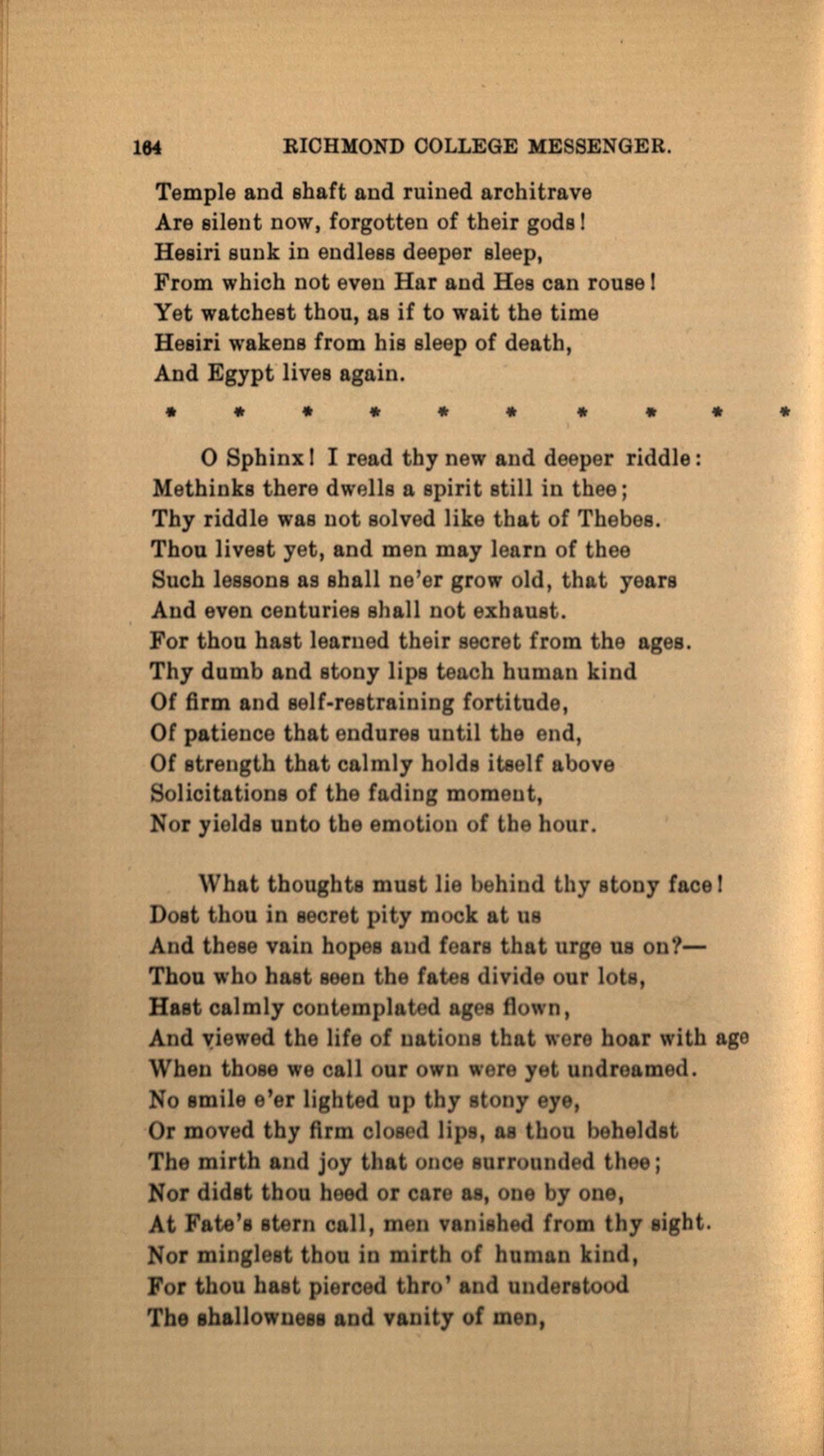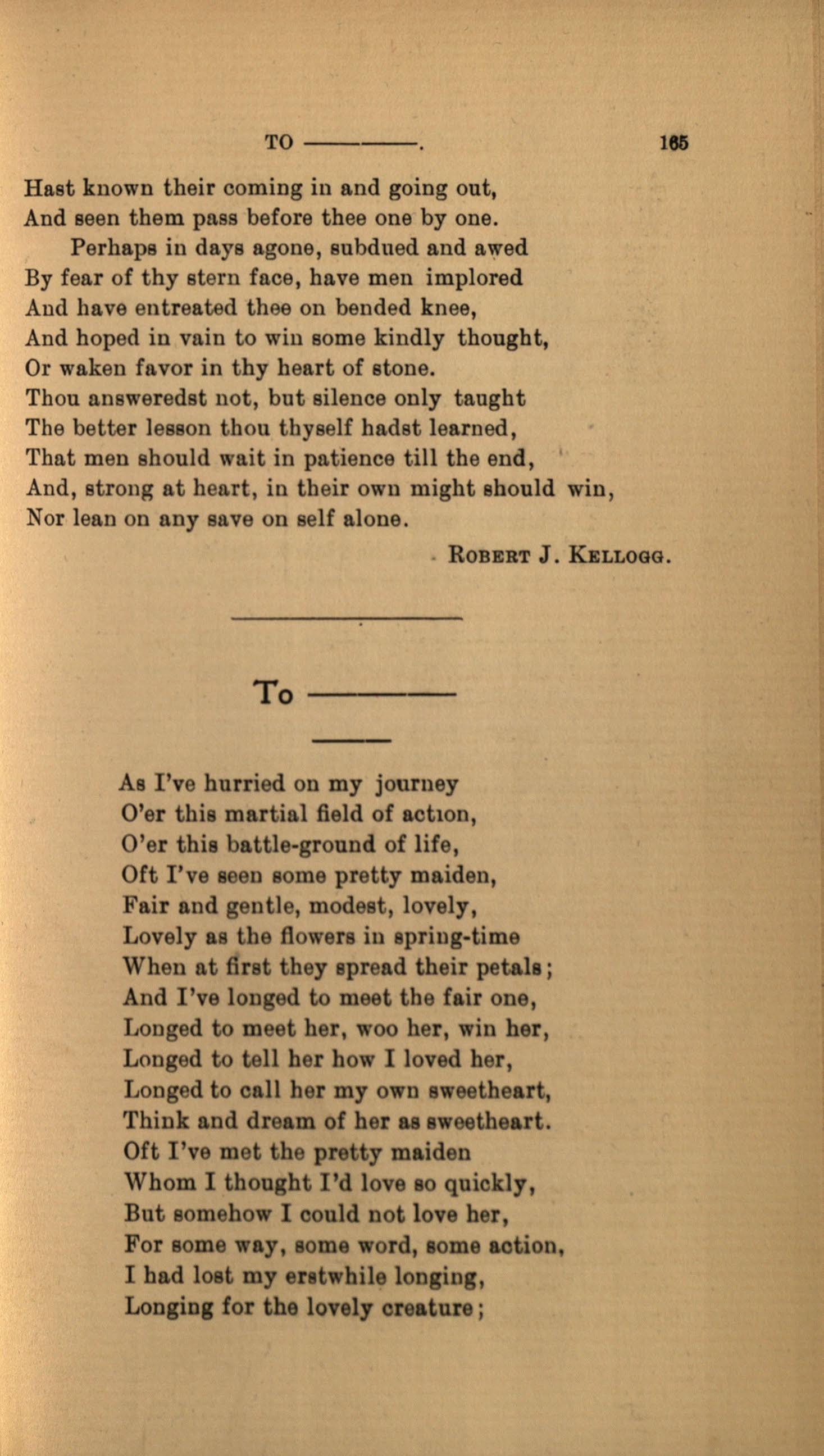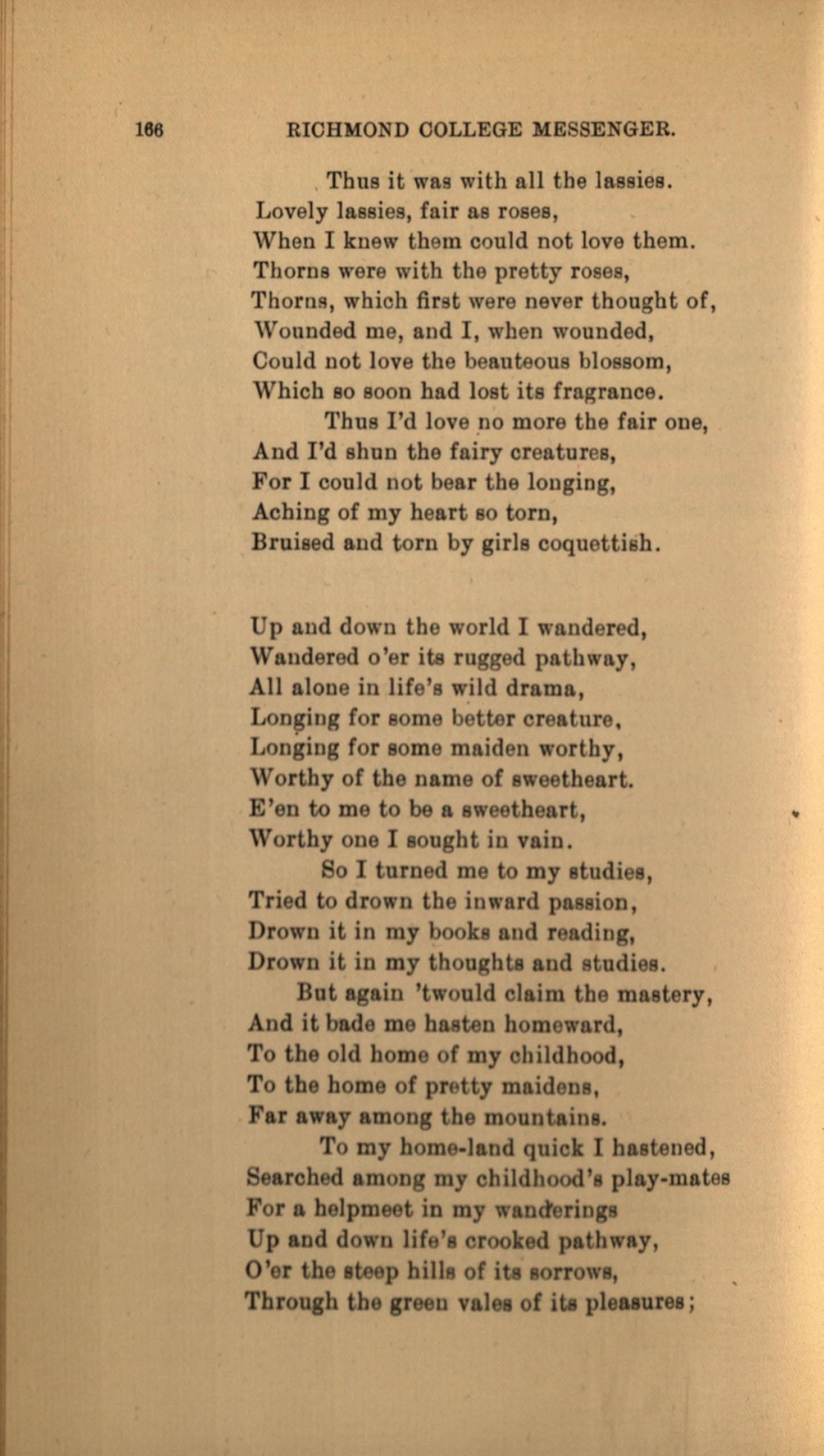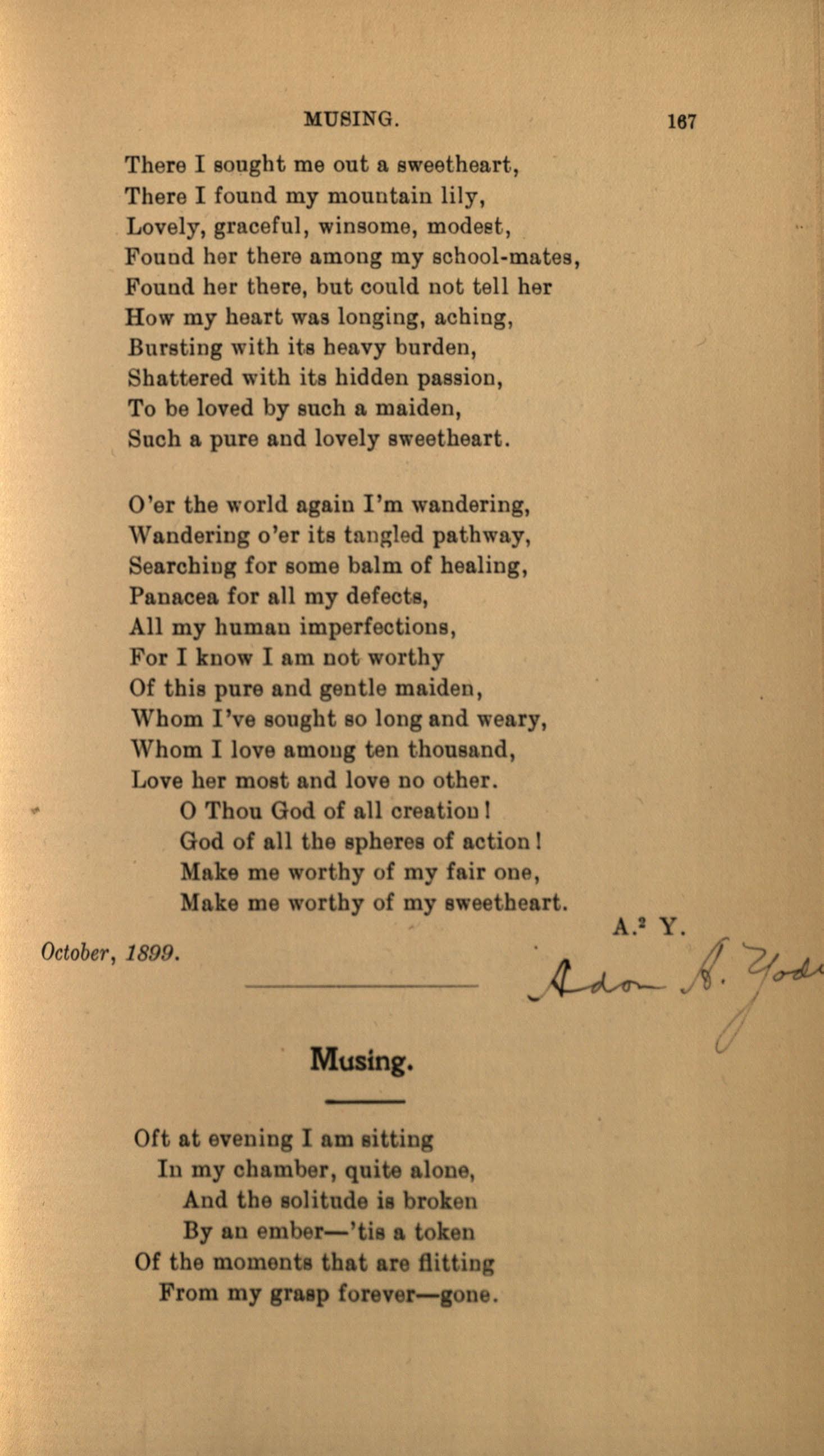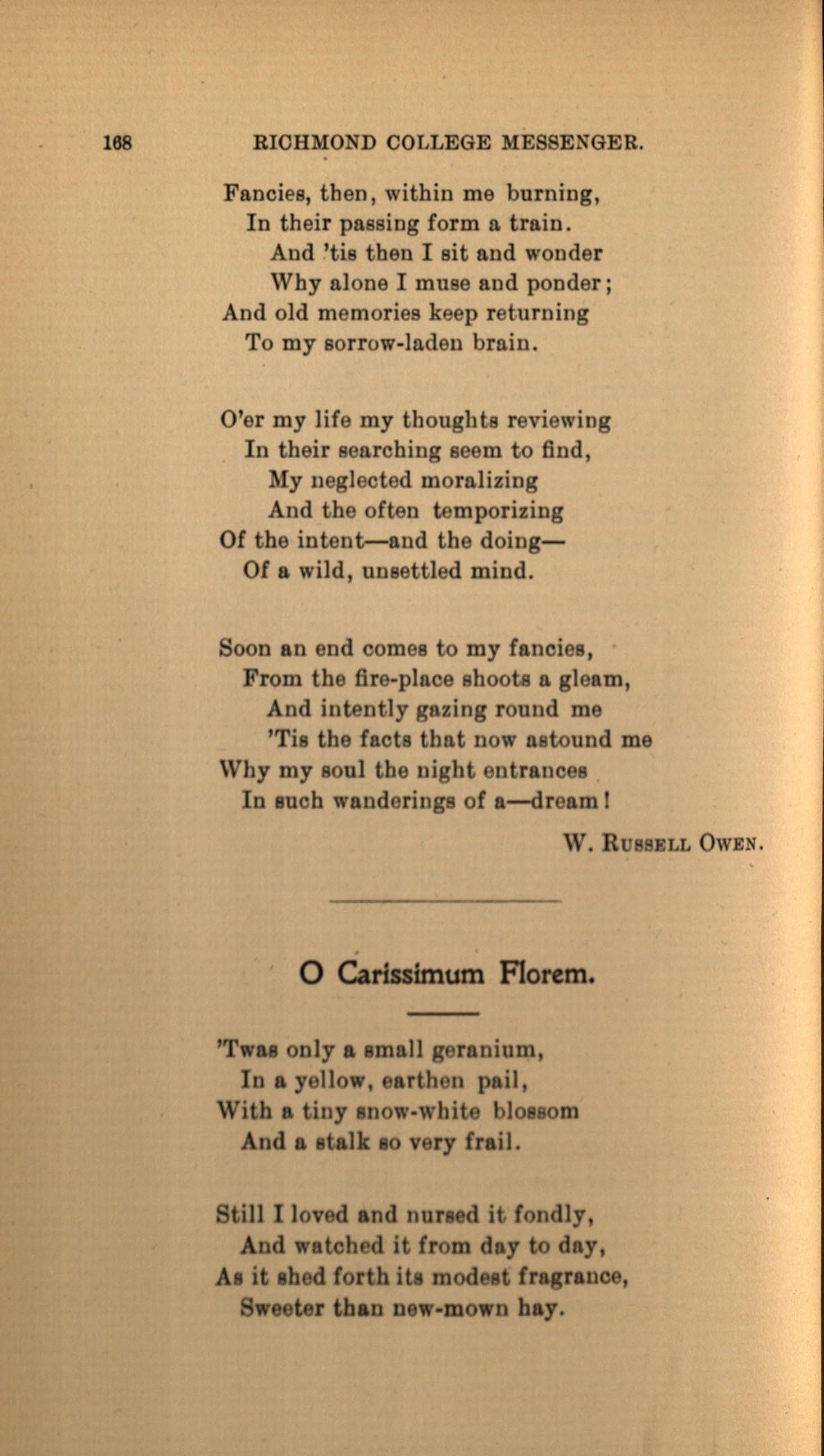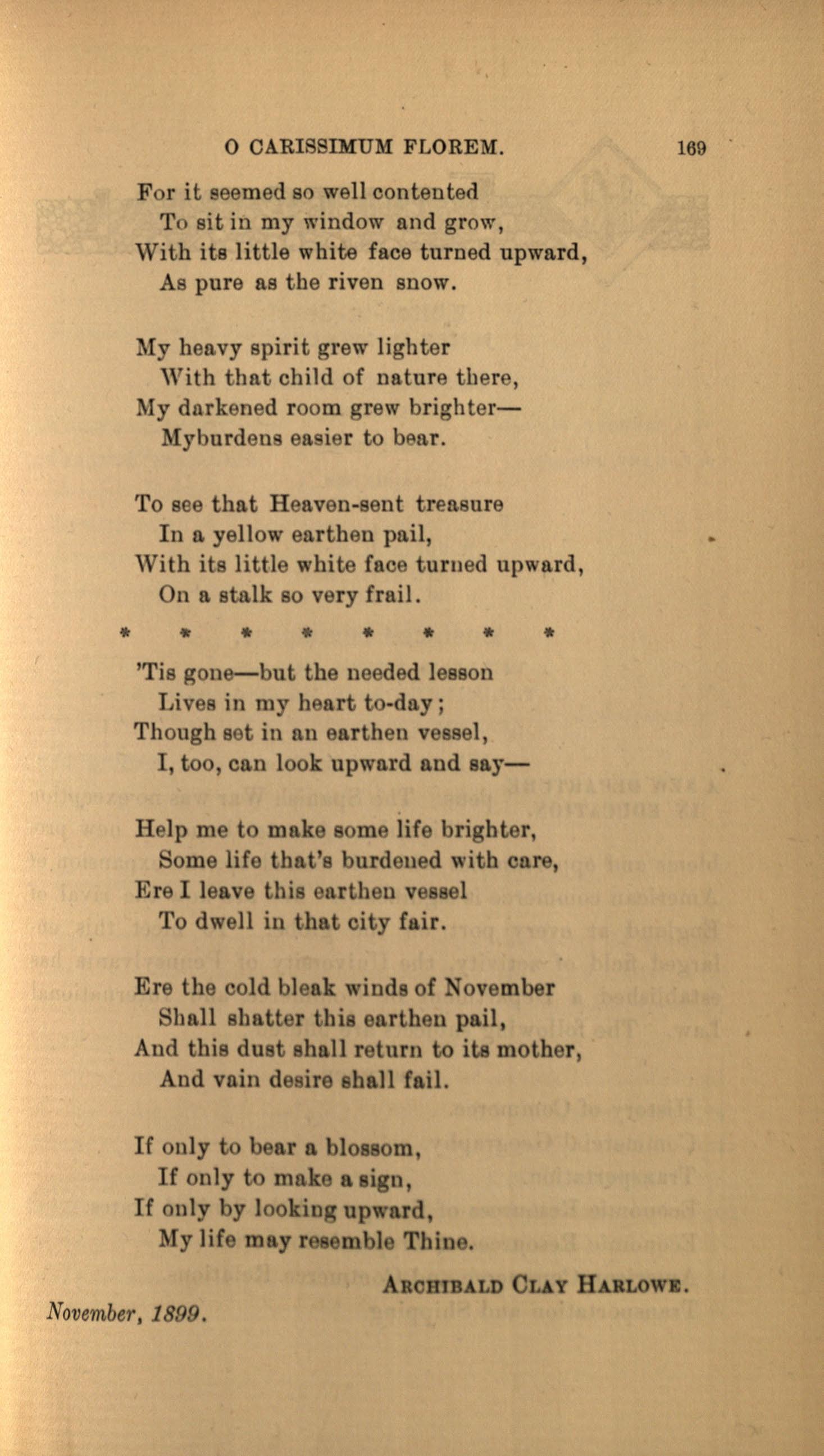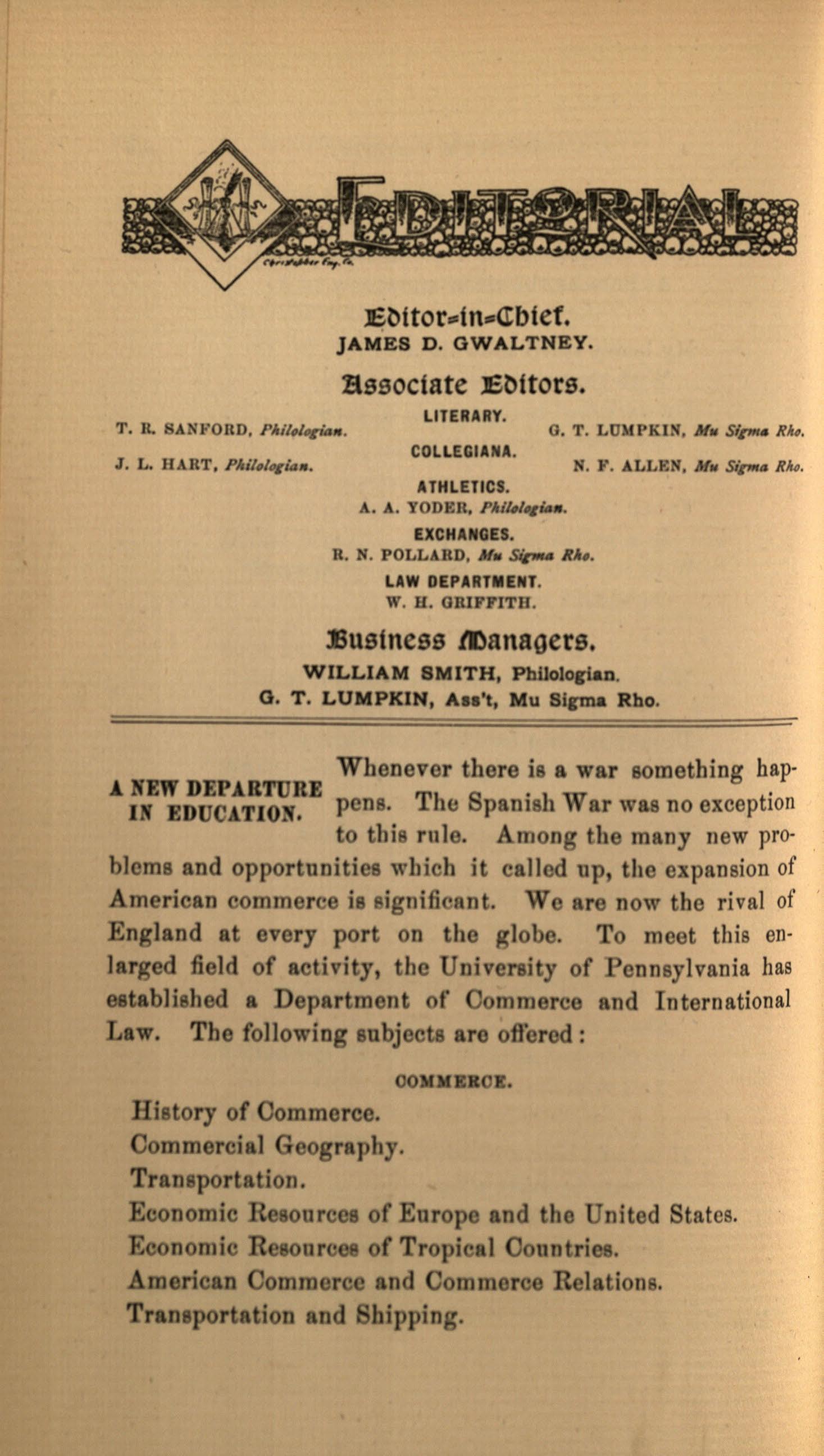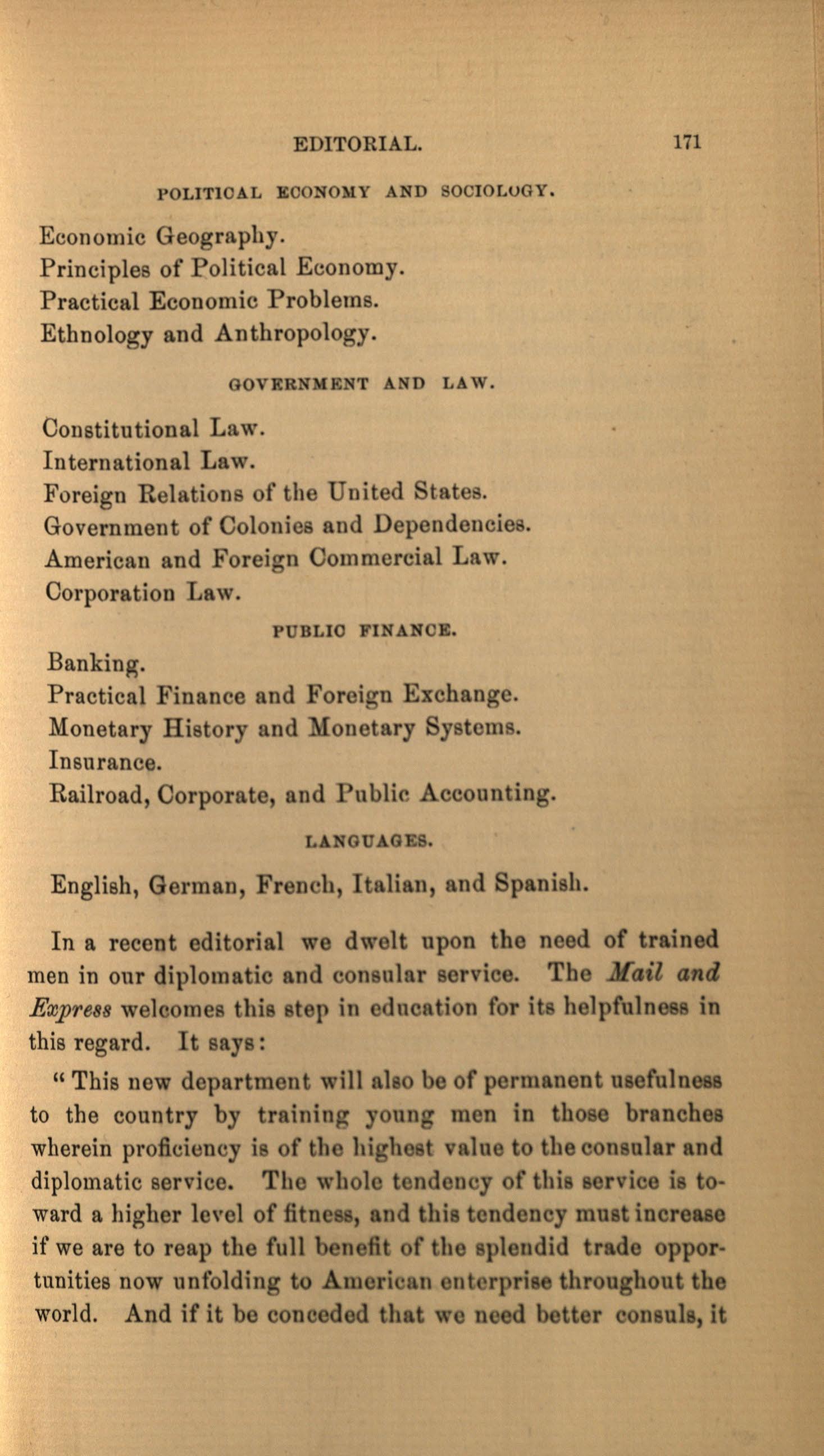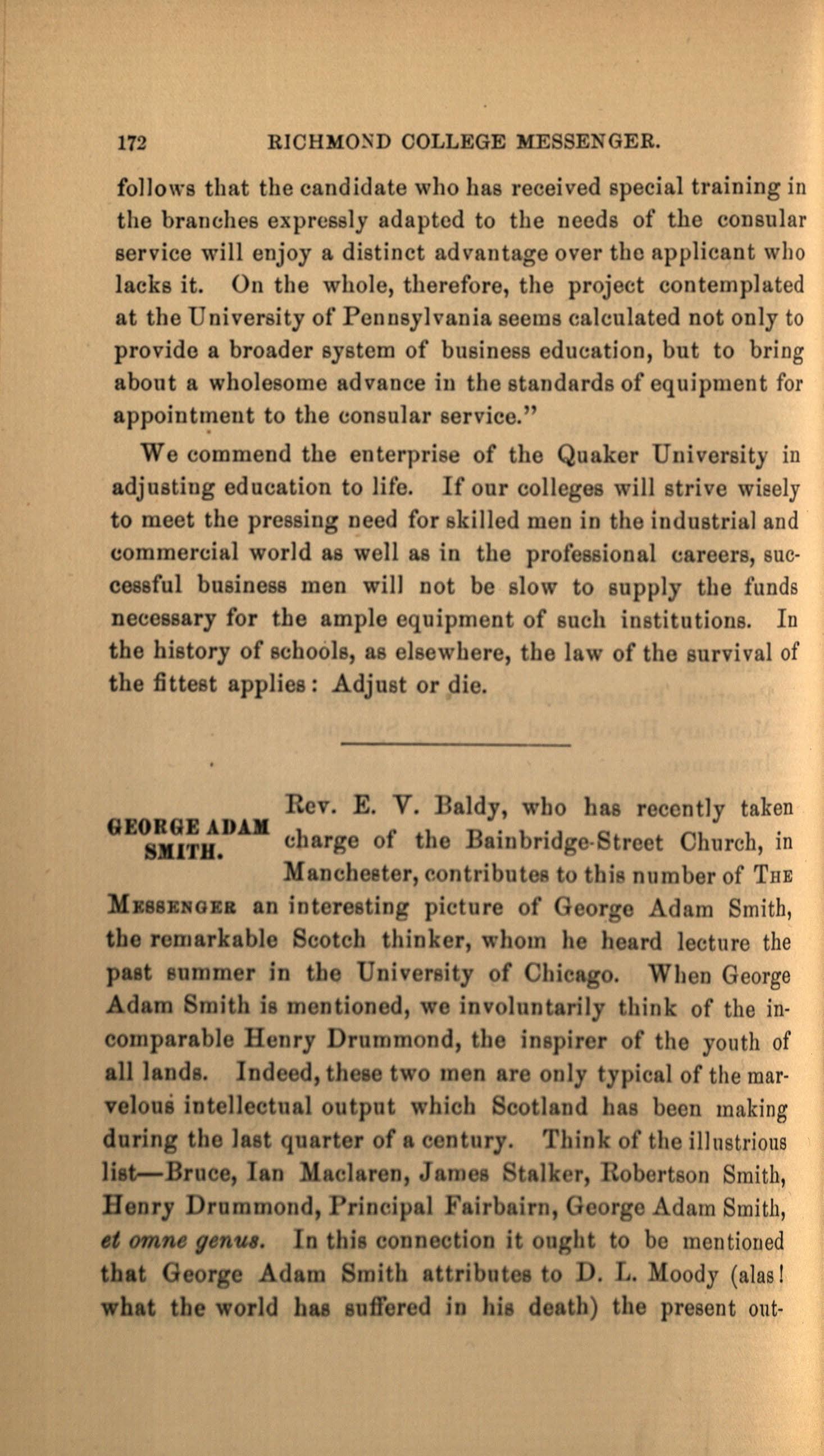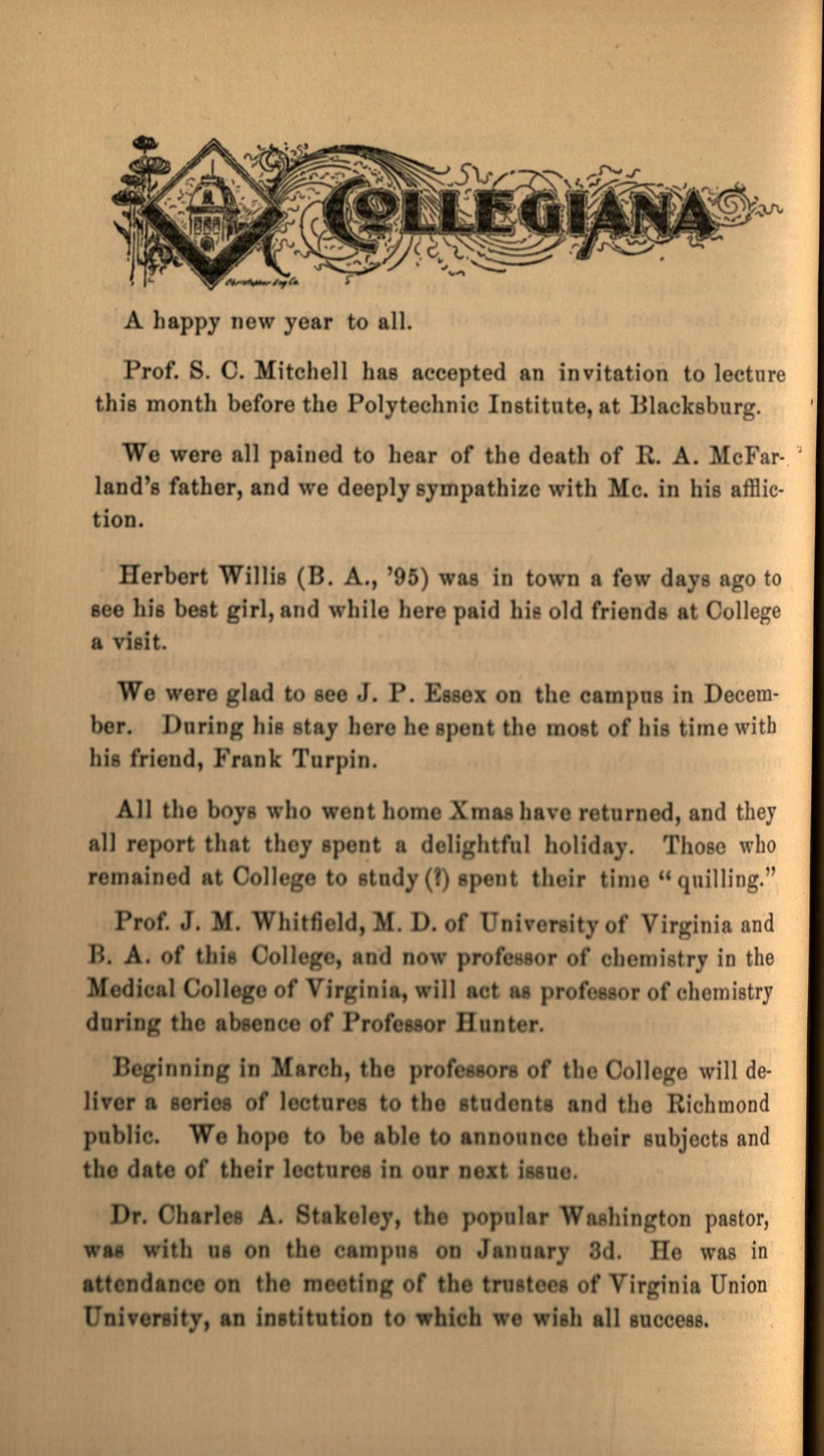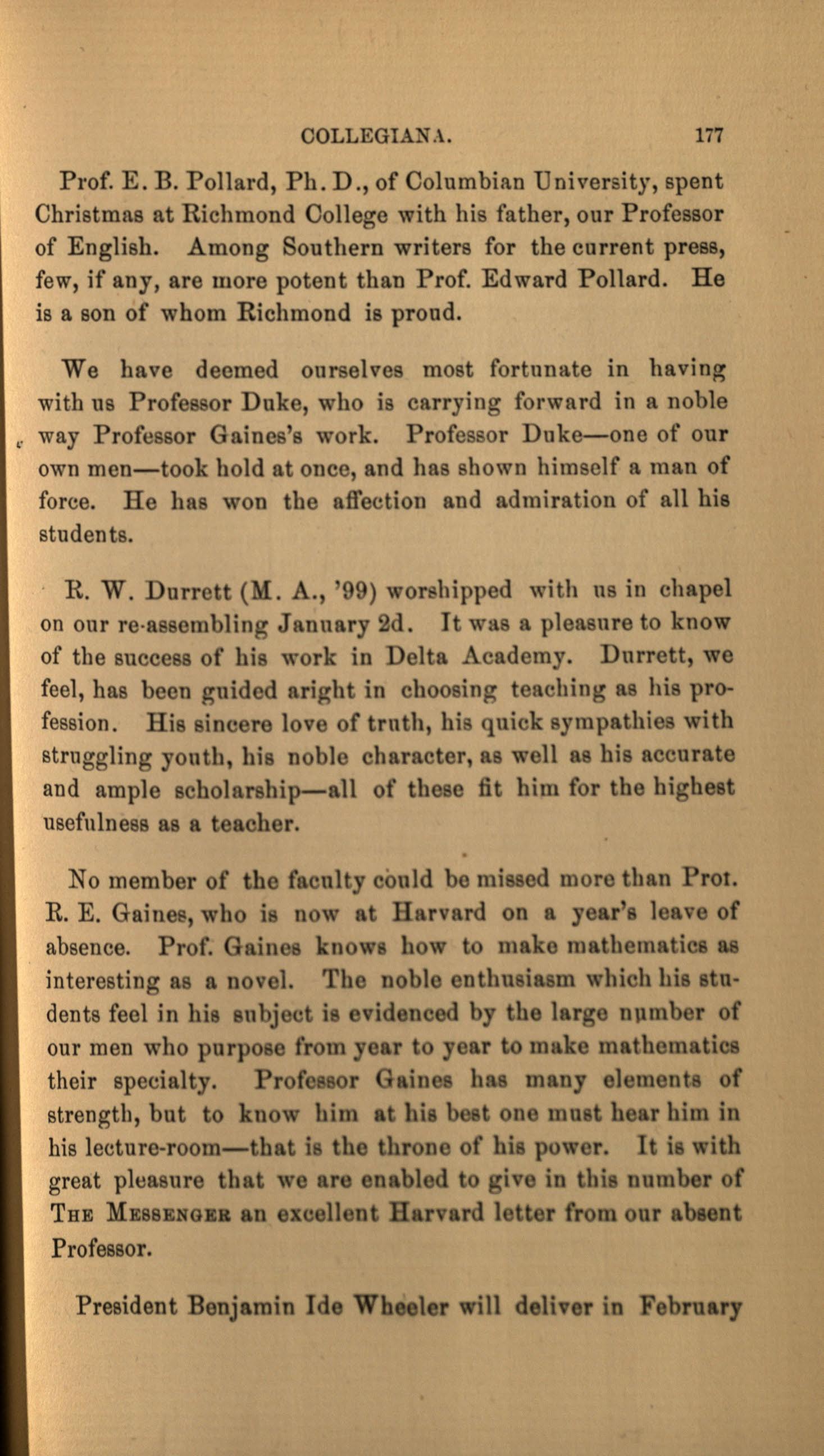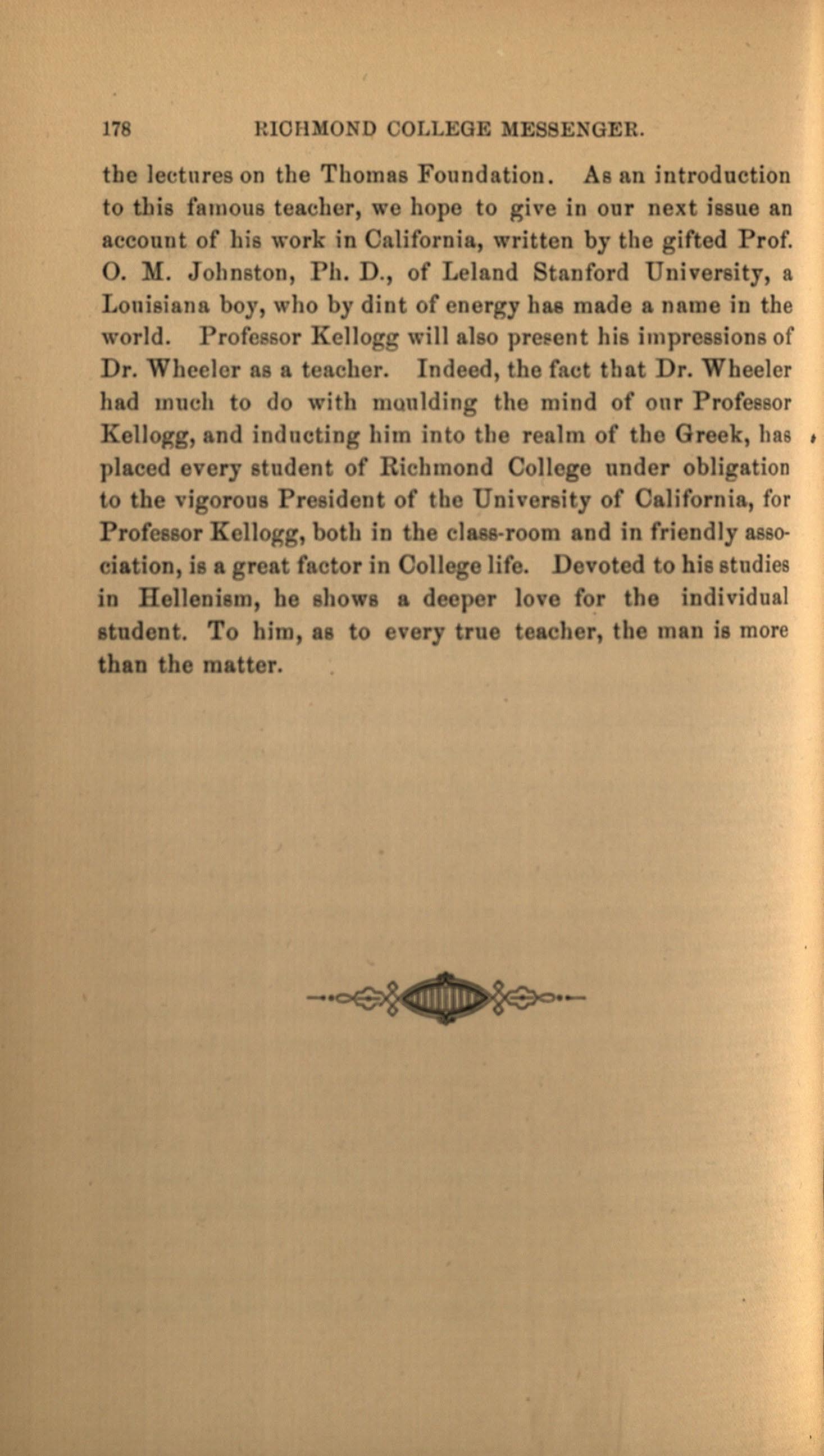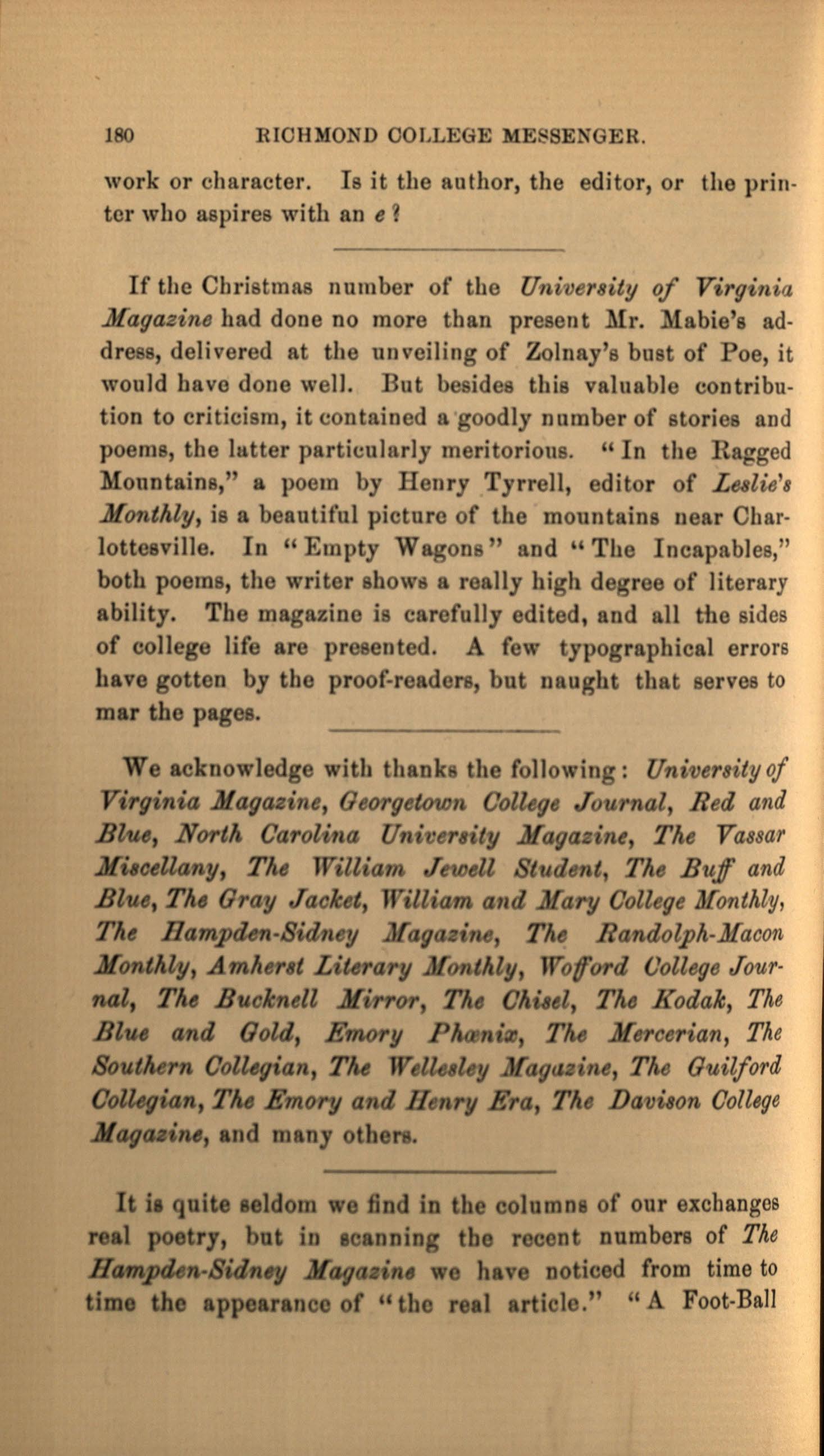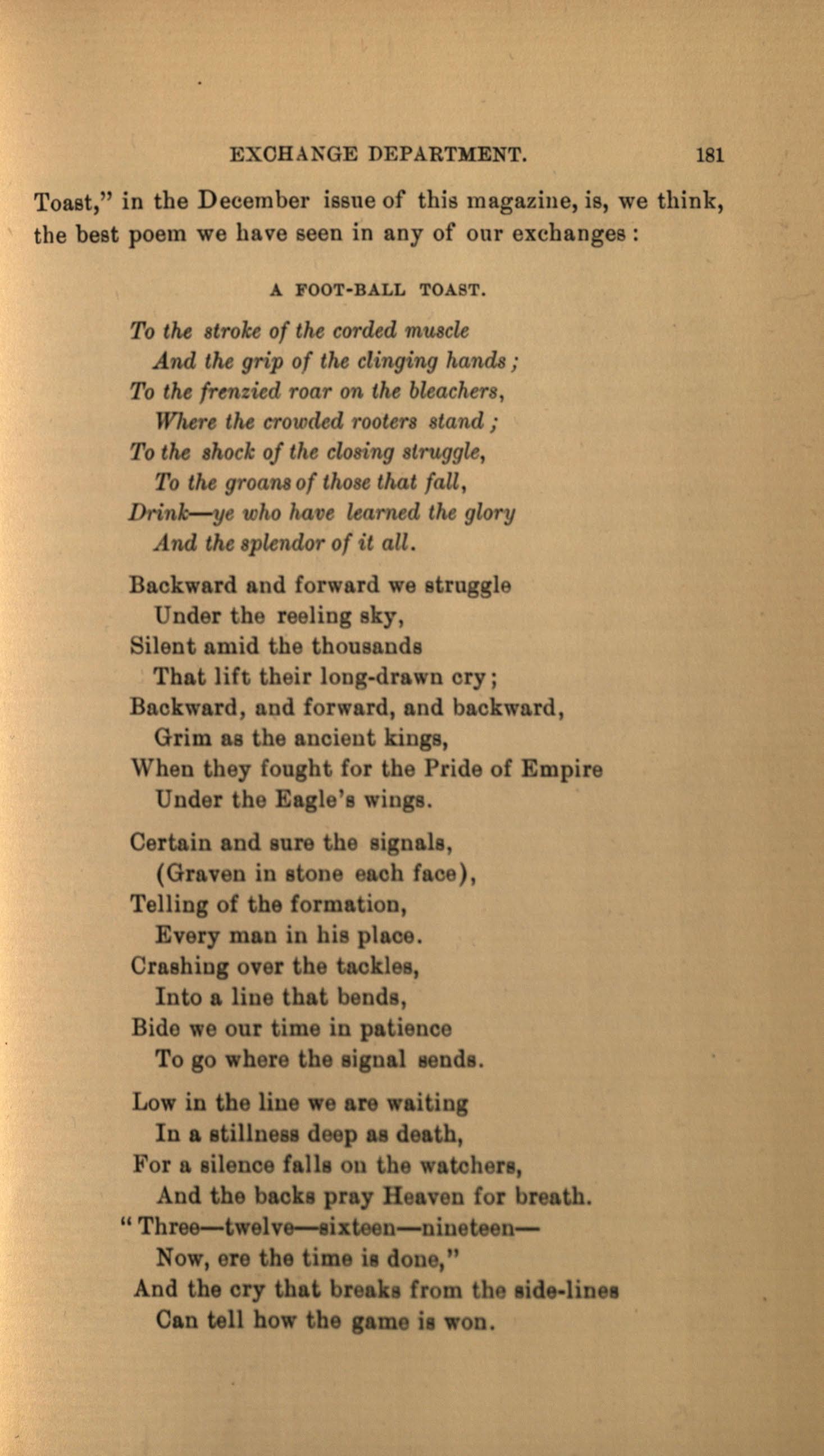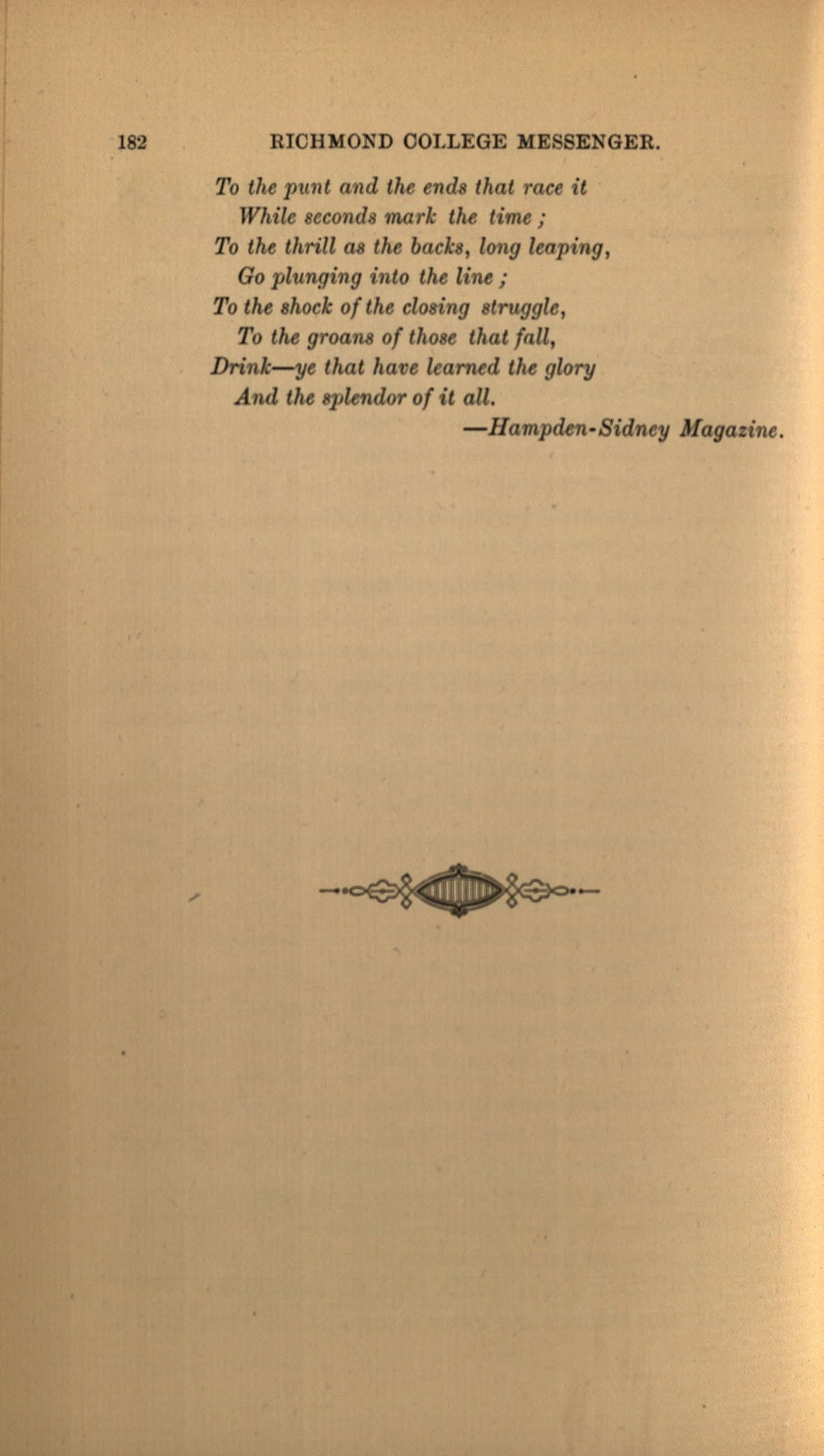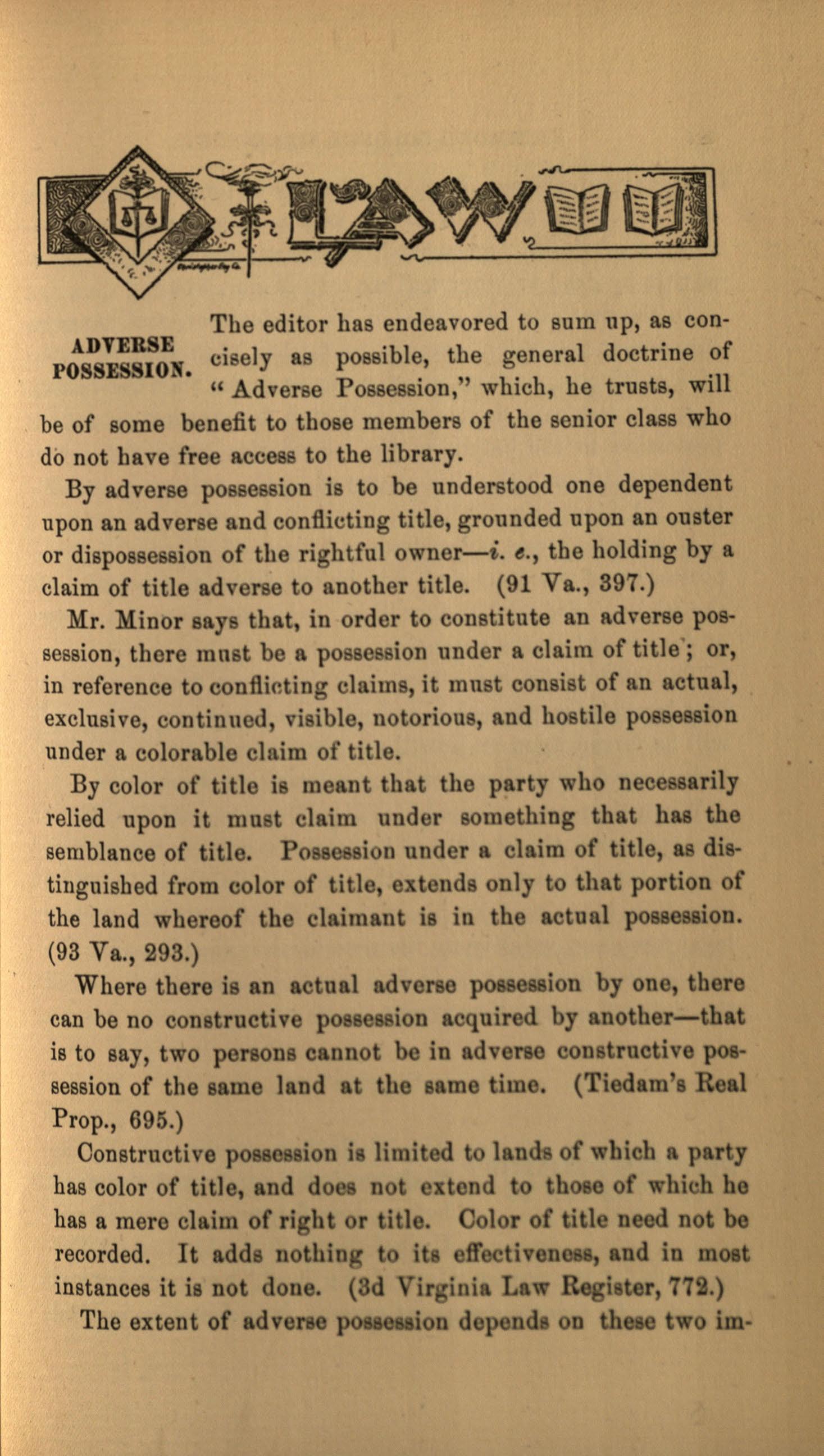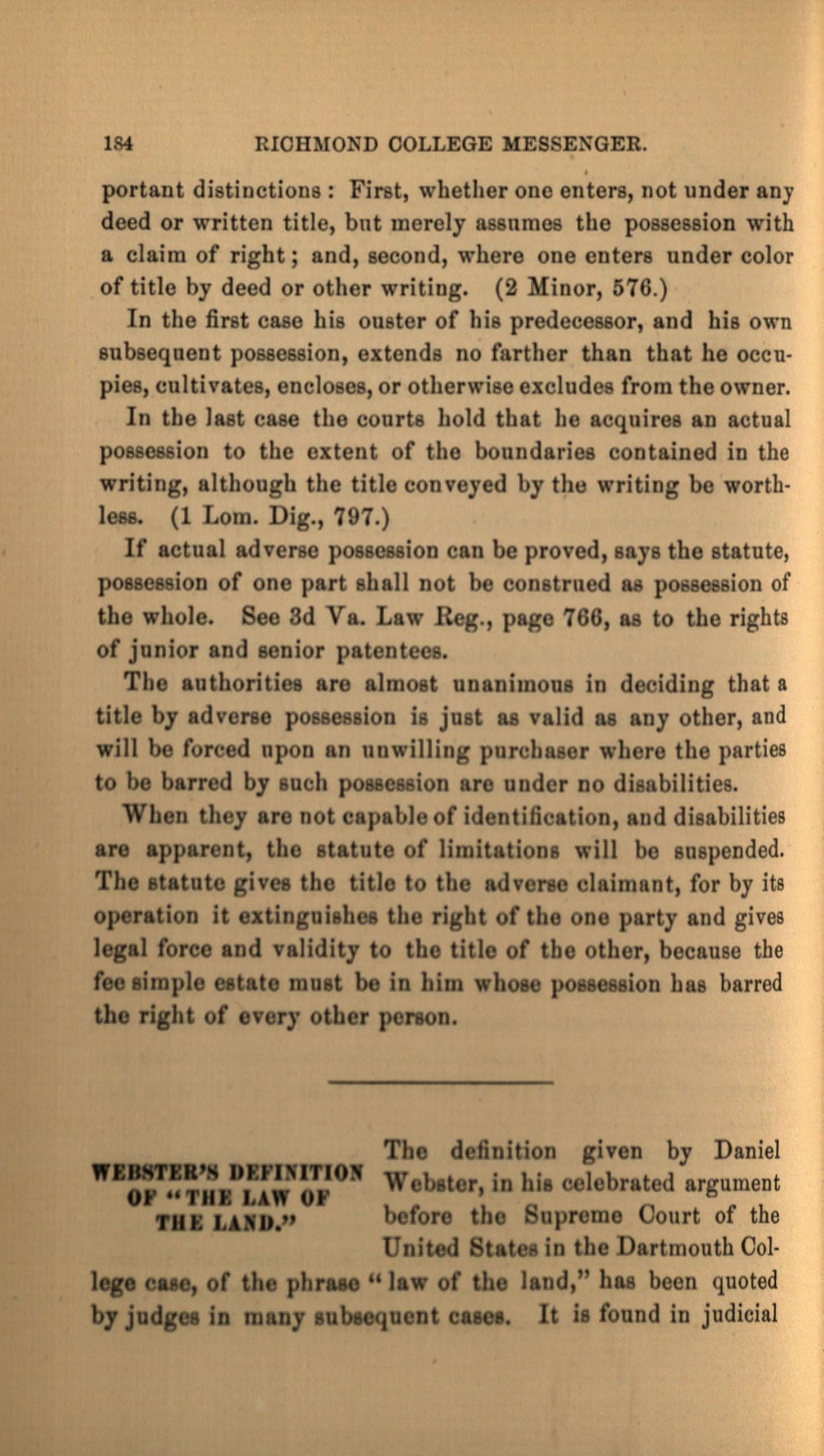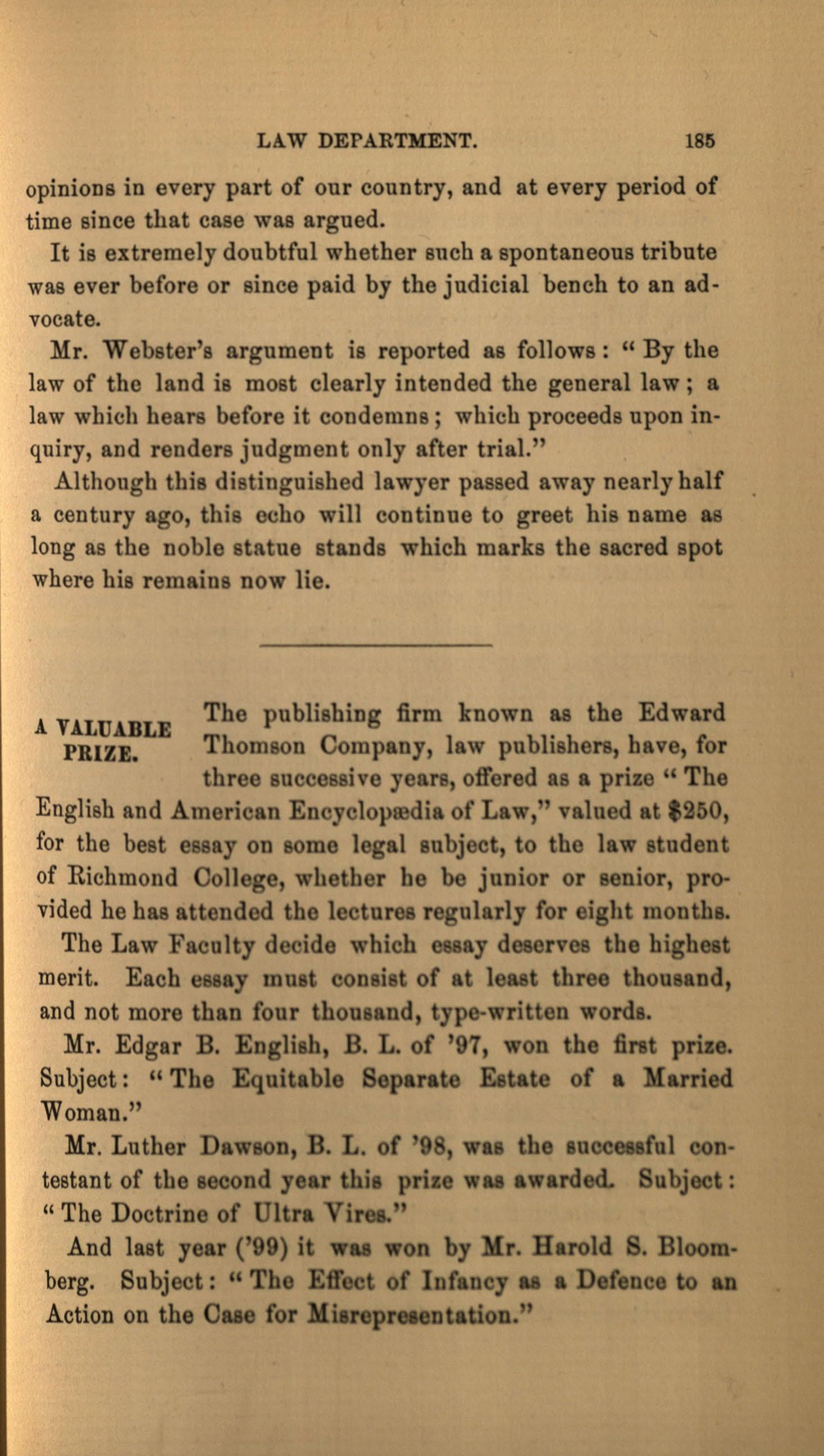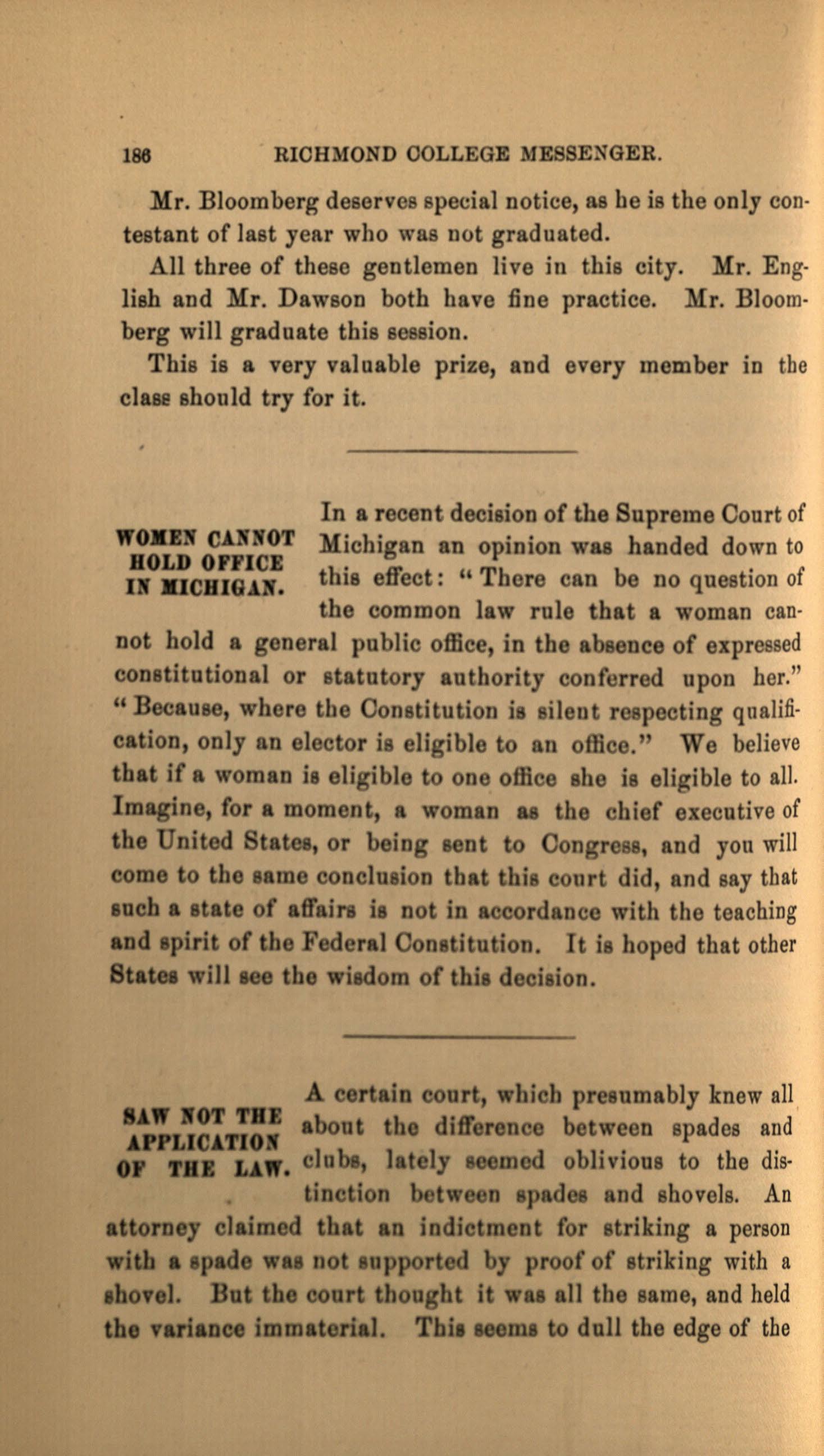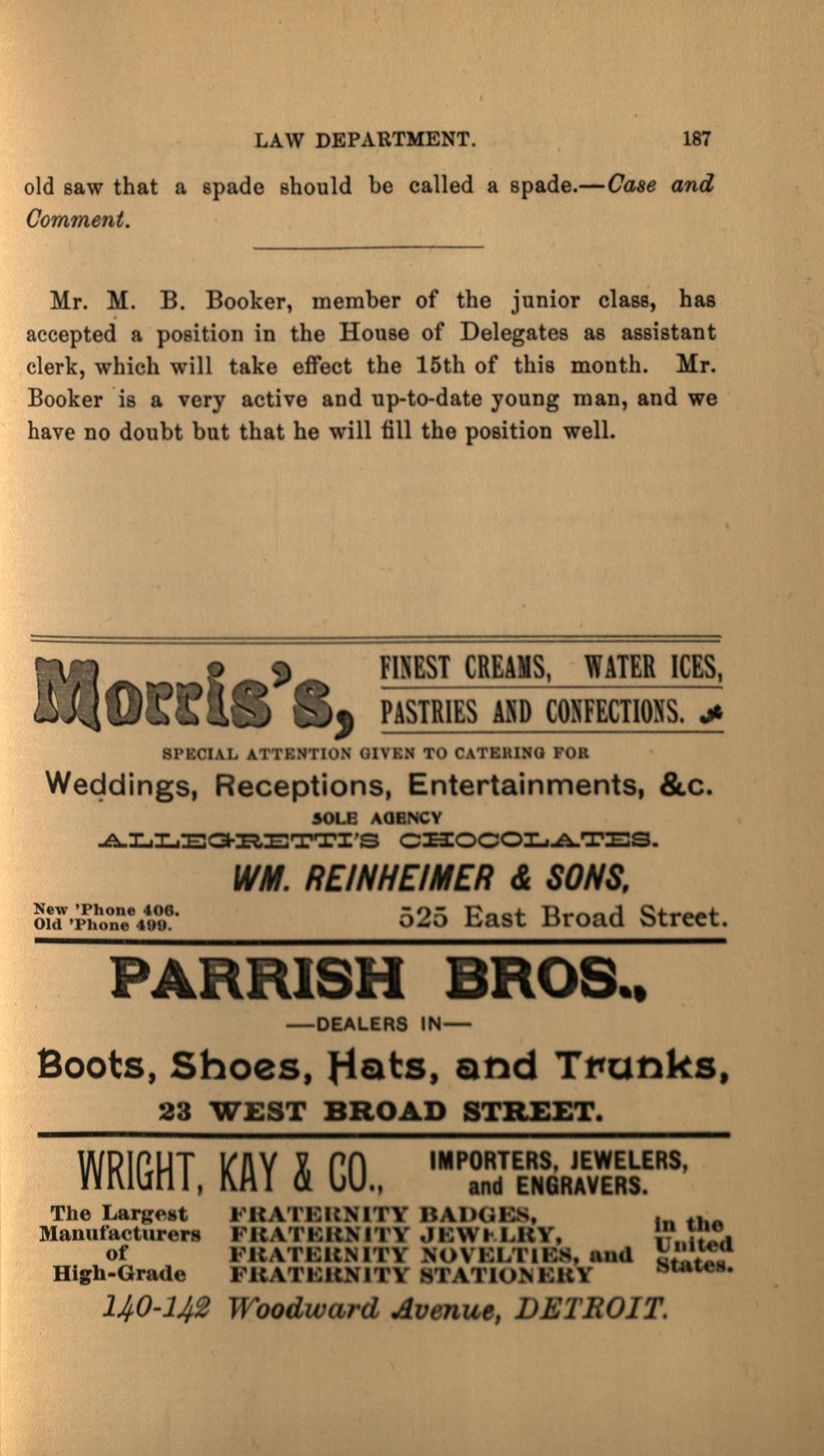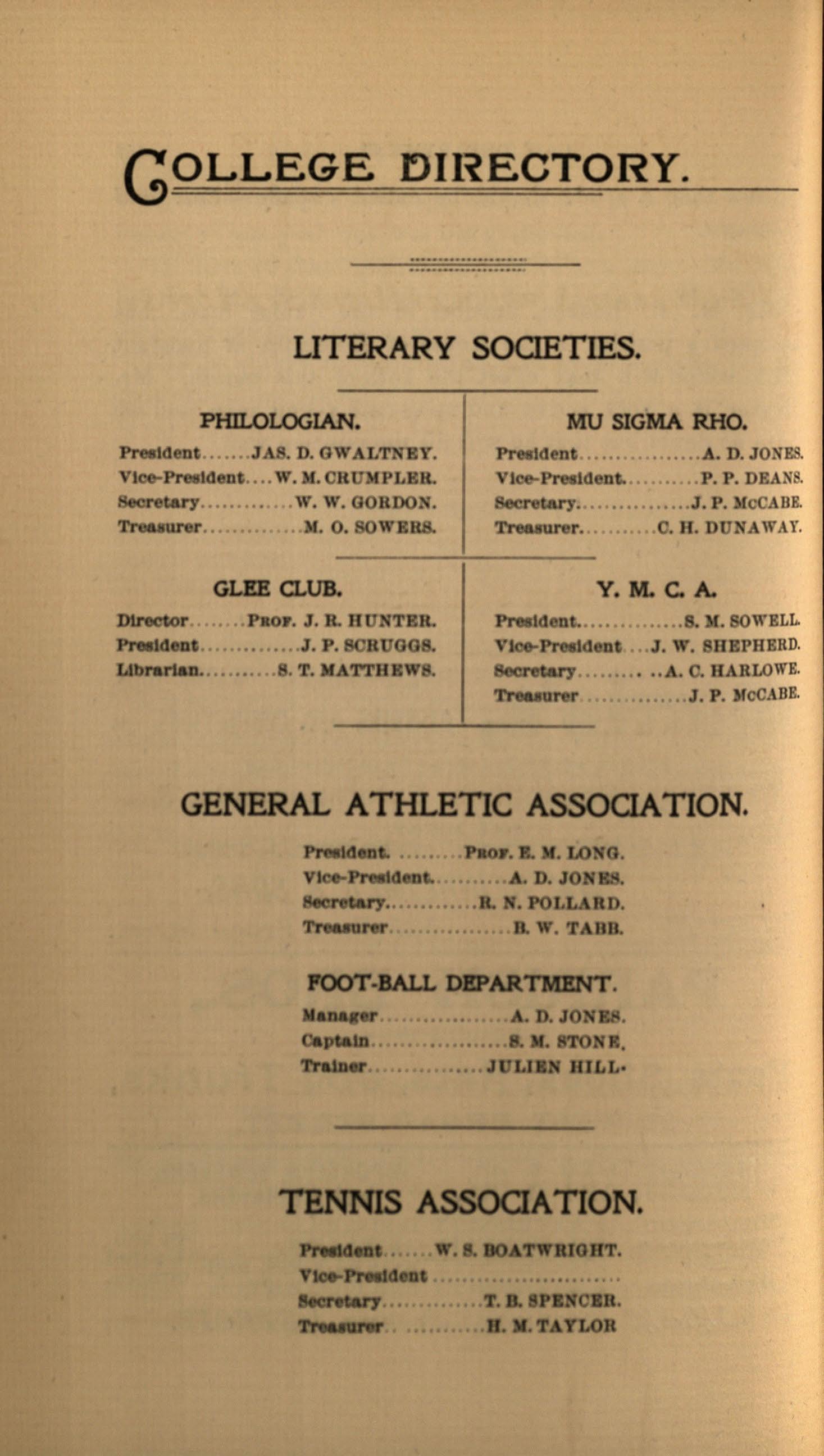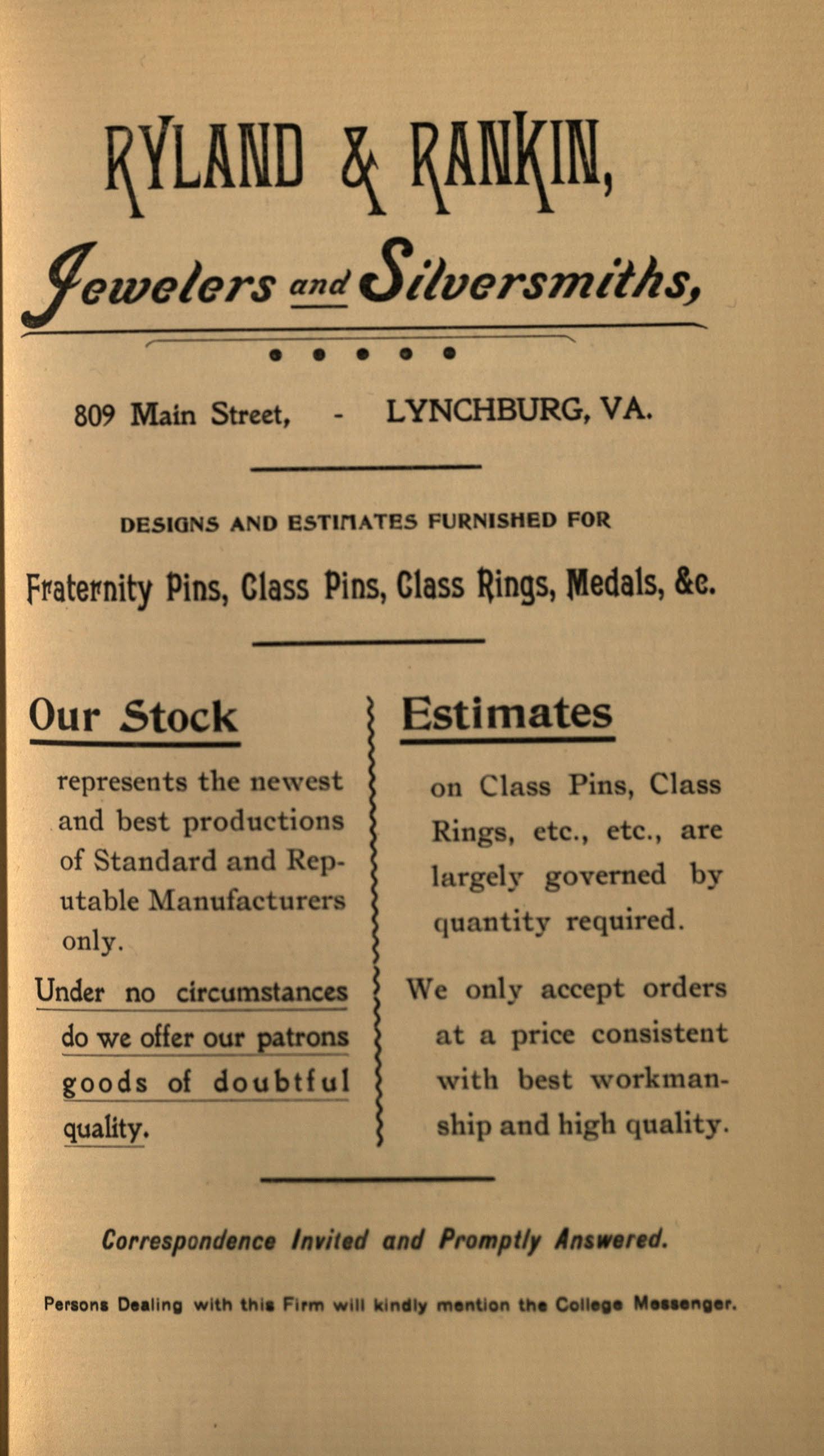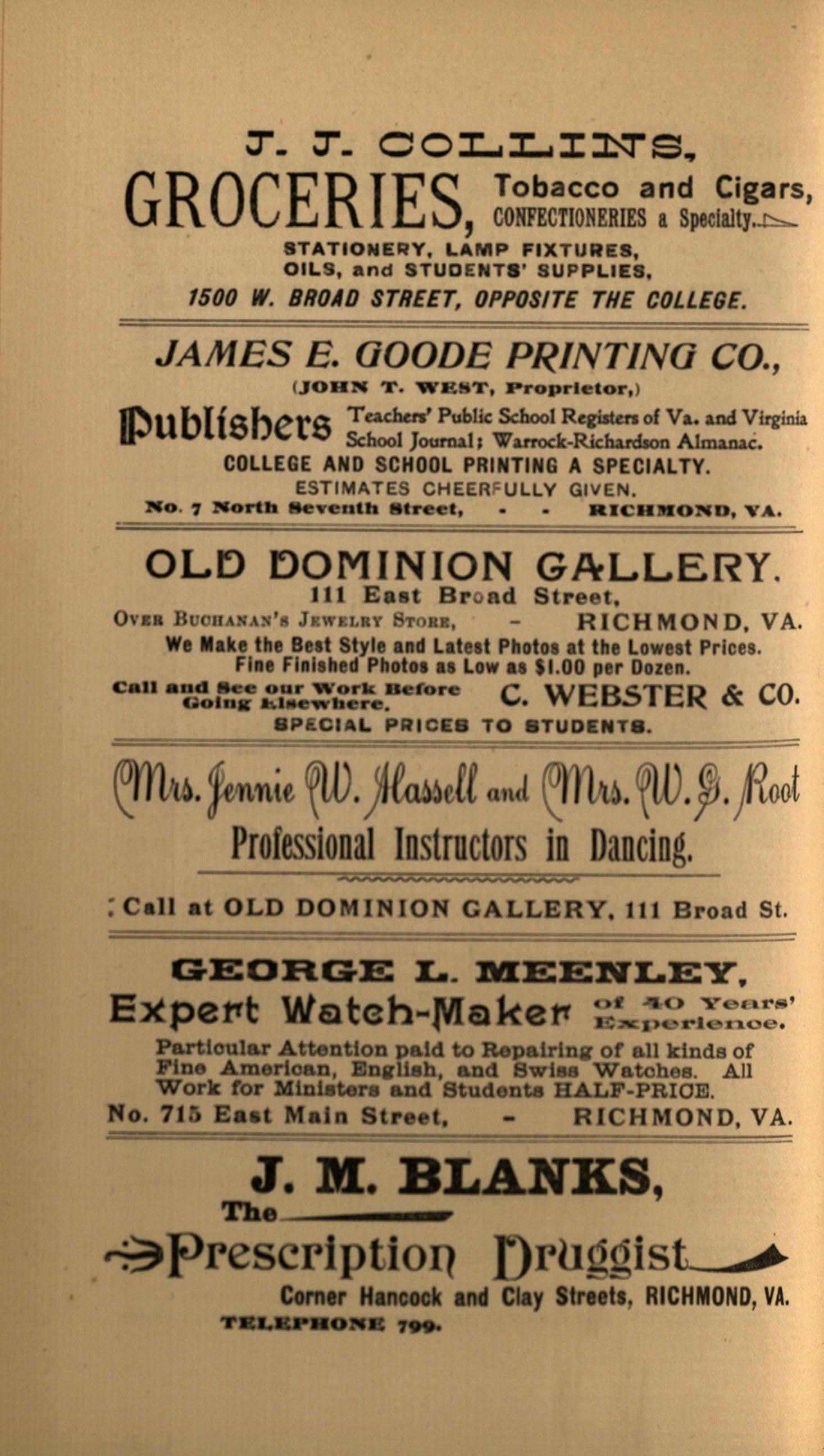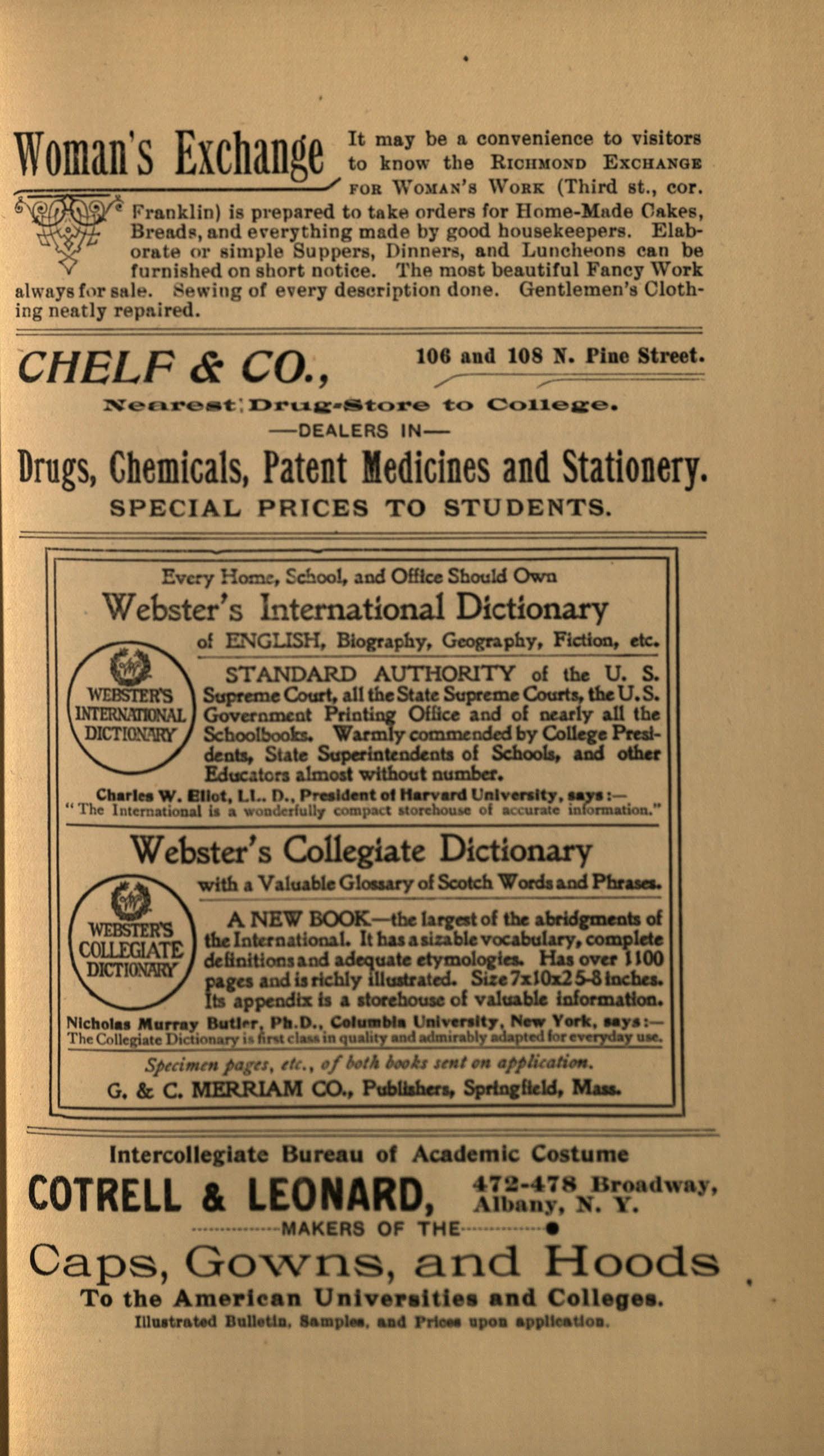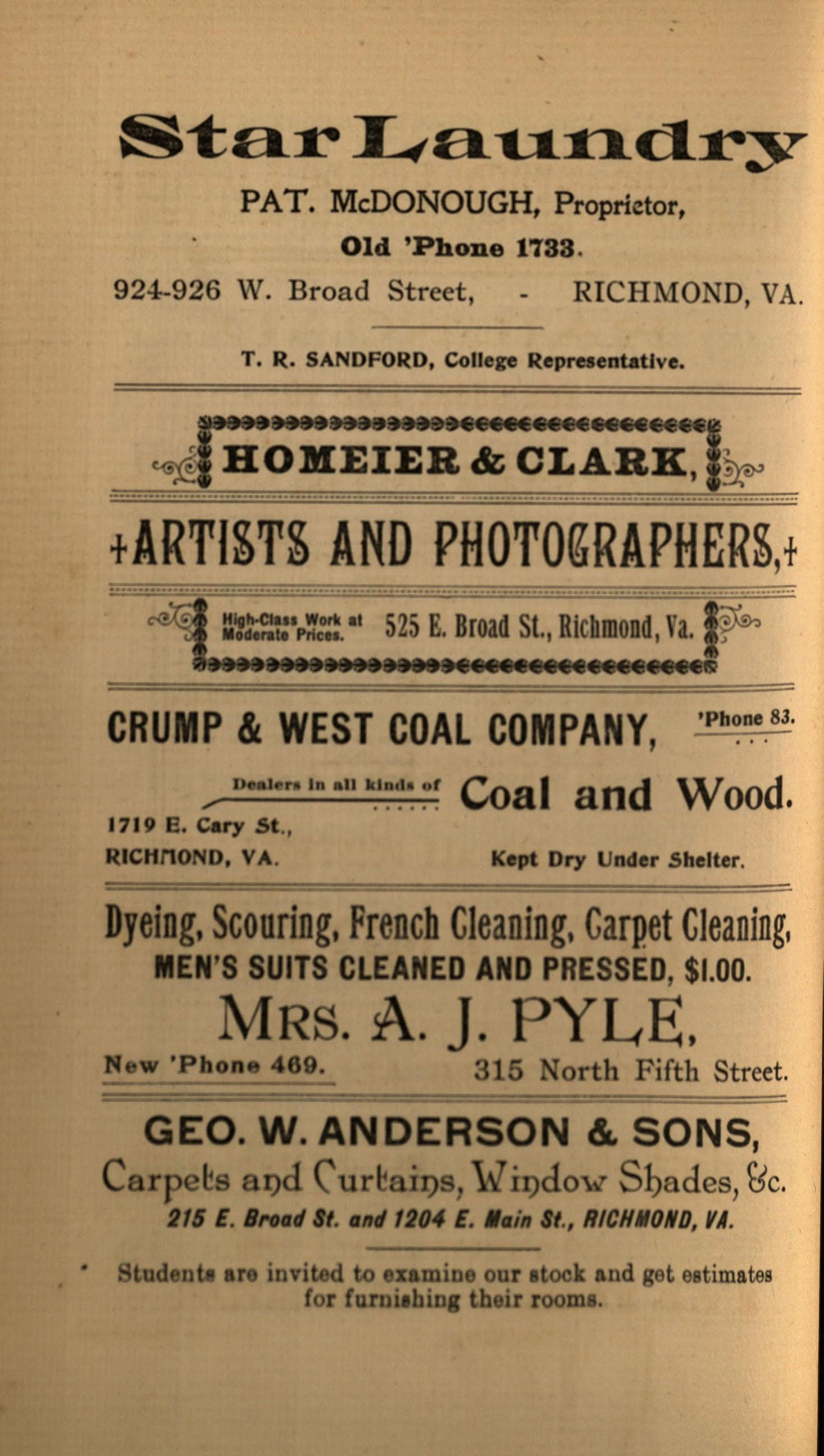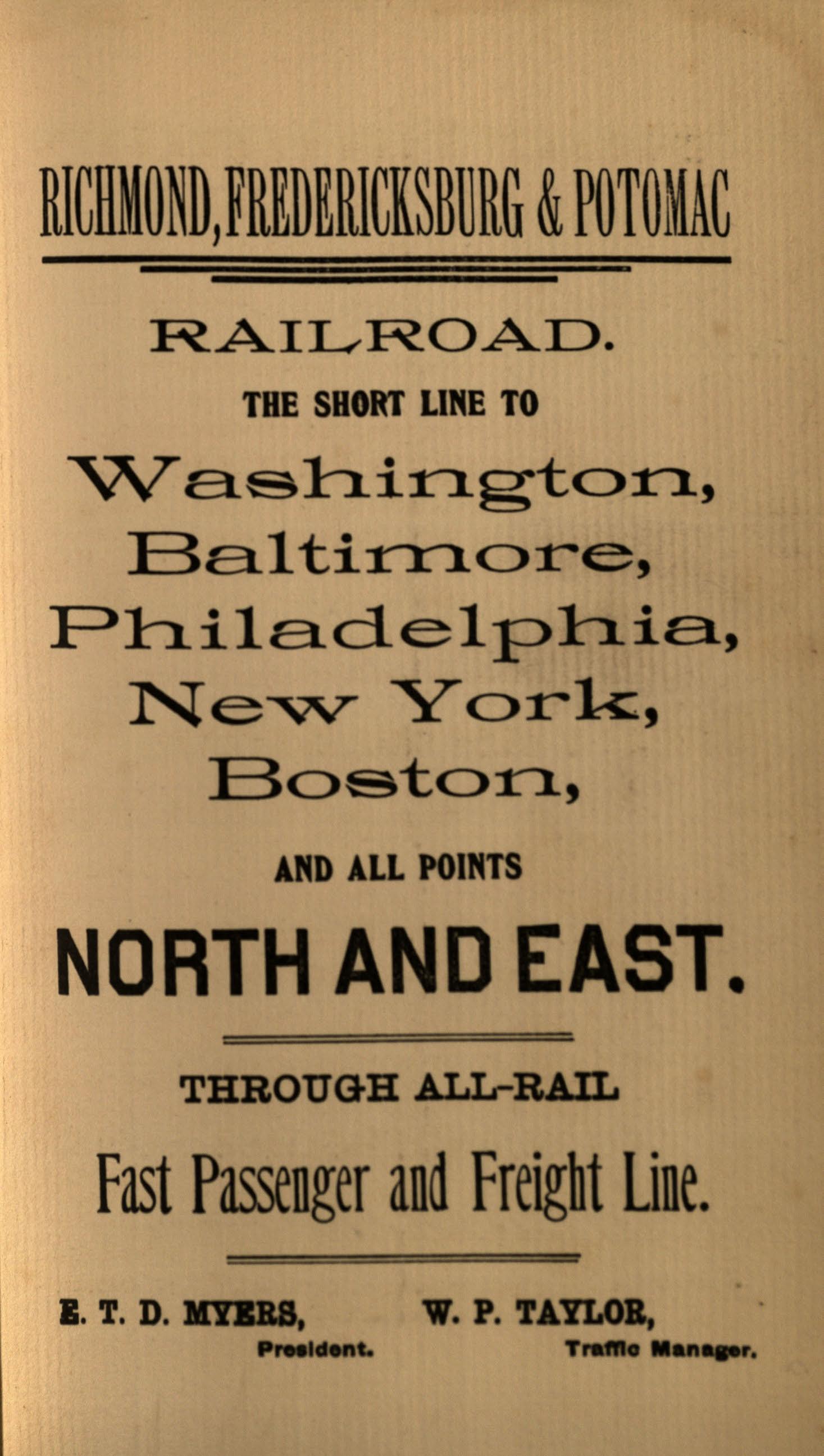r;PEGFtALHrNTEREsT
in t he PROFESS ORS a nd STUDENTS of Ric h mond College. We feel it our dnty, as LEADERS IN OUTF I TTING, to supply them with t he most serviceable and best in wear ing a ppa rel , at L OWE R PRICES than obtainab le elsewher e. We've suited this feeling to the action, and offer you your Fall an.d 'W'in.1:er Ou.1:fit, from head to foot, at l ower figur es than were ever quoted you, and allow yon TEN PER CENT . DISCOUNT off those prices. We shall expect you all in. . .. . .. .
VoL. XXVI. JANUARY, 1900. No. 4.
Jabez Lamar Monroe Curry.
When the new buildings at Richmond College were formally opened ovember 17, 1899, Dr. J. L. M. Curry declared in his address that he felt that he could say, after the manner of Queen Mary concerning Calais, that when he died " Richmond College " might be found graven on his heart.
It shall ho the object of this brief sketch to furnish the students and friends of Richmond College some facts in the life of the scholarly teacher, soldier, and state man, who has honored the institution with love and ceaseless interest. Institutions are crystallized influences, and every stndent of Richmond College is made better day by day becanse of Dr. Curry' devotion to the institution.
Jabez Lamar Monroe Curry was born June 5, 1825, in Lincoln county, Ga. He graduated nt the University of Georgia in 1 4:3, and at the Harvard Law chool in 1 45. At Harvard he was a cla s-mt1.teof Rutherford B. Hayes, Anson Burlingame, and of others who afterwards became distinguished in the councils of the nation. In 1 46 he served in the Mexican War with Hay s Texas Rangers. Returning from tho war, be represented Talladega county in the Legislature of Alabama in 1 47, 1 53, and 1 55. While a legislator he advocated, with signal ability, internal
For the first half of this sketch fr use has been made of an article by 0. H. Ryland, D. D., in" History of Georgia Baptists," 1881.
RICHMO c D COLLEGE ME ENGER. improvements and public education. In 1856 he wa s a presidential elector on the Buchanan ticket. In 1857 he wa elected to Congress, and re -elected in 1 59.
During the years immediately preceding the Civil War such men as Conkling, herman, Lamar, tephcn s, and 0. F. Adams were me mbers of the Lower Hou e . The yonng congressman from Alabama made his first pce ch in Congr ess February 23, 1 ' 5 , in favor of the admi ssion of Kansas nnd er the Lecompton Consti t ution. In reviewing thi s speech, Horace Greeley declared Mr. Cnrry to be one of the ri s ing statesmen of the outb. Thi , too, at a time wheu outhern oratory and statesmauship were world -famed.
It was not long before Mr. Gurry came to be recognized as one of the most eloquent and fen.rless lead e rs of his party, and whenever be rose to peak bi s word s commanded .the atten t ion of tbe whole House. He spoke again t squatter overeign ty, on retrenchment, on the tariff, on the progre of anti -slav ery, and other current national questions. Perhap s bis abl est effort was in opposition to the bill granting pensions to the soldiers of 1 12. His convincing lon-ic and per ua sive eloquence compas ed the defeat of the bill.
Before the sece sion of labama, in 1861, Mr. Onrry was appointed a delegate to th convention in ontgom e ry, and in August of that year was elected to a seat in the Congr ess of the Confederate tates. Ile wa chairman of the Committee on Commerce, and at one time peaker pro tempore. The stirring addre s to the people of the Confederate tate , signed by every member of Congre , wa the production of his pen. He was a member of the committee which drafted the Con· stitntion of the Confederacy, and bore the relation to this historic document which fadison bore to the Constitution of the nitcd tatcs. pon the adjournment of ongrcss Mr. Curry join d the army under n. Jo ph E. Johnston, and held the rank of lieutenant-colonel at tho clo o of the war.
In 1 65 Colonel Curry wa elected Pre idont of Howard Col-
Dn. J. L }L O RRY.
JABEZ LAMAR MONROE CURRY. 123
lege, the foremost Baptist institution of Alabama. He had made a public profession of faith when he was twenty-one years of age, and bad been baptized by Rev. Samuel Henderson, D. D. Throughout the years of his public service he had been active in Christian work, and it seemed to his brethren in Alabama eminently appropriate that he should assume the leadership in Christian education. T,vo years later Mercer University marked the success of his administration by conferring upon him the degree of LL. D. This degree was also conferred upon him in 1887 by his alma mate1· in Georgia. In 1868 Dr. Curry accepted election to the newly-established professorship of English in Richmond College. As was to be expected from bis scholarship, bis skill in the art of expression, and his love of young men, his success was immediate and brilliant. One is reminded of the manner in which General Lee drew young men to bim when be nccepted the presidency of W asbington College, now Wa hiooton and Lee University. Subsequently, and in connection with his work in English, Dr. Curry tangbt philo ophy, and for two years delivered courses of lectures on constitntional and international law in the recently-founded Law School of the College. One who knew him well says that Dr. Curry's popnlarity at Richmond College was unbroken from tho day of bis inauguration to his resignation, on the 7th of February, 1 1. He now accepted the general agency nnd supervision of the munificent gift of George Peabody to outhern education, a position he still holds, and in which he bas won international distinction as a wise administrator and educational leader. His nomination to this important post was moved by Ulysses S. Grant and seconded by Rutherford B. Hayes. To the management of the Peabody Fund was Inter added that of the later Fund for the education of outh rn freedmen. Such was th eminence to which Dr. Curry had now attained in pn blic affairs that many positions of trust and honor were earnc t]y offered him. II refusQd a place in
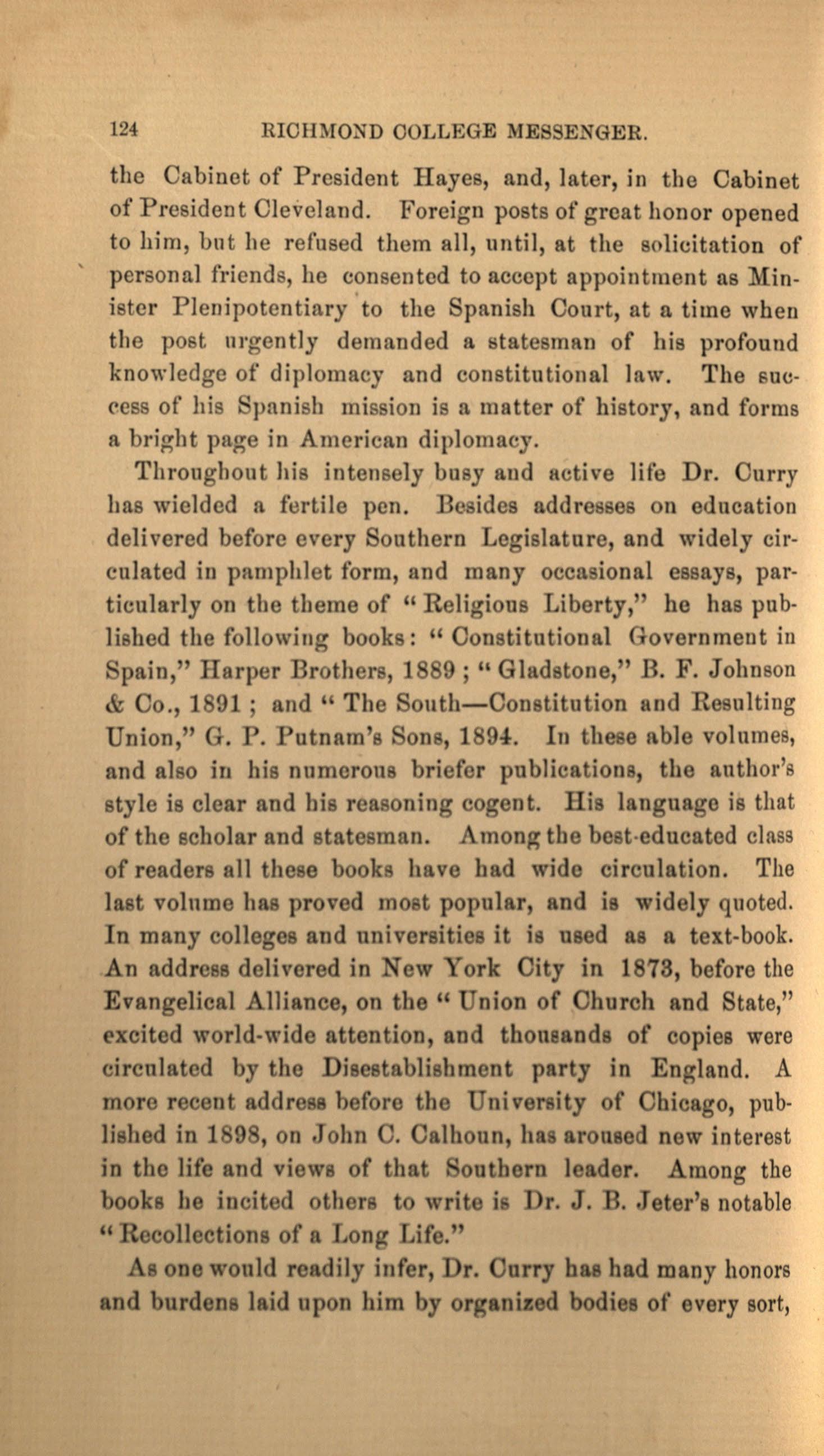
RICHMOND COLLEGE ME Ei: GER.
the Cabinet of President Haye , and, later, in the Cabinet of P1·esident Cleveland. Foreign posts of groat honor opened to him, bnt he refused them all, until, at the solicitatio n of personal friends, he consented to accept appointment ns Minister Plenipotentia1·y to the panish Court, at o. time when the post nrgently demanded a tatesman of his profound knowledge of diplomacy and constitutional law. The sucress of his pnnisb mis ion is a matter of history, and forms a bright page in American diplomacy.
Throughout hi intens ly ba y and active life Dr. urry has wielded a fortile pen. o ides add1·es es on education delivered before every outhern Legislature, and widely circulated in pamphlet form, and many occa ional essays, particularly on the theme of "Reli ions Liberty, he has published the following books: " Constitutional overnment in pain, Harper rothers, 1 · u Gladstone,' B. F. Johnson r o., 1 91 · and' The outb-Constitution and e olting Union,' . Putnam s on , 1 94-. In th e able volumes, and also in his numerous briefer publication , the author's style is clear and bis reasoning cogent. Ilia lan na o is that of the scholar and statesman . mong the be t -educatod class of readers all these book have had wide ciroolo.tion. The la t volnme bas proved mo t popular, and is wid ly quoted. In many colleges and universitie it i nsed as a text-book. An addr ss delivered in ew ork ity in 1 73, before the Evangelical lliance, on the " nion of hurch and State," excited world-wide attention, and thonsaod of copies were circulated by tho Disestablishment party in England. A more recent addr s heforo tho niver ity f hicago, publish d in 1 9 , on John . Oalboun, ha aroused now interest in tho life and views of that outborn I ader. mong the books he incit d oth r to writ i Dr. J. . Toter's notable "Recollections of a Long Life."
s one would readily infer, Dr. urry bas had many honors and burdens laid upon him by or aniz;d bodies of every sort,
JABEZ LAMAR MONROE CURRY. 125 which were seeking distinguished and able leadership. Let it be said in bis praise that high position and political preferment have not estranged him from t~nostentatious labors for Christianity, or shaken his affection for the institutions he served in earlier life. Like Gladstone, he has been willing to serve God both in high places and low places, esteeming no service for humanity trivial or unworthy. Herein is to many his greatest distinction. He bas been the same true man and humble Ohristian whether teaching a SuDday-scbool class in a country church or representing national interests at the proud Spanish Court.
Some of the variou iDcidental po itions in which Dr. Curry has served organized society are: Pre ident of the Foreign Mis ion Board of the outhero Baptist Convention, President of the ational Sunday- chool Convention, President of the labama State Convention, President of the Virginia apti t General A ociation, Trustee of the Mt. Vernon s ociation, President of Tru tees of Richmond College, Trustee of olumbian University, Life Member of the ociation for the Pre ervation of Virginia Antiquities, ice-Pre ident of tho il'ginia Historical Society and al o of the American Historical Society. Many other position might be named, bot the e indicate the diversity of his pnblic servico.
Dr. Corry ha been twice married. Hi fir t wife was n daughter of Chnncellor owie, of labnrun. f thi union two childr n wore born, a son and a dauO'hter. The son, Manly B. Curr , married the dnu hter of nator aeon, of Georgia, and is at pre ent rvin in the Phillipine , with the rank of major. Th dnuO'htor m rriod Rov. John B. Turpin, D. D., and urviv d b a dnn ,btor, Mi Mary Lamar Turpin.
Dr. Cnrry pre <mt wit i a daughter of Mr. Jame Thomas, Jr., a distingui bed citizen of 1 ichmond and a most liberal benefactor of Richmond ollc .
126 RICHMOND COLLEGE MESSENGER.
With splendid physique, disciplined powers of body and mind, broad sympathies, rich culture, and lofty Christian character, Dr. Curry is to-day one of the foremost men in our great country. His counsel is sought by leading educators from every section of the U uited tates, and bis voice is heard with delight in every assembly in which he will consent to appea1·. In his home at Washington City gather not infrequently the most distinguished ambassadors and ministers of foreign countries, as well as our leading Cabinet ministers, senators, and representatives. In all the goodly company there is no one more noteworthy, more honored, or more loved than the subject of this sketch. F. W. B.
Reuben H. Garnett, Man and Teacher.
the fall of 1882 th re came to Georgetown, Ky., a young Virginian who bad lately graduated from Richmond Col• lege. Be had been called to the chair of reek in eor11etown College, to succeed the venerable Danford Thomas, LL. D., who, after a continuous service of more than forty years in that chair, had entered into bis rest. Reuben H. Garnett came fresh from the inspiring influence of that great teacher, whose memory so many oothern boys call ble sed-H. H. Harris. Professor Harris wrote thnt arnett was a Chrjstian, a. gentleman, and a remarkable scholar-all of which the students at eorgctown soon came most potently to believe. For six years Professor arnett performed with conspicuous ability, and with a conscientious devotion amounting to a sort of scholastic consecration, the duti of his important office. At last, however, warned by eminent phy ioians, whom he had repeatedly consulted, that, nnle he shou1d take a long period of ubsolute r t, he would urely pay with his life the penalty for his over-application to hi work, he resigned. Returning to hjs irginia. homo, he eonght rest and health.
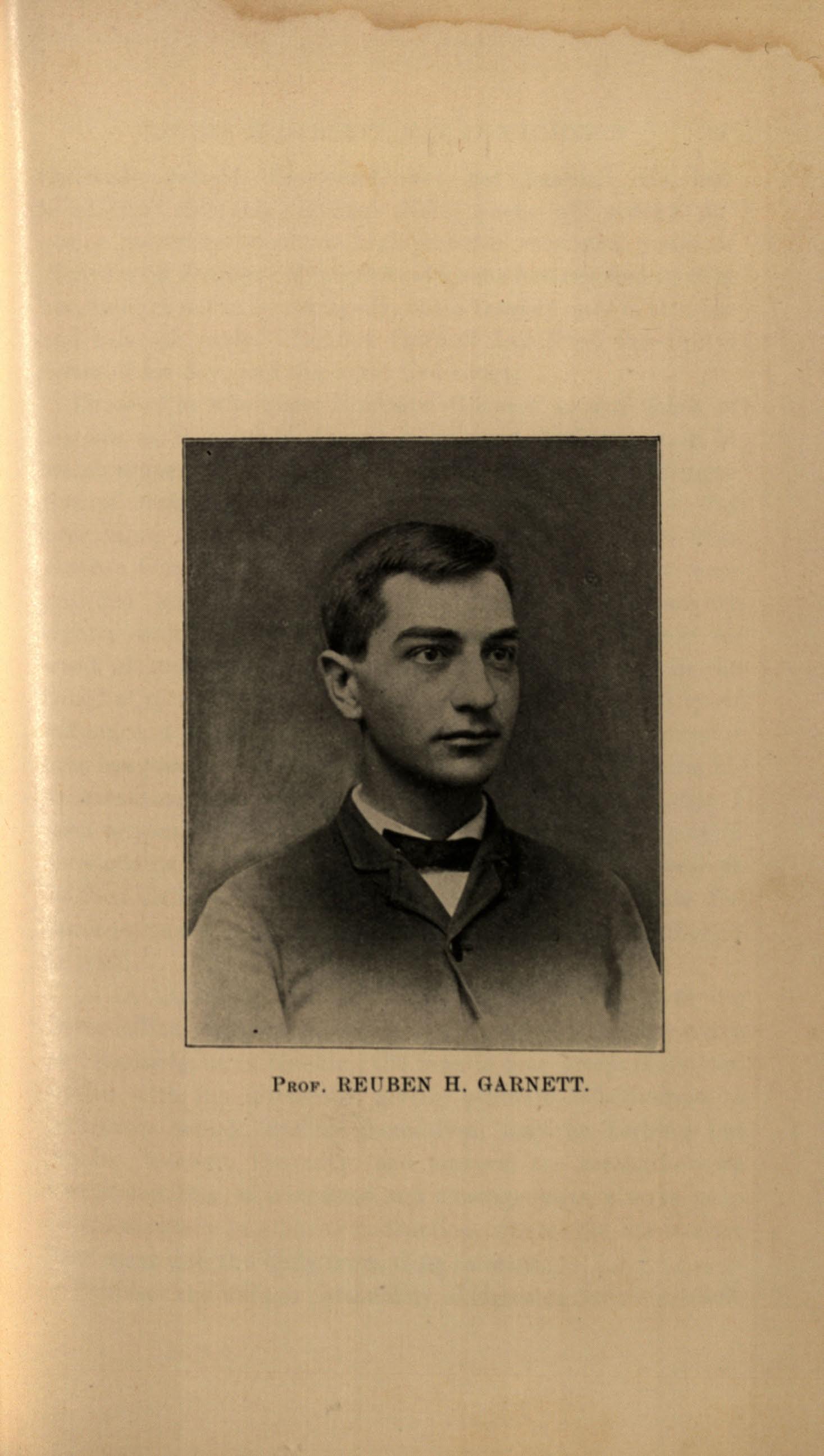
PttoP. HEl BJ,;r H. G R ETT.
REUBEN H. GARNETT, MAN AND TEACHER. 127
Quietude, indeed, he found, but not health. He had lived too intensely during those years of ardent de votion to study-years of high-pressure existence, years of Sturm und nraug. The spiritual drama had reached its fifth act, and proved to be a tragedy; but a tragedy only in that the end came so early. Reuben Garnett had lived the twelve hours of his day, and the night bad come.
Those of us who knew Professor Garnett do not think of his life as incomplete, except in a mere temporal sense, in which sense it ,vas indeed tragical, and in its ending suggestive of broken columns. But no life, I verily believe, was ever more complete within its allotted span of years than Reuben Garnett's, for no life was ever more earnest or more crowded with noble thouahts and deeds, and by these we rightly estimate completeues . Aside from the heavenly reward of such a life-and surely this man sits high in the world of spirits-there is such a thing as an immortality of influence, a living again in minds made better by a presence that has pn ed and left men s visions vaster. It is of the intellectual and moral influence of Reuben H. Garnett that I wish to speak-the influence which he exerted especially upon tho students t Georgetown during those years, tho impressions be then ma.de a viewed in their right perspective at this dis. tance by one who , ill endeavor to make feeling a hand-maid 'to truth.
As in literntur the por onality of the author gives the flavor called styl~, which ma.kc a piece of ,vriting attractive and readable, o in tcachin"' the man is over in eparably connected with tho in tructor giving ultimate offectivonoss to utterance which, within th in olvc , may be nothing but words. a.rnott tho man and Garnett tho teacher-these two go together, a character and me ago have always been complementary in all tru in trnction, where the life is more than meat and tho body more th u raiment.
Subtract the uniquo por onality of ocratcs from his teach-
RICBMO D COLLEGE ME SE GER.
ing , even in the second-hand state in which they have reached us, and it would be difficult to account for Pinto; foil to take into account the man belard, and the enthu iasm of the thousand of students who gathered a.bout him, seems mere insanity; ignore the man Th omas Arnold, considerin only his words, and explain the golden aae of Ru by; remove Mark Hopkins from tbe end of the log, aud nb titute a human philological word-lis t, and Garfi eld s Woodland Uni ve ity would make a good sleeper in tho foundation of the village school-hou . Life i our ma ter. Ile i the gr at teacher who makes a student feel that a mans reach should exceed bis gra p . '
Around enben H. arnett th e re was an atmo pbore of electric nervous ener y. He was a m n of iuton e a.roe tne . Hi very hand- hake g ave on c nfid nc in the man and led one to feel: "Hero is man f pow r, of candor a hater of hams· a man f will, , ho tand , in th implici ty of truth, for what i right· am n of ·on ci n · , who bn t he courage of deep conviction and tb vit I n r y to r ali ze them. ' Hi gr eting a •ordial, wh I - ul d, full f th at old-fa hioned court y f th 1r 1111a ntl m n. Hi d ptoned voice, omotim s tr mul oua with tho play of vari d emo· tion , utter d lowly nd t ling! th ntim nt f n. bighearted, humbl -spirit d man. \ ho of us •nn for t liis peculiar emil l It li ,h ed up hie ntire ftl • , ntt rly trans· forming hi u nally v r ly riou c nut n n · . !Io, his dark ye hone wh n, looking you atrni ht in th t: ce, he amil d hi imp! grc ting
For v r 1 u I wn a member of hia unday-cbool cla t the Dupti t •Jmr ·b. It was hi&habit ov ry uuday moruin , b for b ginnin tho 1 son, to abak band with a ·h m rub r of th clu . It w worth going to tho cla to got th t hand - hak and emil . There wa nothing me ·bani ·al about it· a ·h b • f It that Profe. or arnett wa p ci lly glad to him that day.
Thi& leads me to &peak of the d p religious uaturo of the
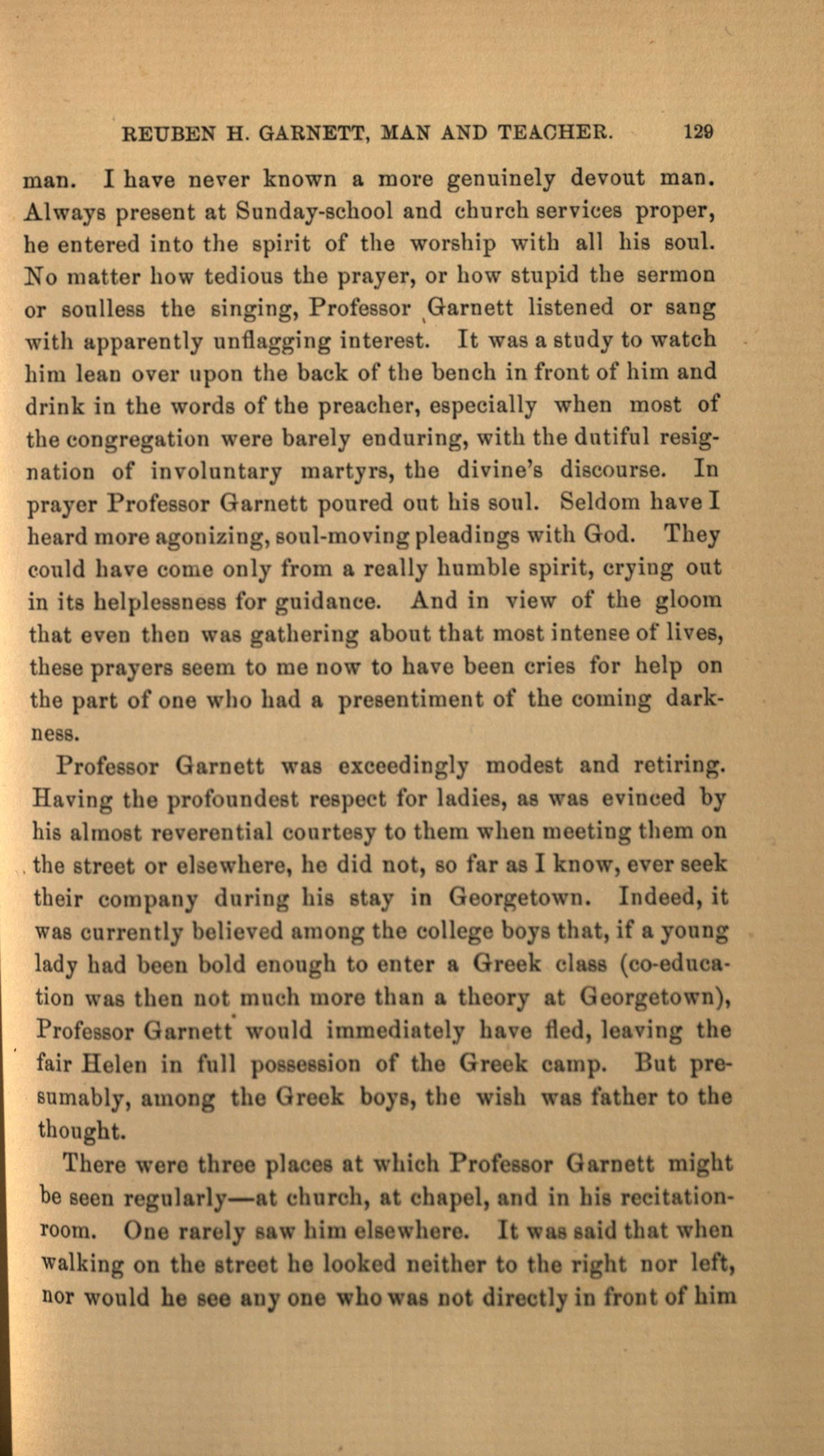
REUBEN H. GARNETT, MAN AND TEACHER. 129 man. I have never known a more genuinely devout man . Always present at Sunday-school and church services proper, be entered into the spirit of the worship with all his soul. No matter how tedious the prayer, or how stupid the sermon or sonlless the singing, Professor ,Garnett listened or sang with apparently unflagging interest. It was a study to watch him lean over upon the back of the bench in front of him and drink in the words of the preacher, especially when most of the congregation were barely enduring, with the dutiful resignation of in oluntary martyrs, the divine's discourse. In prayer Professor Garnett poured out bis soul. eldom have I heard more agonizioo- soul-moving pleadings with God. They could have come only from a really humble spirit, crying out in its belple ne s for guidance. And in view of the gloom that even then wa gathering a.bout that most intenee of lives, these pra ers seem to me now to have been cries for help on the part of one ho had a presentiment of the coming darkness.
Profe sor arnott was exceedingly mode t and retiring. Havinrr the pr fi unde t re pc t for 1adie , as wa evinced by his a.lrno t rev r ntial courte y to them when meeting them on . the street or el s ewhere, ho did not, so far as I know, ever seek their company durin"' hi tay in orgetown. Indeed, it was currently b li ved amon the collc e boy that, if a youo .... lady had b n bold enough to nter a reek cla (co-education was tben not much moro than a theory at Gcor etown), Profes or arnctt ' would imm diately have fled, leaving the fair H len in full po ion of the Gr k camp. But presumably, amon the reek boys, the wi h was father to tbe thought.
There wero thr place nt which Profe or Garnett might be seen re ularly-at church, at ·hap 1, nd in hi r citationroom. no rar •ly w him l wh ro. It w aid that when walking on the tr ct he look d n ithcr to tho right nor left, nor would he eo any on who was not directly in front of him
RICHMOND COLLEGE MESSENGER.
in the line of his vision. All this serves to illustrate his absolute de\""otion to study and his wonderful power of concentration. It is said that he would become so absorbed in stud y that in the coldest weather he wonJd often sit in his room withont fire, utterly forgetful of the necessity of replenishin g the grate. This intense devotion to work, in season and ou t of season, sapped his strength and ha tened the final collap se .
As one of his pupils I have often asked myself, "What d o I owe to Reuben H. Garnett and with a brief answer to that question I must bring these scattering impre ion s to a close.
As a teacher Profe sor Garnett was terribly in earnest. In the class-room be was full of life. He kopt things in moti on ; there wa no sleepiness. The students had to think fast and talk fast, or they would, figuratively speakin11, 11et run o ver. reek was expected to meet Greek. I recall , ith won der bow I used to read, under the spur of arnott a " Well !" "Well I ' "Go ahead ' ' , air ' 'Ri bt ahead I " as many as ten lines of Homer, "sight unseen as the boy s say, lighting occasionally in my flight on some eln: tic word which acted as a springing-board for my ne t leap. Thats the way we wont through Homer. Profe or 'litchell, of Richmond , will vouch for it. In a word, Profe or aruett in tho cl assroom was dramatic, in the ori inal sen e of active. Ile sometimes assnmed the different role, in r ek tragedy, nod proceeded to a.ctthem as vividly(and hn11Isay,n pi tur quely i) as hie co tume permitted. 11 ldom laughed, xcept when he chuckled almost audibly over ome grim r k joke, over which the boys smiled sardonically or meditat d in fun e real gloom. The insults of Lidd 11and cott, or tho fiendi h glee of Goodwin or Hadl y, w r to fr h in th ir minds. Well, arnott throw hi soul into hi t aching , ttnd the boys work ed. Ho taught ns tbc high rion n of iut llcctunl odeo.vor. Ho made us see tho ancrodn of work and th vitality that dwells in what men are plea cd to c 11a dead language. He
WILLIAM R. TRIGG.
131
was the embodiment of moral earnestness. To be in his presence was to be stimulated ; and, after all, is not to stimulate, to fire with ambition, the prime duty of every teacher who bas been divinely called to his sacred task?
The intensity, the tragic intensity, of this scholar's life left its lesson upon bis pupils. We feel stronger for having known and touched Reuben H. Garnett. The absolute sincerity of the man, the high consecration of purpose, which made his life a living sacrifice, the unwavering faith in the divine, and, withal, bis humility of spirit, and his willingness to spend and be spent for good-all these have made those of us who knew and understood him cherish hi memory with a sacred love, and count his influence as one of the moulding forces of our lives. And it is by a ort of poetic (or rather, academic) justice, which a.moants to a spiritual vindication, that one of Garnett's pupils is now a profe sor in Richmond Oollegc. Reuben Garnett live again, at his alma mater, in am Mitchell, who is passing on to the boys at Richmond tho intellectual influence of Garnett at eor etown. The wheel is come full circle.
J. 0. METCALF.
GeorgetownOollege,Dec. 2 , 1 99.
William R. Trigg.
G1 AD William R. Trigg b on Pr. a.mu 1 Johnson, James Bos,vell would have b en nobody. In oth r word , the president of Richmond gr at bip-buildinn, plant i not a man who seeks publicity, nor will h di cu hims lf with those who, liko tho p stiforou "Bozzy, go forth, note-book in hand, to chronicle the virtu of oth r . {r. Trig.,., work are his monument , nor will ho embelli h them with in crip• tions smacking of self-prai . All his achicvem nts ho discusses with a kind of editorial "we," which how that he
RICHMOND
COLLEGE MESSENGER.
l acks egotism, and wishes his associates to have full cre d it fo r their part in hie wo r ks .
The \vriter bas made these prefatory remarks in order to shield himself from the sin of inaccoracy. The few facts he h as gleaned about Richmond's enterprising citizen have come from others ; for Mr. Trigg, tboogh frank and cordial in the extreme, will not talk about himself. It should not be understood, however, that he is a "veiled prophet ," who, like so many prominent bnsine s men, irnrnnres himself behind glass doors and oak partitions, aud snaps ferocioui;Jy at Jess important mortals who approach him. o the contrary, Mr. Trigg has a kind word for verybody, and bumble citizens of the " riah Beep" class would do well to approach him. They will find, instead of an austere business man, with an exaggerated sense of his own importance, a plea ant gentleman of fifty or thereabouts, with a rosy face, a gray mustache, and bright eye , that illuminate his face as he talks. If this biographor did not wi b to avoid the Boswellian adulation, be wouJd say that the ship-builder is tt handsome and a striking man. A it is, he compromi es by as erting that .Mr. Trig ,vould not pnss unnoticod nmon a hundred goodlooking people.
nt it is the mans entlrn ia m, after all, which strikes one the most-his contagious, cner otic enthusiasm which knows no such method as dilatory proc dure. Y 11 s e in the president of the ship-building company an individual who conceives and executes in the twinkling of nn eye-a man who mak up his mind and then qnita worrying. Recall the speed with which tho ship-yard wore built and the maO"nitude of the venture, and yon hav some id '\.of lr. Trigg's modws operandi . In short, ho is n. mnn who d n.l in big things; wbo shoulders hetwy re poo ibilitics nnd doos not let them weigh on his mind whon be 1 p .
cl ver business man is uo uncommon thin , but a cool business roan ie mor rar · and bor in Ii Mr. Trigg's
WILLIAM R. TRIGG.
133
strength. His mind has a peculiar (and a most enviable) ability to eschew trifles and reach the very "milk in the cocoanut" witbont undue worrying or minute analysis. In other words, he lets some other fellow worry abont the little things ,vbile he attends to the big ones. These qualifications are, of conr e, absolntely necessary in the head of an establi hment like the ship-yards. !irst of all, there must be an executive department, and after that mnst come dozens of smaller departments, and last, but hardly least, hundreds of artisans and mechanics. Ea<.:h mo.n mu·st do his duty, and in the building of a ves el mi takes are fatal.
It would be reviving" ancient history" for this writer to describe the big plant which has sprnn up almost like a mushroom on the banks of the J nmes. He can only say that it means millions of dollars to Richmond and employrpent (even nt this time) for e,·cn hundred men. Later on, when the work on the crui er " Galve ton" is fully under way, the force will be ~rcatly enlarged. All tbi is the immediate result f Mr. Trigo- s enterpri e (hi. mode t "we s" to the contrary notwitb tnuding) bnt there i no telling what the promisin future ma • bring forth. Romcmbcr, the great concern i bnt little over a year old, thouo-h even now it is recognized by tho o,·crnm nt official at Wahington as a most reliable one rn.
And, D0\\' 1 a littl abont the" Galveston, 1 in order to show its size and proh ibl o t, and theu we may again con ider Mr. Trigg for a moment. The reat war ve el to be built here will be one of six protected crui or, ordored by the a •t of Oongr appro,·ed lnrch "' 1 09. It will co t, exclusive of armnm nt n t . c ding 1,1-J..1,00, and mu t have about 2,500 tons displ:tc m nt. It will bo about 202 foot long, havo an c ·tr mo hrc dth of 4:3 feet, and probably carry 27 officer and 263 men. Th crui r armament will consist of ten 5-incb gun f 50 ·alibr in l ngth, and not l than eight 6-poundcr rapid-fir gnn to say nothing of two
RICBMO,. D COLLEGE MESSE GER
l-pounde1·s and four machine guns. Ample provision will be made for abundant supplies of ammunition, hoisting apparatus, &c .
.Almost the whole of Mr. Triggs life has been spent in business activity. Hi s father, the late Lilburn H . Trigg, was a well-kuown irginia attorney, who, during the latter years of his life, moved to Missouri, where he died. During the war, and when a boy of twelve or thirteen the subject of this sketch was a clerk in the offices of the ichmond and Danville aiJway, in Danville, a., and even then had most responsible duties. He had charge of vast supplies handled by the Confederacy, and of course gained a valuable know• ledge of mercantile pursuits. Mr. Tri was about fourteen or fifteen when the war clo ed. Just before the cessation of bostilitie be hnd gone to join Fitz Lees command, but never saw service. ftcr the surrender be came to ichmond with Mr. Edward Cohen, who for some time condnctad a brokere business and afterwards wa pr idont of a bank. Mr. Trig 0011 becnme en hier of thi in titution but left to go to ow 1 ork, wbcr he , 1 the finnncjal agent of the Richmond and , e t oint T rminnl omp ny. pon r t11roing here, l1c bccnmo 11 o<:intd with the Tnnnor , D laney Engine ompnny (now the Ri •hmond o om tire orks). y bis charact ristic plnck aud ility th ·onn man oon became vicc-prosid nt of tho big •one rn, nd lat r \VB chosen as its pre idont. The Jatt r office ho held for t n onr , though he retired from th pr idon •y wben ho b ·am tho head of the hip-building compun . llo is now ,·ic -pr id ut of the Loco· motiv Works, and has other bu inc connections involving ·arc und r ponsibility.
fr. Trigg ha no pr tical know I dg of m cbnnics, save whnt h hn gnincd hy long c p ri nc . II , n as ociated ,·1th the Lo •omotive Work wh n his cone •rn built the mnchin ry for th bnttl . hip" T a , and mu tat that time have gained con iderahl information on the ubjeot of ship-
THE ART OF LEA.YING OFF.
185 building. Indeed, he has long moved in an atmosphere of machinery and mechanics, and has thus acquired the ability to handle large matters with celerity and confidence. His friends ay-tbongh he himself is diffident about the matterthat he first conceived the idea of establishing a ship-building plant daring our trouble about enezuela, in the last Cleveland admini tration. At that time the Government sent several officials here to look into the matter, but, as the trouble in connection with the outh nierican country was adjusted, the scheme nt that ti me lap ed. The panish-A merican War gave Mr. Triag another opportunity to realize his hopes along this line, and we all know bow well he ucceeded. It should not be understood, howe, er, that even this energetic man could make the ahip-buildioo- industry in this city a success did we not have the proper faci1itie As a matter of fact, Richmond posse ses exceptional advautag for the object named, aud her future is very bri ht.
Mr. Tri a intimated in the foregoing, is a man of most attractive per onnlity and ha ho ts of friends in every circle. Socia11y ho i cqunl1y a much a occc as in tho business world. Ile i pr t-ident of the Commonwealth Club, and i everywhere known ns "a g od ti How. He i married and bae an inter ting family; bnt hi hearth- ide i not within the scope of th i nrticlc. Ind d, Mr. Tri g would probably say that he l1im lf hould not ha" b n included in its scope.
E. R. C.
The Art of LeavingOff.
~HE motto of th an i nt w , "Il t n slowly.'' But tt? in our dn · "the world i on who 1 . It pirit i rest· less and impati nt. .. l n at fa t, Ji f: t, and die in a hurry. It i a pro r , nd, in ord r to ke p pac with it, it i n c Rt· v off all 11nncc ary luggage, and, if needs b , "cut cornora. It b oven b en uggeated
RIOHMOND OOLLEGE MESSE GER.
that an appropriate inscription over the portals of our colleges and seminaries of learning would be, "Let those who enter here make haste."
It is true that sober-thinking heads tell us that the farthest way round is the nearest, surest way to success; but others say we must keep in tonch with the world if we would influence it. We mnst, therefore, make a virtue of 11ecesity, and learn "the art of leaving o:ff."
To this restless spirit of the times almost all human affairs are tedions. Everything is too long. Visits, concerts, speeuhes, essays, homilies, lectures, sermons, and even commencement exercise are too Jong.
Virtue itself is often tiresome· vice ahva.ys. Mnny things good in themselves are often entirely spoiled by being arried to extremes. och are panctilioosne s, ueatnes , the Jove of order, the labor of finish, tbe Jove of accuracy in matters of little or no moment, and zeal for religion do ma.
Tho e wbo persist in overdoing anythino- become a sonrce of vexation and 1111happiu to other . ne str k too many mars the picture. olomon says, " e not righteous overmuch." There is a. world of wisdom in this e hortation.
The chief evil hich mur the happin of mankind spring from their incapacity to }earn this sublime '~rt of leaving off.' The ten commandm nt and the ten.chin s of Christ may be snid to be l ssons in tbis art. " ease to do evil; learn to do well."
The hnman raco ha in all ages been sub· jcctcd to inculcnlable uffering on acconnt of tirubition, avarice, intemperance, aud ·ru Jt .
Lust of power bas filled th , orld with tears and blood. Had A lexandcr left oft' hi r cd f powert his thirst for fame, he would not have w pt when the fortuue of war bad left him nothing Jee to conquer. Ilnvin devoted his life to tho attainm nt of his ambitious de ir , he failed of true enc• c s, and won not tl10tru victor <:rown· for " be who reigns within l1imsclf and rules pa ion , d ir , and fears, is
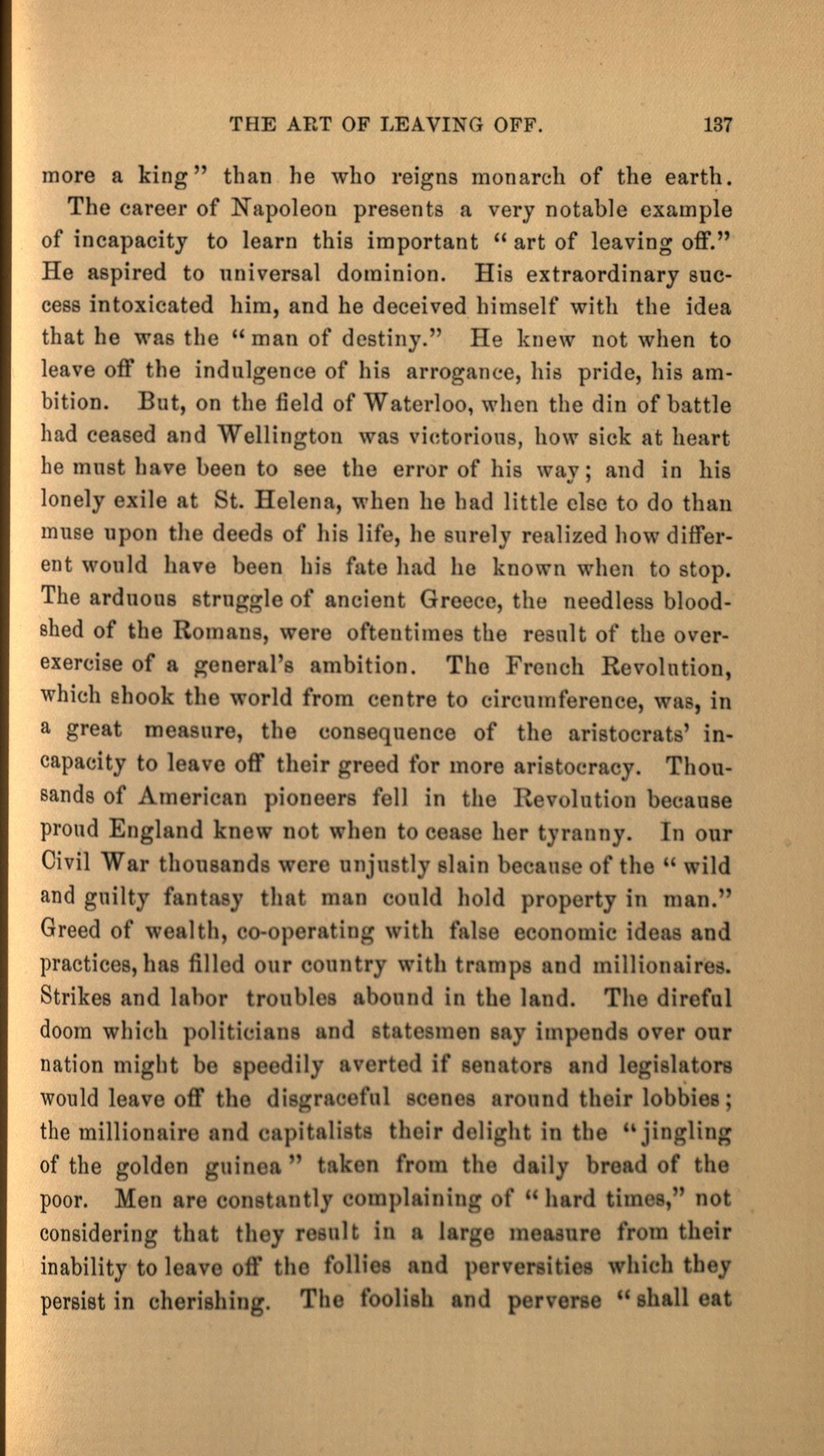
more a king" than he who reigns monarch of the earth. The career of apoleon presents a very notable example of incapacity to learn this important "art of leaving off." He aspired to universal dominion. His extraordinary success intoxicated him, and he deceived himself with the idea that he wn the "man of destiny." He knew not when to leave off the indulgence of hi arrogance, his pride, his ambition. But, on the field of Waterloo, when the din of battle had cea ed and Wellington wa victorion , how sick at heart he mu t have been to ee the error of his way; and in his lonely exile at t. Helena, when be had little cl c to do than muse upon the de d of his life, he nrely realized how different would have been hi fate had ho known whon to stop. The arduous trnggle of ancient Greece, the needle · bloodshed of the Roman , were oftentime the re nlt of the overexerci e of a general ambition. Tho French Revolution, which ehook tho world from centre to circnmferen e, wa , in a great men ure the •on equenco of the ari tocrat ' incapacity to l ave off their greed for more ari tocracy. Thousands of merican pioneer fell in the v lution because proud England knew not when to c a e her tyranny. In our Civil War thousands wer nnju tly lain becan of tho" wild and guilty fantn y that man ·ould hold property in man." Greed of wealth, •o-oporatin" with fol e conomic idea and practices, ha filled our country with tramp and millionaire . Strikes and lnhor troubl abound in th land. Tho direful doom whi •h politi •ians and tat men say impend over our nation mi ht bo p dily av rt d if enntor and legi l~tors would leave off tho di grac fol c n nronnd their lobbie · the millionaire and cnpitali t their deli ht in tho "jingling of the golden uin a" tak n from tho daily broad of tho poor. Men are con tnntly •omplainin"' of "hard tim ," not considering th t th y re nl t in a tar m aaure from their inability to leave off the follio and pervcr iti which th y persist in cherishing. Th fooli h and p rvorse "shall cat
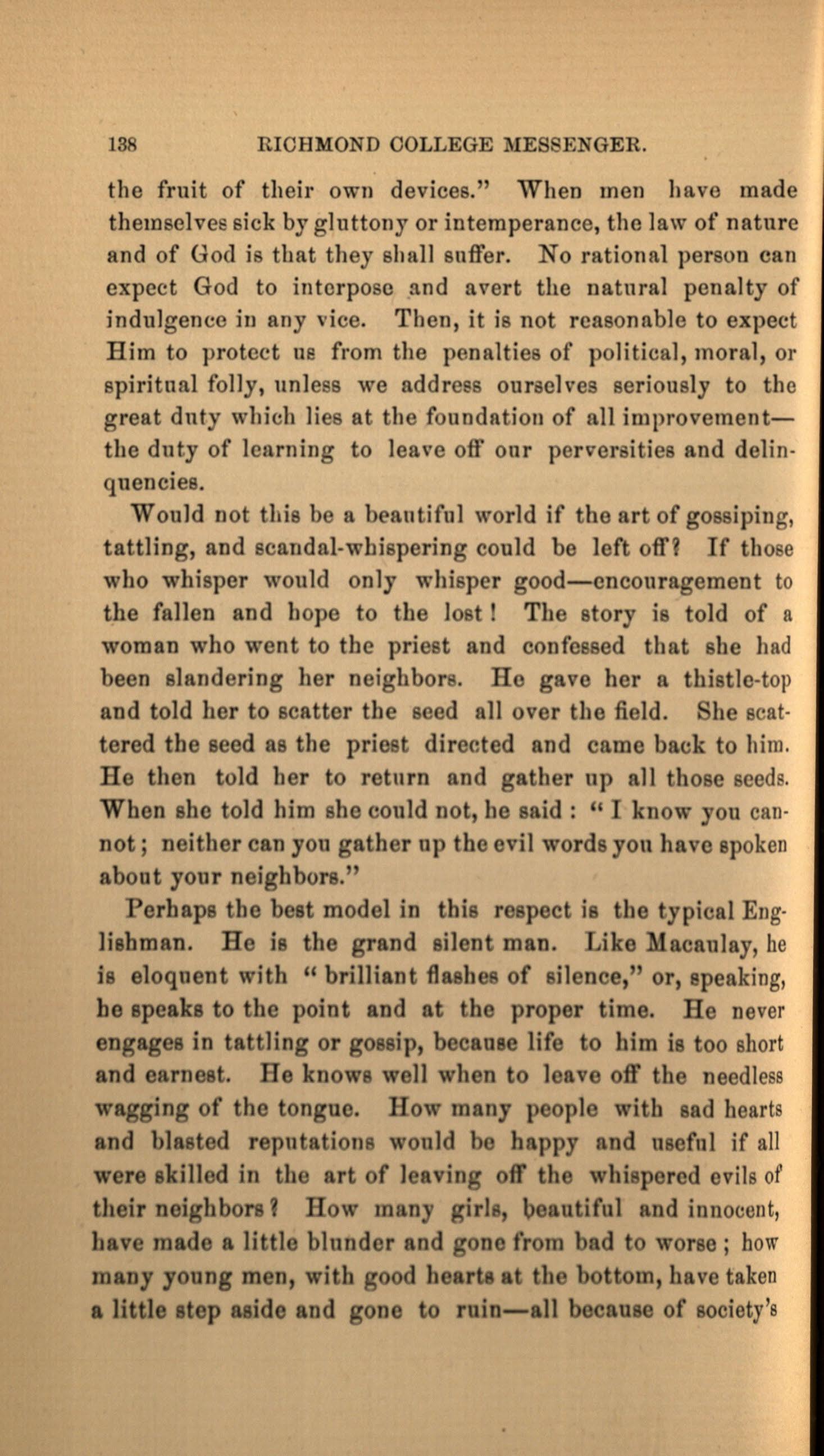
RICHMO D OOLLEGE ME E GER.
the fruit of their own devices. When men have made them elve sick by gluttony or intemperance, the law of nature and of God i that th y shall suffer. o rational per oo can expect God to interpose ::i.nd avert the natural penalty of indulgence iu any \'ice. Then, it is not rca onnble to expect Him to protect ne from the p naltie of political, moral, or spiritanl folly, un]e s we addree ouraelves seriously to the great dnt which lie at the foundation of 11improvementthe duty of learning to leave off onr perver itie and d linqnencies.
Would not this be a beantifal world if the art of go iping, tattling, and scandal-whisperin could be left otn If tho e who whisper would only whi per good-encouragement to the fallen and bope to th Jo t The story i told of a woman who went to the prie t and confes ed that be }ind been land ring her neighbor . H gave her a thi tic-top and told her to scatter the ed 11over the field. he scattered the s ed as the pri t directed and came back to him. H then told her to return and ather up all tho e eed . When she told him he could not, be aid : 'I know ou cannot; n ither can you gath r op tho evil words yon have spoken about your n igbbors.
Perbap the beet model in thi r poet i the typical Eng1iehman. He is the grand eiJen man. Like acaulay, he is eloqu nt with "brilliant fla h of ii nee, or, speaking, be speaks to the point and at the proper time. He never engage in tattling or go ip, b cau e life to him is too short and earnest. Ho knows w 11wh n to 1 av off th needless waggin of tho tongue. How many p op! with nd hearts and bla ted reputations wonJd h happy and n cfnl if all were skill d in th art f 1 aving off th whi pored evils of their neighbors 1 How man girl , b utiful and innocent, have mad a little blunder and one from b d to wor e; how many young men, with ood hear at th bottom, have taken a little step a ide and one to ruin-a11 be au e of society's
THE ART OF LEAVING OFF.
139 never-ending gossip. Let u remember that the Master has said that "every idle word that men shall speak they shall give account thereof in the day of judgment," and leave off the devils a.rt of go sip and slander.
This art of leaving off may be improved upon in the literary world. Writers of work of imao-ination and a.mu ement are often open to the charO'e of not knowino- when to leave off. An author will write a work \Vhich tickles the popular fancy. He finds the bu ine profitable. Ile pour ont volume after volume, until his most devoted admirer grow weary of him. The name of this cla s of writers is le .,.ion, and the most greedy and indu triou reader could not even skim through their books in a life-time. ir Voluble, givens omething beside 'word , ,vord · keep your skimmed milk, nn<l give us the ream. Let "brevity be the soul of your wit,' for "life is short and time i fleeting. The be t book is the one that ay lea t nod sn?"ge t mo t ; that make yon think, instead of thinking for you. The power of repo e, the re_serve power of \10' 17 tion, i often gre tor in b ok, or e ay, or sermon than ·pr ion it elf. Many good ermons are injured or poiled by bein spun out. Fruit feeds better than flowers. ive us "e enco of meat," and leave off the "linked sw tn n drawn out.
Tho art of lcavin off many have partially learned; few thoroughly.
The p almi t David wa uilty of ome terrible in , but, by the gra e f od h l ft th m off, and I\Cquired tho title of " tho ml\n aft r od's own h art. P ul wa enabled to rid himself ot' th d 1 r to nd 1- ll-ni"'h in ·ura.blo vice of Pbarisai m. Th z nlou p r cutor of tho follower of Christ him elf b came tho chief of tho a.p tl , tho chief of missionarie .
Our own c uutr · ha pr du• d a man who could learn this great lea on· who knew , h •n hi work wa don · who e moral greatnc on bl d him to t a id th prompting of
140 RlOHMO D COLLEGE ME SE GER.
ambition and the temptation to exercise kiugly power. The name of Washington is revered by the friends of human freedom the ·world over. He was one of the few masters of the grand, sublime "a1-t of lcaviug off." If this difficult art were more folJy appreciated, and its principles instilled into the miuds of people, many of the extremes which result disastrously to hnmanity would be avoided.
There would not be so many records of premature death s, so many inmates of insane asylums and penitentiaries-indeed, there would be no such buildings. o many men, in their eagerness to do something great-to be great-exceed their own resources, over-tax their strength, whip life into a fever, and hasten their tragic end. The conclusion of the whole matter is this: Life is a paradox-one great contradiction; humility is greatness.
The higher life is the golden mean. The middle way is the way of truth and wisdom. Extremes a.re tbe ways of error and folJy. Everythin has Jimitations, beyond which it is not safe to pass. Then leave off dissipation, fast living, skepticism, vice, and Jife stretches out before us Hke a fair land of promise, every foot of which may bo ours. But, living to sense and the world and self, we shall burn out tbe spirit-lamp before we reach the noon of life, drink the bitter waters of disappointment, and sadly say, with Byron: " Iy days 11,rein the yellow leaf
The flower, the fruit of life i gone; The worm, the canker, and the grief Are mine alone."
Letterfrom ColumbiaUniversity.
Cotu »u. NIVERSJTY EW ORK OtTY. R. EDIT R,-Owiog to wonderful inventions, it is now on]y n step from mcrica to Europe. If you once take that stop you expand, yon trotcb out, you experience an in-
LETTER
FROM COLU~1BIA UNIVERSITY. 141
valuable addition to something already possessed ; that something is better felt than defined-culture is near it. It is only a step from Richmond College to Columbia University. Yon are fully repaid. But, remember, it is not that step which necessarily affords the best view. During the recent Queen's J nbilee I watched the proces ion from a seat for which I paid five dollars. ome friends saw everything for nothing. Some ew orkers paid a hundred dollars to see Dewey. I saw as much as they. It's the iiame way all over; try, and you can see jnst as much as any one else. If you read an exceptionally fine book, you have the same experience-an addition. It's cultnre striking you, but don't fear, for H's only a love tap; you will wish for more. Thus additions come from various sources· but you must lend a helping band. Some are too greedy, and grab; they become fanatics. Others are lazy, and "flunk"; they "keep peanut-stands." The majority are struck on a tender spot; work and conquer culture.
The location of Columbia University is similar to oursthat is, it is about the "end of creation ' when you think it is time to go back after a call on Miss ---ew York is about ten tim larg r than Richmond. We have about one tenth the number of olumbia. Its big. My class numbers about one hundred and seventy-five-all in one room. The men come from all sections of the country-my class has five Ge rgians. The number of high collars and glasses is not as great as mi ht bo e ·pected, however.
I have not seen any snow-battles yet. If the attendance on foot-ball gam afternoons i any criterion, they are faithful workers. Th y impre Sontberners a cold, although some are quite friendly. I noticed that Dr. Landrum is credited with saying in a recent sermon that the men in the Northern and Western univcr ities were" going to hell fa ter than a mile a minute." I do not believe that there is such a great difference between tho orth and outh.
142 RICHMO "D COLLEGE MESSENGER.
The buildings are substantial, perfectly equipped, and ventilated. It is almost impossible to catch a cold. The centre building is the library-the gift of Dr. Low. In this building, besides the general library, are the Law School, School of Political Science, School of Philosophy, and the special libraries. At the right places yon :find coat-rooms, locker-rooms, smoking-rooms, shoe-black s, and so on. Once, while sitting in the Richmond College library musing, (or, as some wit has put it, "flirting with the mummy,") I was ap• proached by one of our students, who seemed to be rejoiced at seeing some one doing nothing. I divined that something was wanted, so I inquired if I could be of any assistance. He wished to know if any one could take books from the library. That man had been at CoUege six months and bad not drawn a single book. At Oolumbia snch a thing would have been impossible. The library is the general work-shop; the books are your tools; the lectures make you use these tools to better advantage. Work you must, for this building is so skilfully arranged that once within it you are miserable without doing something. It is ,vell lighted, and yet there are no windows to look out of. ays may pass and you might not know if it has snowed or been the most beautiful day which has ever dolighted man. Everything is near at hand, so you are free from interruption. If a book is needed, you write the title upon a slip, hand it to one of the librarians-presto, your book appears. The special libraries a.re run on the same principle, the work being done at tables. Tho law library is always busy, day and night. I estimate that over a thousand volumes are daily referred to. Don't go near ii you a.re not inolincd to work. It's far from dry and disagreeable, and then we have diversions. Every one but a philosopher will tell you that law is inclined to be a little dry; all students are not philosophers, so sometimes they forget their worldly troubles in sleep. Who ha n't a kindly feeling towards the man who had a good time the night
A HARVARD LETTER.
143 before 1 They are still boys, and are al ways helping to arouse a companion most gently from sweet dreams. Lawyers have good taste, pretty stenographers, and frequently take a peep into some of our books. We meantime take a peep into somebody's eyes. The last one's were a beautiful blue.
You are not compelled to keep to your own library-in fact, the others are thrust upon you so that, although "you have all the time there is," you really wish for more, and sometimes find it. Your own lectures are what you want most. The others frequently appear so tempting that you steal away. It's shameful, but who can resist ice-cream 1
Oliver Wendell Holmes says, other things being equal, he prefers a man of family, meaning a man who is about as near a nobleman as mericans allow; so, other things being equal, I prefer a college of family, a college with unlimited resources. But remember, some paid exorbitant prices, but I saw Dewey just the same.
Yours sincerely,
A Harvard Letter.
5 KIRKLAND STREET,}
CAMBRIDGE,December 16, 1899.
RR EDITOR,-! received your letter several days ago, and enjoyed it. There was never a time in my life when I took so keen au interest in ncle Sam's letter pouch. This would sound strange, no donbt, to those good people who are in t]10 habit of thinking that one whose lot has been cast in the neighborhood of Boston and Cambridge should want no other earthly thing. But I have got into a decidedly cooler atmosphere (in moro senses than one), and, but for this little "gulf stream" that flows into my life from tho sunny Southland, in the way of letters and papers, I'm afraid
VIVIAN MEREDITH MYERS.
RICHMOND COLLEGE MESSENGER.
my spiritnal, if not iotellectnal, machinery would suffer from " freezing of pipes."
I appreciate, too, your request that I send you a Harvard letter for THE M1tsBKNOER,and I only wish that I bad time to prepare such an article as you are probably expecting from me. Perhaps the best that I can do is to dash off a few impressions of Harvard, going a11 the way, you understand, in a gallop, and then-if I may pre ume upon your goodne ss of heart to this extent-leave you to wade through it and find (if you can) such paragraphs as will suit your purpose.
In the first place, it is neces ary for me to say that I do not know half as much about affairs here as you suppose. HarYard niversity is a whole world in itself, and I have been . so busy in my little corner of it, and so mnoh interested and absorbed iu my own work, that I am not sore that I have yet seen even the outside of all the building , of which there are, I believe, nearly half a hundred. The enrolment of students this se sion is the largest in the bisto1·y of the institution, having reached by the 1st of December four th usand and ninety-three. If we add to this tbe students of adcliff and of the summer school, and, still further, the faculty of over four hundred, we have about fifty- igbt hundred as the grand total of tho Harvard community. Tho e come not only from every tato in tho oioo, but from other lands- anada, England, cotland, orway, \ eden, Belgium, 1 ranee, pain, witzerland, ermany, Arm nia, India, Australia, Japan, Hawaii, Cuba, all being represented, and s nding in the ag• gregate eighty students. It is surprising to notice that bvelve of these come from Ilawaii. Tho outh has more than 11 hundred representative , nin of whom come from trgrnrn. Of course, one should uoi expect to see anything like a large majority of the studouts as emblcd at auy one time-certainly not at morning prayers-and o it is difficult to realize that there are so many of them. But when tho groat clock in the tower of Memorial llull trike tho hour-the "signal of de•
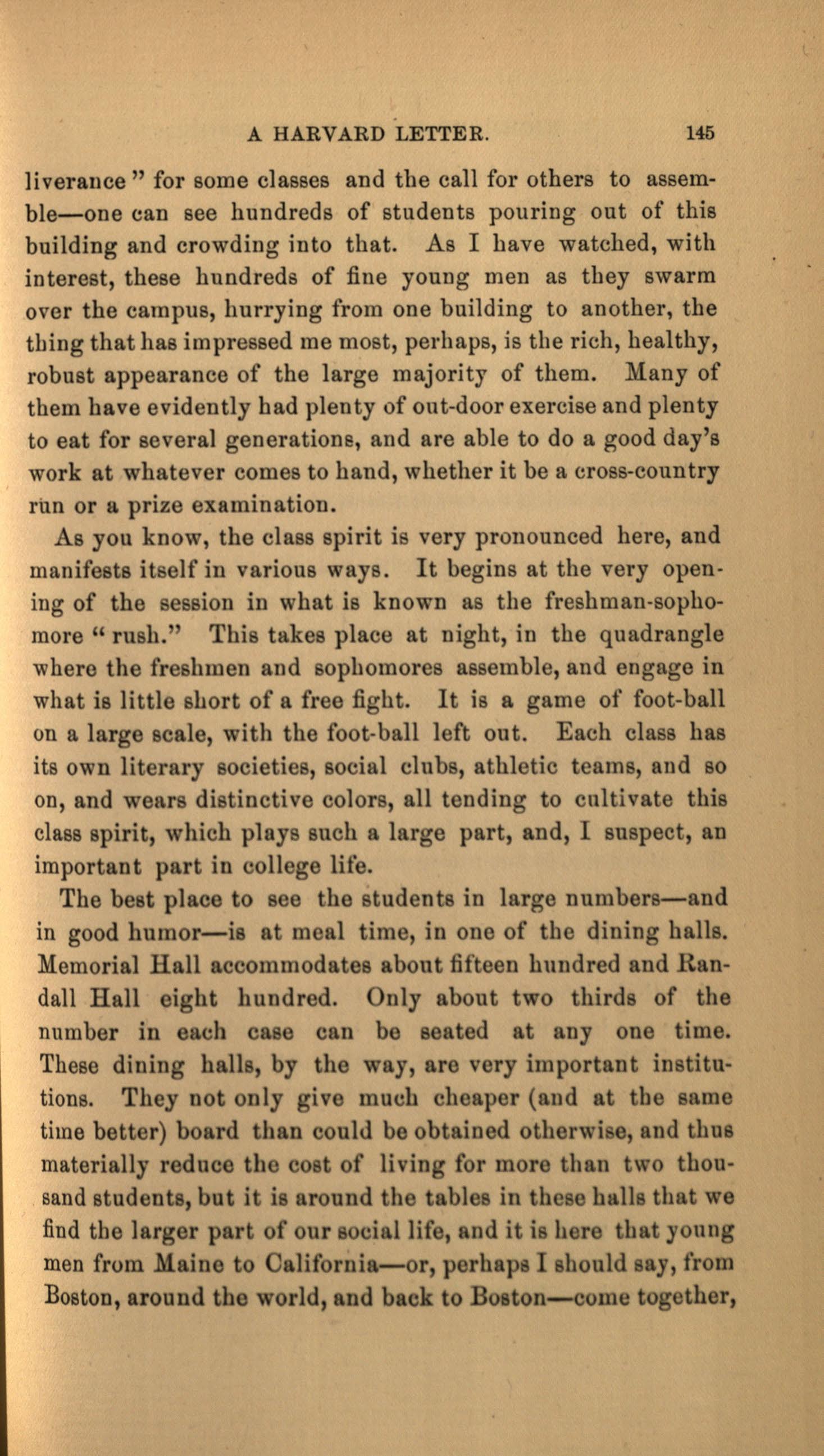
A HARVARD LETTER.
145 liverance" for some classes and the call for others to assemble-one can see hundreds of students pouring out of this building and crowding into that. As I have watched, with interest, these hundreds of fine young men as they swarm over the campus, hurrying from one building to another, the thing that has impressed me most, perhaps, is the rich, healthy, robust appearance of the large majority of them. Many of them have evidently bad plenty of out-door exercise and plenty to eat for several generations, and are able to do a good day's work at whatever comes to hand, whether it be a cross-country run or a prize examination.
As you know, the class spirit is very pronounced here, and manifests itself in various ways. It begins at the very opening of the session in what is known as the freshman-sophomore " rush. This takes place at night, in the quadrangle where the freshmen and ophomores assemble, and engage in what is little short of a free fight. It is a game of foot-ball on a large scale, with the foot -ball left out. Ea.ch class has its own literary societies, social clubs, athletic teams, and so on, and wear distinctive colors, all tending to cultivate this class spirit, which plays such a la.rl1'epart, and, I suspect, an important part in college life.
The best place to see the students in large numbers-and in good humor-is at meal time, in one of the dining halls. Memorial Hall accommodates about fifteen hundred and Randall Hall eight hundred. Only about two thirds of the number in each case can be seated at any one time. These dining hall , by the ,vay, are very important institutions. They not only ive much cheaper (and at tho so.me time better) board than could be obtained otherwi e, and thus materially reduce tho cost of living for more than two thousand students, but it is around the ta.bl in these balls that we find the larger part of our social life, and it is here that young men from Maino to California-or, perhaps I should ay, from Boston, around tho world, and back to Boston-come together,
146 RICHMOND COLLEGE ME SENGER.
overcome their prejudices, and join hands in life-long friendship . Hamberlin and I sit at a "graduate table "-that is, a table resened by eighteen sober-sided, dignified gentlemen, who are member s of the graduate school, and mostly college p r ofessors on ]eave of absence. (As I am still young and frisky, I rile the older brethren by calling it the" bald-headed r ow.") We represent thfrteen tates-jost enough, you see, to form a union-and have Canada. thrown in for good measure. The conversations at our table take a wide range, are quite free and cordial, even when we inadvertently drift into subjects on which there are the most divergent views, and are generally quite enjoyable. So you see there are some compensations for my having to live the life of a student again. Harvard has, and perhaps deserves, the reputation of being the most expensive university in merica. I suppose there are larger sums of money spent here by individuals, and there is certainly a larger number of student here than elsewhere whose annual expenses run over two thoueand dollars. In the magnificent private dormitories bore, near the niversity, a student will sometimes pay as much as a thousand dollars for his apartments-study, bed-chamber, and private bath-and this, of cour e, is bot the beginning of his outlay. Bot it is quite a mistake to suppose that there is any necessity for one to make his expenses any more here than at the average Northern college. There are many young men here who bring their expenses within nve hundred dollars, and this in· eludes the invariable tuition fee of one hundred and fifty dollars. When we take into Recount the further fact that Har• vard bestows with a liberal hand her fellowships, scholarships, and prizes, there is no reason why any ambitions student of Richmond College should not Jook forward to taking at least a year of graduate work here, after he ha put himself in position to profit by it, by doing well lJis college ,vork and taking his degree there.
Among the most striking thing a.bout th niversity are
LETTER FROM AN ALUMNUS ATS. B. T. S. 147 the orderliness, earnestness, and industry that are apparent on every hand. Of course, it is expected that men in the graduate school should know the value of time, and be bent upon making the most of the great opportunities that are offered; but, so far as I have been able to judge, a good degree of thfa spirit extends t? the under-graduates, who seem to accomplish far more than I had supposed. Of course there are, in so large a company, a number of idlers, and it is true of that class hf:lre,as elsewhere, that the benefit they receive bears a very small ratio to the money they spend; but, on the other hand, there is a great host of young men here who are preparing for life in dead earnest.
But how my letter runs on I And yet, I haven't half finished the first division of my account of the student life at Harvard. I wanted to say something about athletics-the gymnasium, the boat clubs, the class teams, the 'Varsity team, and the great Harvard-ale foot-ball game, which was attended by thirty thousand people; about the social organizations, the Southern Olub, and the students' charitable and educational enterprises in Cambridge and Boston. So yon see I should wear your patience out before getting to the Univer ity at all. So I must break off here, and give you the rest in instalments.
With cordial regards to the entire Oollege community-the students, the faculty, and the foot-ball team-I am Earnestly yours, R. E. GAINES.
Letter from an Alumnus at S. B. T. S.
R. EDITOR,-! was vory glad to hear that tho recent visit of Dr. ampey gave a new stimulus to tho e who expect to attend the Seminary at the close of their Oollege course. No doubt Dr. Sampey told a groat deal about the
RICHMOND COLLEGE ME E GER.
Seminary, but a few facts about student life in Louisville, from one ,vho has but recently left the Oollege, might be interesting to those expecting to come here, nnd to those interested in Seminary matters.
On my arrival here I found that the Seminary had splendid accommodations in the line of buildings. They are located in tbe heart of the city, yet ample room is found for tenni s and other oat-door sports. The dormitory (called C;!W York Hall, because built by gifts of friends in ew York) contain s about one hundred rooms. Student can generally room by themselves, if they choose. On the first floor of one of the wings of the dormitory is the dining halJ. We now ha ve about one hundred and eighty men boarding in it. The fare is very good in quality, and quite cheap. The lecture -roo ms are in orton Hall. This building, erected through the munificence of the rorton family, of this city, is a truly fine structure. everal minarets add grace and beauty to the building. Besides the lecture -rooms, this building contain s a commodious chapel, an examination hall, and the offices of the profes ors. Between orton Hall and ew ork Hall is the Levering ymnasinm. Here the students find ab11ndant opportunity for physical deve)opment. Tho first floor is fitted op witli needle and shower bath . no otl1or building completes the group-the omorial Library Buil<liog. It is a fire-proof stroctur , of hand ome d i"'n, containing a large number of volumes and p riodical . It is a valuable acquisition to the institution.
The coarse here embrace tho e thin which no one who expects to make a good amba ador of od hould be without.
Tho faculty is comp ed of ix men, who kno\v how to handle the Word of od ari ht. omc of tho classes are very largo. Tho ld and w T tamcnt cln shave about one hundred and thirty men in each. Th lan"'uages have from five to forty in each cla s. A yet we have not bad any examinations. .Herctofor the custom has been to have all-
LETTER. FROM AN ALUMNUS ATS B. T . 8 . 149 day examinations, but henceforth they will be limited to five and a half hours.
The life here is very pleasant . Though more study is required than at College, yet one finds great joy and pleasure in the studies which will constitute his life work .
The first day in each month is given · to the Missionary Society. Oo this day all classes are suspended, and the students gather in the chapel and hear letters from missionaries and di cnssions in regard to missions. Many of the students engage in mission work in tho city. They also run a Gospel wagon. Tho work on the wagon is very interesting and beneficial to tho e taking part, as well as to those who hear. I think it would be well for Richmond College men to do more of this kind of work.
There is no chapel service in the morning, as at Richmond College, but at supper, while we are still at the table, we engage in a short devotional service. unday morning, immediately after breakfast, all tho students from each State gather in one room and have a State prayer-meeting. One thing which I found her , and greatly enjoy, is that at the beginning of each cla tho profes or either leads, or calls on some one to lead, iu a short prayer.
In regard to social life. We find it a great pleasure to mingle socially ,vith the various students who in after years will be our colleagues in our work. If one will spare the time, there is abundant opportunity to cnlti vate tho social side of life in the city. ome are found who not only spare the time for tbi , bnt also, a one of the profe sors expressed it, "for walking the str et and looking at the fine houses w never expect to live in.'
There are about fifteen men here from Virginia. Eight of these are Richmond oll go men. Th y are W. G. Dearing, H. 0. Dudley, H. ,i:,[. Fugate, . D. Louthan, A. P. Wilson, W. T. Wingfield, L. 0. Wolfe, and C. T. Willingham. All hope to succeed in having their names written on the scroll
150 RICHMO D COLLEGE MES E GER.
of great preachers and teachers . One of the facnlty also is a Richmond College man. Dr. Carver graduated there about eight years ago. Though Dr. Carver is known as" the baby of the faculty," yet he hows great ability, and makes the other profes ors work hard to keep up with him.
Concerning the featnres of the work and life at Richmond College which proved most helpful to me, I hardly know what to say. I am glad I took the branches which were nece sary for my degree. I wish I had taken some of th e other branche al o. It is be t to be well educated before taking np the work here.
ne of the features which I deem especially helpful are the literary societi . I would advi e every student to join one of them. Thon h I pret r the a igma Rho, yet some pre· fer her daughter, tho Phil logian ociety.
To all my friends I mt1st ay life hero i much more pleasant than I had anticipated. Let no one who expect to preach d priv him elf of att nding th eminary.
I hope to sec a largo number of Richmond olle o men here next year.
Yours truly,
ALD RT. WILLINOIIA . Library Life.
HERE is a prevalent fallacy with tho av rage college Gt student that a libr ry i tout 1t emhld a r po itory for know} dg in tho form of b ok . Ho\ gr atly do wo limit the va t field of usefuln s which a library open up by such a narrow and utterly false cone ption. It i not at all im· probabl that uch wa tho originRl idea f tho library, that it was intended mer ly a a convoniont plac of roforence; nor i it \I a su h t b d pi ed . n the ·ontrary, there are ti w of u who do not realize that it i ntircly indi pensable in i capacity to inform; but ench a n c hae undoubtedly be·
come secondary. The library, like everything else , has u nde rgone evolution, so that magnificent possibilities, at first onthought of, have developed from its very existence .
Tbe primary idea of the library is that of a wo rk-shop where one way find bis tools always at hand . Orig inality is the product of this idea. If we could but realize that the contribution each one of us makes to the world at large is but a motive factor, however small that factor may be, in the g r ea t evolution of human thought; if we could be brought to believe that each one of u , in however humble a sphere we move, can contribute something to that development, we would begin to o-ra p, in an adequate way, the glorious opportunities which the library affords.
Should we "0 into the library to carry away something already there , honld our minds be in constant search of second-hand kno,vledge as such 1 Far from it. Our primary aim should be to manufacture, to create, to invent-I might almost say, to di cover-somethino- new, so~ething original, somethin individual, which shall belong to us, as our own, and which we can baud on to others, who in their turn may be inspired to fnrther iuve tigation . There is ab olutely no limit to such iovc tigation ; nor is it at all necessary to put in more permanent book form the product of our researches. There is abundant room for influence in our every-day heartto-heart contact with our fellow-men.
Even among the mor enlightened there i an idea that work of this kind shonld bo confined to graduate work at universities. It is ar,,.ncd that the average collorre man, with his three or four ntiroly difti rent tudi , ha not the time for original inv ti ati n in any nbj ct. Thi is more or les true; but the avcra•~o coll rro man should at least bo allowed the privileg of any minor inv ti"ation-nay, moro than that, should be encourn ed in it. Wha,t laboratorie are to tho sciences,to a laro-e extent librnrie arc to tho cla ic , bi tory, philology, and economic . f our tho y tom referred to
152 RICHMO D COLLEGE MESSENGER.
pre-supposes sufficient advancement for its intelligent use, and, if not open to the college at large, in view of the fact that there wonld undoubtedly be many to abuse their privileges, at least it should be to the more advanced students. Ther e is nothing in a colleo-e course more adapted to the development f the individual in independence of thouo-ht, accuracy, intellectual poise, and breadth of mind, and, above all, in an infinitely sma.11way, to open up new fields for the human intellect.
I have but touched on the merest detail of an inexhaustible sn bject, in order to throst the matter home.
Why should not we, a one of tbe foremost colleges in the South-land to -day, open onr library for tbis work, and who is better able to inauonrate the movement than we, the students i
H. LEE MaoB.uN. Service.
s I eh eld the moou one cloudle night,
And as full-blown he wept h r st rry b Jt, And m llow, ilv ry light on arth did melt,
The cane with raptur e filled my oul I plight,
Aa roof and dale did e m a fr ty glow.
It touch d my bf"nrt and pierced my soul o d ep, That from this view o grand, , hil earth did leap, 'Twas thought som truth to mortal it hould show.
Tb moon doth give o all by night who n d
A guid load tb m 'er th firm t s d;
S wo to men should lend a helping hand.
Tho sun thus, throngb ob di nt moon, doth lead
Tho pilgrim on; and we, if God wo rve, hall giv h light thn.t holp our broth r tand.
A Shot That Saved an Express.
BY LEWIS L. JENNINGS.
%)1 HE little telearapb tower wa sitnated on a lonely stretch of the great railroad. It was seven miles from the city on one side, and fully three and a. half on the other to D--, a small station compo ed of one or two groeery store , n. few dilapidated-looking hon es, and the little country po t-office. It wa built on a small piece of cleared around by the side of the track. For more than two miles on all side it was surrounded by dense woods. On tbo side towards D-- the track stret •bed away for more than a mile, as straight as could be. On the south side there was an abrnpt cnr,e abont two hundred yards from the tower, and the track cro sed a.stoutlybuilt bridge that panned a gorge that wa nearly a hundred feet deep and fully two hntldred wide.
The night in qne tion wa a very dark one. The sky was covered with cloud , the air wa filled with a damp mist, and altogether it was about a di a reeable a night a one would care to see. Th switch lamp , a hundr d ard away, could barely be se n thron h tho drivin mi t and gl om.
But in tho brightly-Ii ht d littl tower v r thing wa cozy and warm. A •heerful fire burned in tho small etove, picture hung on the wall, plenty of bo k w re •atter d around in an invitin~ fa hion upon tho telcaraph table, and, in hort, everything wa fixed a omfortablo a could be· for, a the young operator . pr d it," Whil you're fixing, you miaht as well do tho thing up in tyJ .'
The operator was e at d at one of th instrument , and was busy copying a trni n ord r for a frei ht that wa nearly due. Re was a handsome llow, and a hr v and hon t a he was hand omo. II wa a g neral favorite ulon the line, and the men alway had a kind word and a" bunk to hare' with genial Bob L elie.
" o. 99, engine 192, and o. 28, engine 643, will meet at M--," clicked the instrnment. "I am glad of that," said Bob, "for that means they're on time, and I'll have a chan ce to take I\ nap before' B .' report 37 in block."
In a few minutes 99 ca.mo puffing up, and stopped at th e danger signal; tl1e engineer and condnctor jomped off and ran 11p the steps to tho little office.
" Orders 1' asked the engineer.
" es," said Bob; "meet 99 at "All right· lend ns yonr stylu s and we II sign np," said the conductor.
"Hope yon'll have an ea y run of it, Davis,' called Bob to the engineer.
" Thank ,' tho old fellow replied · " and Bob, ' he caJled back, n the long freight wa pu1ling out, "I came blame near fergettin' it, bot we pa ed some mean· lookin' hoboes down the track there near the fir t witch -lamp. Better watch 'em ; they're tough lookin .
" 11right," Bob answer d · " I'll keep an eyo open for them."
" ow," be said, as he trctched him elf foll length upon the table, "the next thing in order is a nap. I don't believe Davis saw anybody; it's all stuff· tho old fellow has been shy ever since he wa shot at, while pulling the fast mail"; and he turned over and went to sloop, after putting weight s upon a11 of the sounders with tho exception of the despatcher's and the block wire.
In a few minute ho was sound asleep. Ho had Jain thus for nearly an hour, when tho door leading into the tower opened, and a man, with hie fi atnre concealed by a heavy mask, crept lightly up tho step .
When ho reached the top tho man looked cautiously over tho low partition, and utt red a hn ·kl of atisfaction as he aw that the young operator as a lccp. He crouched down again and waited a few moment , until the d ep and regular
A SHOT THAT SAVED AN EXPRESS. 155 breathing of Bob Leslie satisfied him that Bob was sound asleep.
"I've got you now," he said, in an undertone, as be crept up to the table, "or my name is not Dick Winters."
At the time that the masked ruffian crept in it happened that only the block wire was working. He quickly inserted a pen-bolder in the relay instrument, which prevented the sounder from clicking.
"I guess you will stop your fuss now," he said, "and the next thing i to chloroform this cuss here; then the track will be clear.''
He turned away, and did not notice that No. 5, the des· patcher's wire, was not blocked. Going to one of the windows, he made some signals with his hands, and the remainder of the gang, being thus sigoa11ed that the coast was clenr, ra.n ewiftly down the track until they reached a point about one hundred yards on the other side of the bridge, where they quickl_yremoved se eral of the rails. Then all but one bid in the bushes near-by.
But to return to the tower. The ma ked man saturated a large handkerchief with chloroform, and then, pulling his pistol, crept toward the sleeping operator.
There is an old saying that " there is many a slip 'twixt the cup and the lip. ' It proved true in this case.
Winters was almost within an· arm's length of Bob Leslie, and his eyes were sparkling with e, triumphant gleam, when No. 5 commenced callin "KR," Bob Leslie's call.
"Ourse the thing," muttered Winters, as he stepped back to stop it; but it had not called "KR ' three times before Bob sprang to his feet to an wer the call.
Quick as a flash Wint rs had covered him with his revolver, with the stern comml\nd, "Hands up."
" The devil yon say I ' gasp d the a toni bed Bob.
They stood thus for fully a minute, when the young operator stepped toward the instrument to answer his call.
RICHMO D COLLEGE MES ENGER .
"Move another stop and you die in your tracks ! " hissed Winters.
Bob stopped short, as may be expected. By this time he was completely awake and fnlly realized his position. He remembered the warning of old Davis, and, a people usually do, after anything wrong ha occurred, ,visbed that he had heeded the warning that bad been given him.
"Theres a gang to hold up 37, and Ive got to stop them," he kept saying to him elf. In a half minute he had formed a plan to save the express. By some means he would warn the operator at D--in time to stop the train. By some excuse be would get the ma k d man to let him open the key, and be would flash the news and warning along the wire. If the operator at D--did not hear it, some one along the line must, and warn the expr ss in time.
"Well," said Winters.
"Won't you let mese what that fellow wants 'a ked Bob. " Better not try it," wa the laconic answer; "I can attend to that busine s myself. '
"What I You I ' ga pod the young operator.
" You bet your life, was the cool reply.
Bob's spirits sank to tho zero point. He knew that if Winter spoke the truth he could n vcr warn the pre s by wire. He wae completely dazed by the thought of tho terrible wreck that would follow if o. 87 wont by bis tower without warning.
"I know a little about the lingo," continued Winters, with a short laugh, for he saw by the expression on the young operator's face that ho had foil d his plan of warning the train. till keeping Bob cover d with his gun, ho opened tho key and answered th call.
" ive mo 9 , ' said tho d patch r. groan of despair escaped Bob Leslie as tho villain r ported the time that the freight had departed, for his trained car recognized the masked man as an operator of ability.
A SHOT THA.T SAVED AN EXPRESS.
11 Is the track clear for 37 i " clicked the instrument.
"Everything 0. K.," answered Winters.
157
Bob realized the utter hopelessness of warning the train by wire, and for a moment or more the brave operator gave up hope. At length a desperate resolution entered his mind. He would save the express at the cost of his own life I " Take a. seat in that chair," commanded Winters, indicating a certain one.
"And let me take down my hands i" asked Bob. "I can't hold them up any longer."
"Well," said Winters, "you may. Be mighty careful, though; this gun bas a hair trigger."
" O, you bet I will," replied Bob.
"Now put them in your pockets, and if you move as much as one finger I wont answer for the consequences. See i"
" 0, yes ; I see," said Bob.
"And I'll get slightly behind you," remarked Winters, "so you won't spoil your pants by that pocket-shooting gag."
Bob felt a certain sense of security creep over him as his fingers clasped the small pistol in his pocket. It was altogether by cha.nee that he bad brought the little weapon with him, for be did not usually carry one. There were two cartridges in the pistol, and Bob swore that one of them should save the express.
Winters had ta.ken a eat slightly to the rear of where Bob sat, and, with his arm resting on the table, kept the revolver leveled at the young operator.
Bob glanced at the clock. It was exactly 1. In twenty minutes No. 87 was due, and Bob shuddered to think of the awful wreck that would follow if the cxpre s passed his tower without warning.
The block instrument commenced calling, and Winters answered the call with his frc hand. " OS O B 87 by 1.15 BS," clicked the instrument.
"0. K., KR.," signed \Vin tors. till k eping Bob covered
158 RIOHMOND COLLEGE MES " E 'GER.
with his revolver, he crossed the room and pulled down the paddle which showed the white light to the on-coming express. Oatching the rope over a wooden knob on the side of the wall, he went b.ack and seated himself.
The white light was shining. Barely a mile away the express was coming on at the rate of sixty miles an hour to almost certain destruction.
To Bob's amazement he did not feel excited, but strangely confident in himself and his ability to save the fast train and its precious cargo.
For the last ten minutes the pistol in his pocket bad been pointed, as nearly as he could judge, straight at the frail knob of wood which held the 1·ope that showed the white light or "clear track" signal.
If his ball should go true to the mark, the piece of wood would be shattered, and the paddle, thus relea ed, would fly up and show the red light to the rapidly-approaching train.
Tho train was blowing for the cro ing, barely an eighth of a mile away. In the tower all was as still as death save the solemn tick, tick, tick of the clock. The train WllS almost upon them. The moment for action bad arrived Tho tower was flooded with the brilliant rays from the great electric head-light, and when the engine WA barely forty ynrds away, and already increasing sp d, ob pre ed the trigger I
A fia h, a smother d report, and the knob wa broken to splinters. At tho same instant Winter fired. o close together were the two r port that they corned almost as one. ob felt a stinging pain iu bi left shoulder as he fell from the chair to the floor. But b fore be lo t consciousness ho saw that his shot bad gon true to tho mark, for the knob was shattered and the rope wa winging clear I
" Thank od I" he murmured, as ho heard the brakes being put on and the great train slowly comin to a stop. Then all was a blank to him.
"D-n you; take that I " Winter shouted, as he fired
A SHOT THAT SAVED AN EXPRESS. 159 at Bob . Springing over the boy's bleeding form, the villian sprang down the stops.
Quickly mounting his horse, which had been tied to a small tree near-by, he raised his pistol iu the air and fired three shots in rapid succession, and then a fourth, after a slight pause. "That will warn them," he said, and, putting spurs to bis horse, he galloped down the road, just as the red lights on the 1·ear car came backing around the curve. None of the wreckers were ever caught.
The express backed np to the tower, and the engineer and conductor ran up into the little telegraph office.
As they reached tbe top of the stairway they stopped in horror at the sight of the bleeding form of brave Bob Leslie, stretched in a pool of blood on the floor of the little room.
"For God's sake, a doctor I Quick I" shouted the conductor, as he ran down the steps. In the meantime nearly all of the passengers had crowded from the train, and were standing around in excited o-roups, when they beard the conductor's cry of horror, and were thrown into greater excitement than ever.
Three doctora, nited tates aval suro-eons, by chance, were on the train, and were soon hard at work trying to save the life of the brave young operator.
They disao-reed as to his chances of recovery. One said there was no hope at all, but the other two said that with care he would recover.
"And if care will save him, he's a good as well now," said some one in the crowd, for a man had been sent ahead, and had returned and reported tho removal of the rails.
"Everybody chip in," cried tho sam voico; " I'll start her with a ten." It was the pre ident of tho road who spoke. In a few minutes his hat was filled with bills of all denominations.
After a few moments Bob regain d consciousnes , and looked up in a dazed fashion at the crowd of strange faces
160
RICHMO D COLLEGE ME SENGER. around him. His lips moved as if to speak, but one of the surgeons laid bis hand across the boy's mouth. "Don' t speak, my boy," he said, as the tears ran down his face; "it' s all right; you saved us"-
"And he will have his reward if he ever gets well," broke in the president.
"Thanks," murmured Bob, and. then the brave .young fellow fainted again. Tenderly they carried him aboard the train, and into the presidents own private car.
The train-men had replaced the rails on the track, and, polling slowly over the injured portion, the great expr ess was soon flying on.
Bob did not die. Ho was arried to the ho pital, and, under tender and the mo s t careful treatment, he was soon bronght around. I saw him the day after be loft the hospital, and, although he was thin and pale, I ea ily r cogoized the features of brave Bob Leslie.
For years I had been a~ay from home. ot long aft er I returned I was walking down tho s treet 0110 day with a friend of mine, when some one, comin np from behind, slapped me on the shoulder, and I heard a hearty, u Hollo, M--."
Turning, I again saw Bob Lo lie, and looked into hi s handsome, manly fa.cc, and gra ped his roat stron hand.
"Ilave you forgotten 37 l ' ho a ked, with a laugh.
" ot much, Bob," I answered; "and you ar changed but little, old man. till tho eamo old Bob of hoy -hood days. By the way, did tho ' old man ' over promote you 1"
"Well, slightly," ho answered, laughingly. 11 Drop around to see mo before you leave again on another of your wild chases."
The friend who wa with mo look d around in amazement. "Where have you boon," ho kcd, with a laugh; "in the baek-woode, eh 1"
FIRST VISIT OF WHITE MEN TO RICHMOND. 161
'' Why 1" I asked.
"Well, you must have been. Bob Leslie is one of the vice-presidents of the ---Railroad Company."
Some Notes on the First Recorded Visit of White Men to the Site of the Present City of Richmond, Va.
N!!HE above is the subject of a scholarly production from the pen of Mr. Robert Lee Traylor, an honored alumnus of Richmond College.
He assumes, as most historians have failed to do, that the first settlement in Virginia was by the Spanish. This settlement took place eighty-one yea.rs prior to the permanent settlement made by the English at Jamestown Island.
It seems strange that in the Old Dominion, the seat of orthodox religion, the fir t form of worship to God should be the mass of the Romi h Church.
If these speculations be trne, it does not seem unreasonable to suppose that the paniard were the first white men to visit the site of the present city of Richmond.
Recorded evidence shows that Englishmen, under Captain Newport, in whose honor the present city of ewport ews is named, landed at tho si-te of Richmond ten days after the arrival of the colonists at Jamestown. In reference to this, 0aptain Gabriel rchcr writes a follows:
"Thus parting from rahatecs ioye, we found the people on either syde tho River stand in in Cluster, all along, still profering us victuals, which of some were accepted, as our guydes (that were with us in tho boat ) pleased, and gave them requitall.
"So after we had pa ed some 10 mylo, which (by the pleasure and ioye we took of our kindo intorteynment, and for the comfort of our happy and hopefull Discovery) we accompted scarce 5, we came to tho second i let de cribed in
162 RICHMOND OOLLEGE MES ENGER.
the Ryver; over against which on Papham syde is the hab itatyon of the great kyng Pawatah, which I call Pawatah s Towre; it is scituat upon a highe Hill by the water syde, a playne between it and the water, 12 score over, whereon he sowes his wheate, beane, peazo, tobacco, pompions, gourdes, hempe, flax, &c."
" ow the Day Drawing on, we made signe to be gone, wherewith he was contented; and sent 6 men with us: we also left a man with him and Departed. But, now rowing some 3 myle in sbold water, we came to an overfall, impa sible for boates any fnrther. Hore the water falles Downe through great mayne ocke , from ledges of Rockes above 2 fa.dome higho: in which fall it maketh Divers little Illets, on which might be placed 100 water milnes for any uses. Our Mayne Ryver ebbs and flowe 4 foote even to ye skert of this Downfall. hippe of 200 or 300 tonne may come to within 5 myle hereot~ and tho re t Dcopo iooagho for barges or mall r ve el1s that Drawe not above 6 foote water."
Tho ex ct location of Powhatan's wi wain i not definitely known, although it l1aa b n long onght for by ardent student of the early history of irgini . Powhatan resided lL s hort distance below Richmond, on a precipitous bluff of tho Jam . Tho site of hi , igw m i visited by English and Am rican tourist of this day and goner tion.
In writing of this locality, t1pt in John mith, in the second part of the map of irginia, printed at xford 1612, says:
"Tho exact location of Powhatan , igwarn is not definitely known, although it ha been long ought for by ardent student of the arly hi tory of irginia.'
ODE TO THE SPHINX.
Ode to the Sphinx.
There, where the ile's broad silent waters run Their long lone way by cliff and buried tomb, Where scorching suns, thro' white and cloudless skies, Shine down on fertile fii~ldshalf overwhelmed By ever-shifting wind-drift desert sands, And mighty pyramids, up-reared of old, Seem hovering in mirage enchanted air, A face, gigautic hewn from uative stone, Has stood unchanged tbro' lapse of centuries; And there, beholding all the life of men, The Sphinx still broods o'er years of long ago.
And ever still she sees before her po.as The same B\ art patient face a of yore; Their humble tasks, their toil and mirth and song, Are still the same. And yet all el e how changed I Thou ea.west Egypt's ancient pride and power, The glory of her cities and her gods, Her gorgeous palaces and pomp of kings, The flower of all her marshalled hosts of youth. In the dim morn of Time did t, see the rise Of arts and sciences and government; And in the blazing noon of Egypt's glory Thou eawest the birth of I rat1l a a. nation; And in the fa.ding twilight of her power, The infant glory of the Prince of PeacePerchance didst shel t r Him beu ath thy bu.de.
Thou heard'et the clash of arms and tramp of hosts Of Aaahur and Persia, focedon and Rome, Of Arab and Turk, of Angle and of Frank; Thou ea.west their noon-tide glory fade away, Till empire on empire vanish d iu th past.
163
lM RICHMOND COLLEGE MESSENGER.
Temple and shaft and ruined architrave Are silent now, forgotten of their gods I Hesiri sunk in endless deeper sleep, From which not even Har and Hes can rouse I Yet watchest thou, as if to wait the time Hesiri wakens from his sleep of death, And Egypt lives ago.in.
0 Sphinx I I read thy new and deeper riddle: Methinks there dwells o.spirit still in thee; Thy riddle was not solved like that of Thebes. Thou livest yet, and men may learn of thee
Such lessons as shall ne'er grow old, that yea.re And even centuries shall not exhaust.
For thou bast leo.rned their secret from the ages. Thy dumb and stony lips teach human kind Of firm and self-restraining fortitude, Of patience that endures until the end, Of strength that calmly holds itself above Solicitations of the fading moment, Nor yields unto the emotion of the hour.
What thoughts must lie behind thy stony fooe I Dost thou in secret pity mock at u And these vain hopes aud fears that urge us on?Thou who hast seen the fates divid our Jot , Hast calmly contempla d age flown, And viewed the life of nations that were hoar with age When those we call our own were yet undreamed. No smile e'er lighted up thy tony eye, Or moved thy firm cloa d lip , as thou bebeldat
The mirth and joy that once aurrounded thee; Nor didat thou h ad or care a , oue by one, At Fate's stern call, m n vani h d from thy sight. Nor minglest thou iu mirth of human kind, For thou bast pierced thro' and underatood The ahallowueH and vanity of men,
TO----.
Hast known their coming in and going out, And seen them pass before thee one by one. Perhaps in days a.gone, subdued and a'red By fear of thy stern face, have men implored Aud have entreated thee on bended knee, And hoped in vain to win some kindly thought, Or waken favor in thy heart of stone. Thou answeredet not, but silence only taught The better lesson thou thyself hadst learned, That men should wait in patience till the end, And, strong at heart, in their own might should win, Nor lean on any eave on self alone.
ROBERT J. KELLOGG.
To-----
As I've hurried on my journey
O'er this martial field of aot1on, O'er this battle-ground of life, Oft I've seen some pretty maiden, Fair and gentle, modest, lovely, Lovely ae the flowers in spring-time When at first they spread their pets.le; And I've longed to meet the fair one, Longed to meet her, woo her, win her, Longed to tell her how I loved her, Longed to call her my own sweetheart, Think and dream of her as sweetheart.
Oft I've met the pretty maiden Whom I thought I'd love eo quickly, But somehow I could not love her, For some way, some word, some action, I had lost my erstwhile longing, Longing for the lovely creature;
166 RIOHMO D OOLLEGE ME SENGER.
Thus it was with all the lassies. Lovely lassies, fair as roses, When I knew them could not love them. Thorne were with the pretty roses, Thoros, which fir t were never thought of, Wounded me, and I, when wounded, Could not love the beauteous blossom, Which so soon bad lost its fragrance.
Thus I'd love no more the fair one, And I'd shun the fairy creatures, For I could not bear the longing, Aching of my heart so torn, Bruised and torn by girls coquettish.
p and down the world I wandered, \ a11dered o'er its rugg d pathway, All alone in life's wild drama, LonJing for ome b e tter creature, Longing for some maiden worthy, , orthy of the name of sweetheart.
E'en to me to be a we theart, Worthy 0110 I sought in vain.
o I turn d me to my tudies, Tried to drown the inward pa sion, Drown it in my book and r nding, Drown it in my thoughts aud studies. But again 'twould claim the ma t ry, And it bade me ha ten homoward, To the old hom of my childhood, To the homo of pr ty maidens, Far away among the moun ain .
To my home-land quick I hastened, earch .d among my childhood's play-mates
For a h 1pm t in my ·auct ring p aud down lifo' r ok d patbw11y 1
O'or th at p bill of i orrow , Through tho gr u val a of ita pleasures;
MUSING.
There I sought me out a sweetheart, There I found my mountain lily, Lovely, graceful, winsome, modest, Found her there among my school-mates, Found her there, but could not tell her Ho,v my heart was longing, aching, Bursting with its heavy burden, battered with its hidden passion, To be loved by such a maiden, uch a. pure a.nd lovely sweetheart.
O'er the world again I'm wandering, Wandering o'er its tangled pathway, Sea.robing for some balm of healing, Panacea for all my defect , All my human imperfections, For I know I am not worthy Of this pure and gentle maiden, Whom I've sought so long and weary, Whom I love among ten thousand, Love her most and love no other.
0 Thou God of n.11creation I God of all the spheres of action I Make me worthy of my fair one, foke me worthy of my sweetheart. October,1899.
Musing.
Oft at evening I am sitting Iu my chamber, quite alon , And the solitude is brok n By an ember-tis a token Of the moments that are flittin From my grasp forever-gone.
168 RICHMO D COLLEGE MES ENGER.
Fancies, then, within me burning, In their passing form n. train. And 'tis then I sit and wonder Why alone I mu e and ponder; And old memories keep r turning To my sorrow-laden brain.
O'er my life my thoughts reviewing In their earcbing seem to find, My neglected moralizing And the often t mporizing Of the intent-and the doingOf a wild, un ettl d mind.
ooo an end comes to my fancie , From the fire-place boo a gleam, And intently gazing round me 'Ti the fact that now a tound me \ hy my oul the night utranc Io euch wand ringe of a--dr am I
' . R LL OWEN,
'Twa only a ,mall g ranium, In ay llow, arth n pail, '\ ith a tiny novM ·hit I lo om And a. talk 10 v ry frail.
till I lov d and nur d it fondly, And watch d it from do.y to dny, A it h d forth it mod t fragranc , t r than u w-mo n bay.
*
0 CARIS !MUM FLOREM.
For it eemed so well contented
To sit in my window and grow, With its little white face turned upward, As pure as the riven snow.
Iy heavy spirit grew lighter
With that child of nature tbere, 1y darkened room grew brighterMyburden ea ier to bl'la.r.
To see that Heaven-sent treasure In a. yellow earthen pail, With its little white face turned upward, On a stalk so very frail.
., ., * ., * *
'Tis gone-but the needed lesson Lives in my heart t -day; Though set in an earthen ve eel, I, too, can look upward and say*
Help rn to make om life brighter, ome life that's burd ned with cnr , Ere I leave this earth u v el To dwell in that city fair.
Ere the cold bleak wind of ovember hall shatter this earthen pail, And this du t hall r turn to its mother, And vain d sire hall fail.
If only to b a.r a blos om, If only t mo.ko a ign,
If only by looking upward, My life may r mbl Thin
AROmD LD CLAY HARLOWE. November,1899.
El>ttor..tn-<tbtef. JAMES D. GWALTNEY. Bssoctate Ebttors.
T. II. ANl-'ORD, l'Jtilt1/qi,,10 .
J. L. DART. Plt1ul,,,.w11.
LITERARY. ,COLLEGIANA. 0. T LO tl'Kl , M1t S1'rn<•RM N. F ALLEN, 1,J,.S,'rn<,.RM ATHLETICS.
A. A. YODER. Pl,1/1/,zla•. EXCHANGES. R. N POLLABD, 1111S(p11RJ,,.
LAWOEPARTMENT . W B. ORlFll'ITB .
.:13ustness.managets. WILLIAM SMITH, Pbilologian . G. T. LUMPKIN, All't, Mu Sirma Rho .
Whenever there is a war something hap·
J. NEWDEPJ.R RE , I EDUC TIO., pens. Tho panish War as no exception to thi rnl . Among the many new pro· hlcme and opportoniti s which it called ,1p th expansion of American ommer · is ignifi •ant. 'N' ar now the rival of England at every port on tho globe. To meet this enlarged fi ld of a tivity, the niversity of Pennsylvania has estabJiehed a Departm nt of omm rce and International Law. Tho following subject aro offer d: 00
History of omrnorcc. ommorcial ography. Transportation.
Economic R ourcca of Europ and tho nited States. Ee nomi · R our· of Tropi ·al ountrie . American ommcrcc and otnm r ·o Relation .
Traneportation and hippin
EDITORIAL.
POLITIOAL ECONOMY AND SOOIOLUOY.
Economic Geography.
Principles of Political Economy.
Practical Economic Problems.
Ethnology and Antbropolo y.
OOVRR MENT AND LAW. Constitutional Law. International Law. Foreign Relation of the United tate . Government of Colonies and Dependencie . American and Forei n Commercial Law. Corporation Law.
PUBLlO FINANOE. Banking.
Practical Finance and For ian Exchange. Monetary History and onetary ystom . Insurance.
Railroad, Corpora.to and Pnblir cconnting.
LA OUAOE.
English, German, Fren •h, Italian, and panish.
In a recent editorial wo dw lt upon tho need of trained men in our diplomatic and con nlnr service. The Hail and Express welcomes this t p in dncation for it helpfulne in this regard. It says:
"This new department will also be of permanent ueefulnes to the country by training youn.,. men in tho o branches wherein profi.cioncy i of th high t va.lu to the on ular and diplomatic service. Tho whole tendon •y of thi scrvic i toward a higher le,·el of fitnc , and this tendency must in ere o if we are to reap the full n fit f the pl 11did trade oppor• tunities now unfolding to Amcri ·1u1 ,ut ri ri throughout tho world. And if it bo conceded that w nc d b tter con ul , it
172 RJCHMO~D COLLEGE MESSE GER.
follows that the candidate who bas received special training in the branches exprcs ly adapted to tbe needs of the consular service will enjoy a distinct advantaO'e over tbc applicant who lacks it . On the whole, therefore, the project contemplated at the niversity of Pennsylvania seems calculated not only to provide a broader system of business education, but to bring about a wholesome advance in the standards of equipment for appointment to the consular service .'
We commend the enterprise of the Quaker University in adjusting education to life. If our colleges will strive wisely to meet the pressing need for skilled men io the industrial and commercial world as well a11in the professional careers, successful business men will not be slow to supply tbe funds necessary for the ample equipment of such institutions. In the history of schools, as elsewhere, the law of the survival of the fittest applies : Adjust or die.
Rev. E. V. aldy, who has recently taken
GEORGE AD.ill ·h . f th · b · ·a h h · SMITH. c arge o e arn ri ge- trcet urc , m Manchester, contribute to thi number of Tn :MxeeENOE& an interesting picture of eor e dam Smith, the remarkable cotclt thinker, whom he beard lecture the past summer in the niver ity of hi ago. When George Adam mith is mentioned, we involuntarily think of the incomparable Henry Drummond, the inspir r of the youth of all ]ands. Indeed, th e two m n ar only typical of the marvelous intellectual output which Scotland bas been making during the last quarter of a c ntury. Think of tl1eillnstrious list-Bruce, Ian Maclaren, Jam s talk r, Robertson Smith, Henry Drummond, Principal Fairbairn, George dam Smith, et omne genm. In this connection it ought to be mentioned that eorge Adam mith attribnt e to D. L. Moody (alas! what tl1e world has suffered in hi death) the present out-
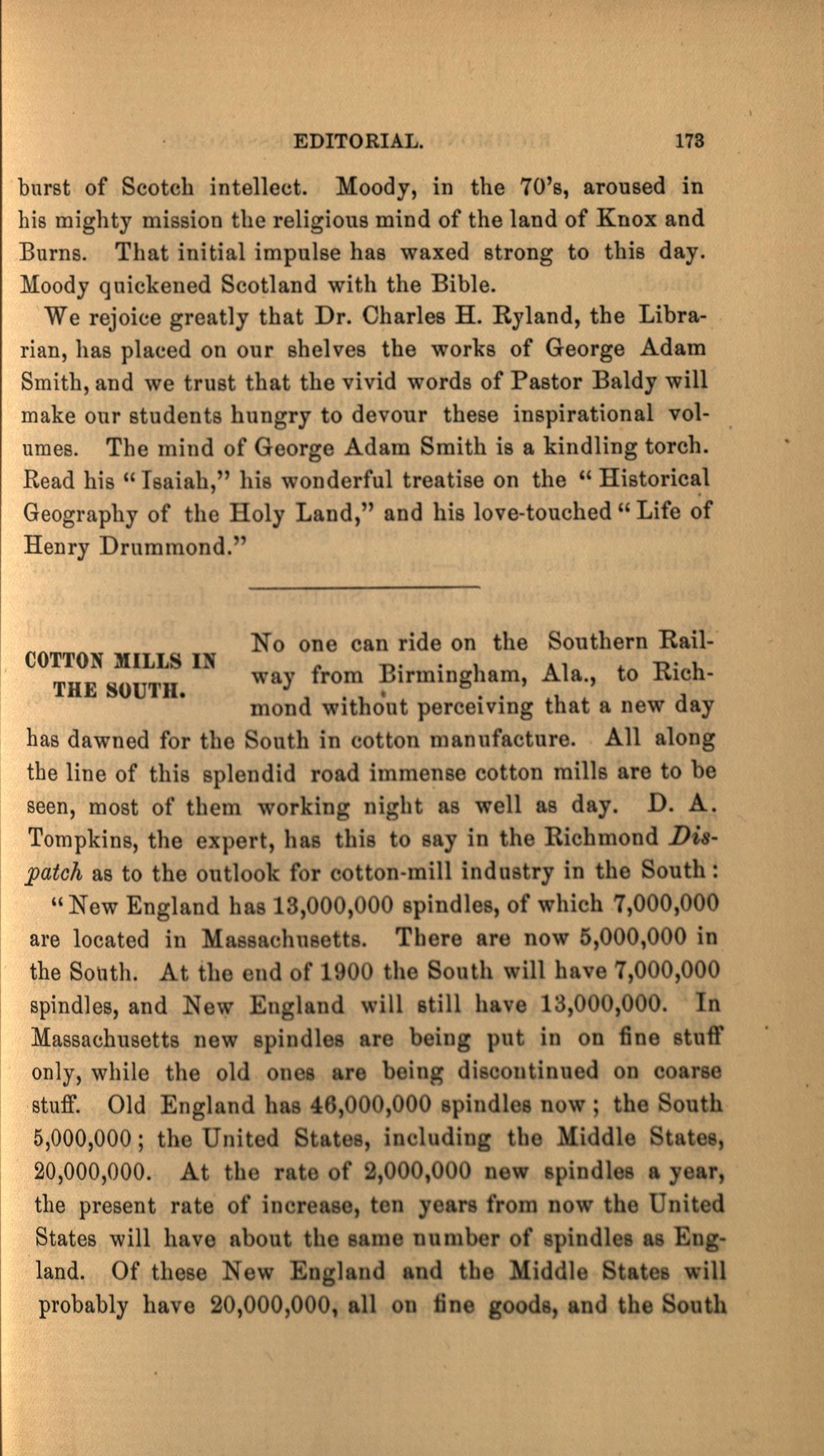
178 burst of Scotch intellect. Moody, in the 70's, aroused in his mighty mission the religious mind of the land of Knox and Burns. That initial impulse has waxed strong to this day. Moody quickened Scotland with the Bible.
We rejoice greatly that Dr. Charles H. Ry land, the Librarian, has placed on our shelves the works of George Adam Smith, and we trust that the vivid words of Pastor Baldy will make our students hungry to devour these inspirational volumes. The mind of George Adam Smith is a kindling torch. Read his "Isaiah," his wonderful treatise on the "Historical Geography of the Holy Land," and his love-touched "Life of Henry Drummond. '
o one can ride on the outhern RailCOTTONMILL IN way from Birmingham, Ala., to Rich- THE SOUTH. mond without perceiving that a new day has dawned for the outh in cotton manufacture. All along the line of this splendid road immense cotton mills are to be seen, most of them working night as well as day. D. A. Tompkins, the expert, has this to say in the Richmond Dispatch as to the outlook for cotton-mill industry in the outh:
"New England bas 13,000,000 spindles, of which 7,000,000 are located in Ma sachusett . There are now 5,000,000 in the South. At the end of 1900 the South will have 7,000,000 spindles, and New England \Vill still have 13,000,000. In Massachusetts new spindle are being put in on fine stuff only, while the old one aro being di coutinued on coarse stuff. Old England has 46,000,000 spindl s now; the outh 5,000,000; the United States, including the .Middle tates, 20,000,000. At th rate of 2,000,000 new pindlc a year, the present rate of increase, ton yea.rs from now the United States will have about the sam number of spindle as England. Of these New England and the Middle tates will probably have 20,000,000, all ou fine goods, and tho South
lH RIOBMO D COLLEGE MES ENGER.
25,000,000. Io other words, the United States, in 1910, will have as many spindles as England, and the South will have more spindles than ew England and the Middle States combined."
Dr. B. L. Whitman has resigned the presiDR. WHITJU ·,s d f O I b' U . 't W b' RE IQNA.TfON'. ency o o um rnn n1vers1y, as mgton, D. C. It seems a pity that this school, so strategically located, cannot secure the funds necessary to make it a great institution for graduate students. The ational overnment ha expended some 33,000,000 in odocational facilities in the capital-in such forms as the Botanical Gardens, Oongressional Library, mitbsonian Institution, &c., c. What a splendid thing it would be if the Baptists could avail themselves of this va t outlay in developing a g1·adnate school I Every Baptist College in the oath, we believe, would further such an enterprise by directing thither certain of its graduates. In certain departments of history and poli· tical science, the advantages of Wa bin ton are unsurpassed. This city, too, would offer an oxcoJlent meeting place for the cultnre of the North and outh-a ne ns political and intellectual.
THI CHICA.GOIt w~ a notable vent in. the history of &HIP C.l L America. wh n, on the morning of January • 2d, at 9 o'clock, tho waters of Lake Michigan, began to flow through th big hicago canal into the Mississippi river, and thence to tho ulf of e ico. The asto11nding enterprise of Chicago wns never displayed more plainly than in the onstrnction of this •1rnal. u ·h of it was cut through the olid ri>ck,b ing 162 ti t wide and 35 feet deep, and coating thirty-thr million dollars. Boats can now go from Cuba to Chicago. This feat adds another t.o the number of the seven wondora of tho world.
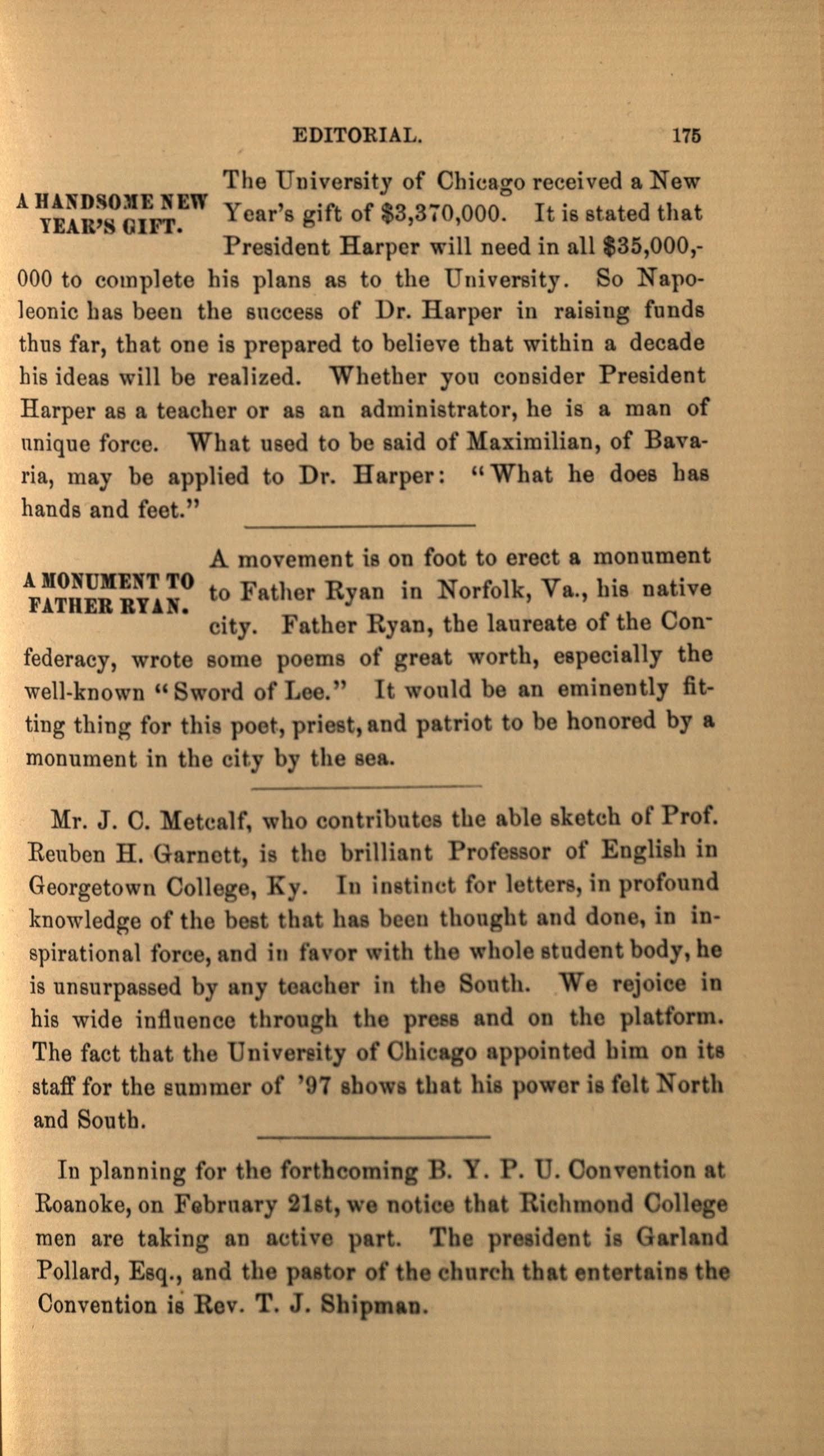
The University of Chicago received a New A H.lNDSOJIE NEW ' 'f f 3 3,..0 00 I . d 1 YEAR'SGIFT. cars g1 t o , 1 , O. t 1s state t 1at President Harper will need in all $35,000,000 to complete bis plans as to the University. So N apoleonic bas been the success of Dr. Harper in raising fonds thus far, that one is prepared to believe that within a decade bis ideas will be realized. Whether you consider President Harper as a teacher or as an administrator, he is a man of nnique force. What used to be said of Maximilian, of Bavaria, may be applied to Dr. Harper: "What he does bas hands and feet."
A movement is on foot to erect a monument A MONUMENTTO F l R · N c lk V h' t' FA.TRERRYAN. to at 1er yan m or,o · , a., 1s na 1ve city. Father Ryan, the laureate of the Confederacy, wrote some poems of great worth, especially the well-known "Sword of Lee. ' It would be an eminently fitting thing for this poot, priest, and patriot to be honored by a monument in tho cit.y by the ea.
Mr. J. 0. Metcalf, who contributes the able sketch of Prof. Reuben H. Garnett, is tho brilliant Professor of English in Georgetown Oolleg , Ky. In in tinct for letters, in profound knowledge of the best that ha bceu thought and done, in inspirational force, and in favor with the whole student body, he is unsurpassed by any teach r in th South. W r ~oice in his wide influence through the pre s and on the platform. The fact that the Univereity of hicago appointed him on its staff for the summer of 97 show& that his power is felt orth and South.
In planning for tho forthcoming B. Y. P. U. Convention at Roanoke, on February 21st, we notice that Richmond College men are taking an active part. The pre ident i Garland Pollard, Esq., and tho pastor of th chur ·h that entertains the Convention is Rev. T. J. hipman.
happy new year to all.
Prof. . . Mitchell ha ac epted an invitation to lectu re this month before the Polyt chnic In stitnt , t ma ck bur g.
We were all pain d to hear of the d nth of R. cFar- · lands father, and we deeply ympatbizc with c. in hi s affliction.
Herbert Willis (B. ., 95) wa in town a fo\v da , ago to ece his be t girl, and , hile h r p id bi old fri nd at ollege a vieit.
W o were glad to c J. P. E o on the ampn s in D ecemb r. Daring hi t y here h ap nt tho mo t of his tim e with hi fri nd, 1',rank Turpin.
Th o o who
nh· r it • of irgin ia and, llClnow profi• or f ch mi try in the of irgini will pr fi or of •hemistry during th a nc of J'rofi or Il un t r.
D inning in arch, th profi oil g o will deli er a cri of 1 tur to th uden and th Ri chmond public. W hop to b bl to announc their s ubj ect s and th dat of th ir l ctnr in our n t i u • .
r. harl A. t k I •, th J opular W hin ton pastor, wi h u on th c mpu n ,J nu ry 3d. II was in att ndan on th m in of th tru t of irginia Union l nivorait ·, an in titution to hich · i h all eucc s.
COLLEGIA.i.~.\.
Prof. E. B. Pollard, Ph.D., of Columbian University, spent Christmas nt Richmond College with his father, our Professor of English. Among Southern writers for the current press, few, if any, are more potent than Prof. Edward Pollard. He is a son of whom Richmond is proud.
We have deemed ourselve most fortunate in having with us Prot or Duk , who is carrying forward in a noble ,. way Profe sor nine 's work. Profes or Duke-one of our own men-took hold at once, and ha shown himself n man of force. He hn won the affection and admiration of n.11his students.
R. W. Durrett ( . A., 9 ) wod1ipped with n in chapel on our re-a emblin January 2d. It wa a plea nre to know of the succe s of hi work in Delta cademy. Durrett, we feel, has been guid d aright in choo ing teaching a hi profession. Hi inc r lov of truth, hi quick ympathie with strno-gling youth, his nobl haracter, a w 11 a hi accurate and ample s holnr hip- 11 of the c tit him for tho hi best usefulness a a t achcr.
No member of the fa •nlty onld be mi ed moro than Prot. R. E. Gain , who i now t Ilan·ard on a y ar I av of absence. Prof. ain know h w t make math m tic interestin as a no 1. Th uobl dents feel in his nhj ·ti our men who purpo fr m ·c r to y ar to make m them ti their specialty. Prot or ain h many 1•m nt of strength, but to kn w him at hi b t on mu th r him in his lecture-room-that i th thr n of hi pow r. It i with great plea uro that we ar n bl d to iv in thi number of TaE MxsSENGEK an c 11•nt Han · rd I tt r from our beent Professor.
President Benjamin Id Wh l r iU d liv r in F bruary
178 HlOH O D OLLEGE 1ES ENGER.
the lectures on the Thomas Foundation . As an introduction to this famous teacher, we hope to give in our next issue an account of his work in nlifornia, written by the ifted Prof . . M. Johnston, Pb . D., of Leland tanford niversity, a Louisiana boy, who by dint of n rgy has made a nome in the world. Profo or ellog will also pre ent his impr ssions of Dr. Wheeler as a teacher . Indeed, the fact that Dr . heeler had inuch to do with moulding the mind of onr Profe or l ellogg and indncting him into the realm of tho re k, has • placed every tndent of ichmond ollcge under obli atioo to the vi orous Pr ident of th niver ity of alifornia, for Profe sor K llogg botb in th cla -room and in fri ndly a o·iation, is a great factor in oll o life. evot d to his studies in Ilolleni m, he how a d p r love for the individual student. To him os to ver true t ·her th man is more than th matter.
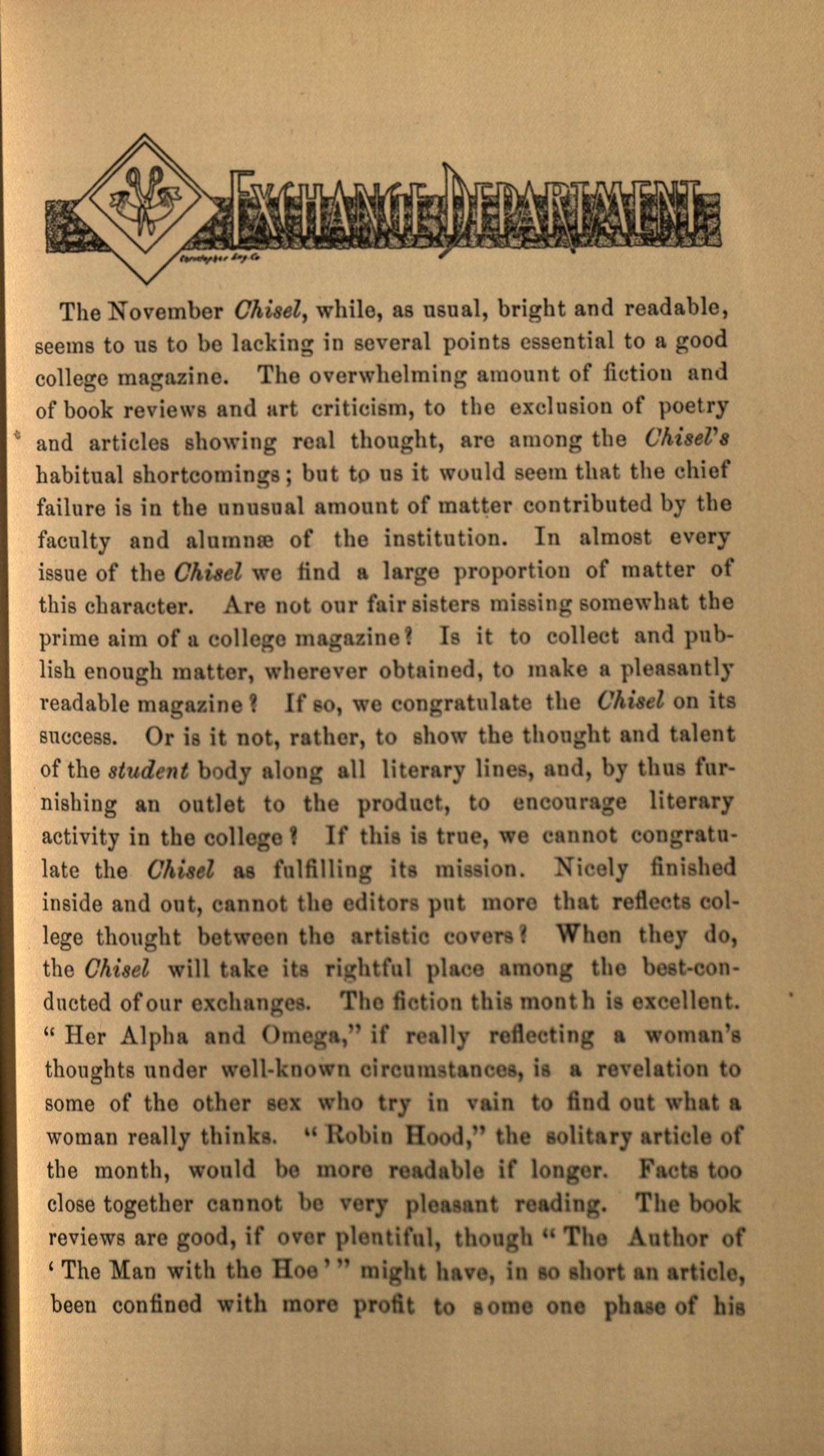
The ovember Chisel, while, as usual, bright and readable, seems to us to be lnckin"' in everal points c sentinl to a good college marrazino. The overwhelming amount of fiction nod of book review and 11rt criticism, to the cxclu ion of poetry • and articles showing real thourrht, arc nmon"' the Ohisel's habitual shortcomin s · but to us it would ,eem that the chief failure i in the unu ual amount of mat~er contributed by the faculty and alumnre of the in titution. In almo t every issue of the Ohi el we find a largo proportion of matter of this character. re nc,t our fair i tor mi in"' .,omewlll\t tho prime aim of 1t collc om nzin . I it to collect and publish enough matter, wherov r obtained, to make a plca!\antly readable magazin . If .o, we con"'ratulato the Ohi el on its success. Ori it not, rather, to how th thou•rht and talent of the student body along all literar lines, and, by thu furnishing an out} t to th product, to trnconr "'C literary activity in the collcrro t It' thi i true, , e cannot con.,.r tulate the Ohi8el as fnlfillin" it mi ion. . il•oly fini h d inside and ont, cannot tho ditor put mor that r fte t •ollege thought botw n tho arti ti• cov r Whon th y do, the Chisel will tak it ri rhtful pl mon th b t-con• The fi tion thi month i cllcnt.
thoughts under woll-known cir um t n some of tho other . who try in ,. woman really think . " Robin H t l, the month, wonld h mor r d bl close together cannot h v ry pl reviews are good, if ov r pl ntifnl, th 'The Man with tho Ho ' mi ht h v been confined with mor pr fit to a woman' , i a r v lati n to in to find out wh t a h m on ok uthor of n articl , of hi
180
work or character. I it the author, the editor, or tho printer ,vbo aspires with an e •
If the Cbristma number f the University of Vi1'ginia Magazine had done no more than pre ent .Mr. Mabie's addre , delivered at the unveiling of Zolnay s bo t of Poe, it ,vould have done well. But b id thi valuabl contribution to criticism, it contained oodly number of torie ond poem , the httter particularly meritoriou . In the Ran-ged Mountain , a poem by H nry T rrell, ditor of L lio', Monthly, is a beautiful picture of the mountain near barIott ville. In 'Empty Wagon ' and Tho Incapables," both poem , the writer how a re lly high d r e of literary ability. Th magazin i carefully edited, and all tho sides of coll g«J lifi ar pr ent d. few typo raphical errors have gotten by tho proof-readers but naught that erve to mar tho pa
We acknowledg with thank th followin : Un ·versityof Virgi11ia Magaz ·, e, Oeorgetow, Coll ge Journal Red and .Blue, North Carol 'na Un · • r ity agazi,u, The Vassar Ni,cellany, The w,·zz·a,, J • oell tuclent The .Buff and .Blue, The Gray Jack t, lV:'ll·a"~ a11d lfary Coll ge Monthly, The llampd n- id,i y Jfagaz:11 The Randolph-Naco1i .Monthly, .Amherat z·terary Mo,thly, Woford OollegeJournal, The .Bucknell .Mirror, Th, 'h• el, The Kodak, The Blue and Gold, Emory Ph r · , The Nerccrian, Tlie outh rn Collevia,i, Till w; ll l !I .J.lfau"·,1e,Tho Guilford Colkgian, Tha Emory a11d11411ry Era, The Davison Oollege Jlagaz '1ie,and man oth r .
It ia quite eldom w find in the column of our exchanges r al po try, hut in cannin tho r c n numbers of The Hampden- idn,y Nagaz 'ne w ha\· noticed from time to time the appoaranc of "tho r al articl .' " Foot-Ball
E rOHANGE DEPARTMENT. 181
Toast," in the December issue of this magazine, is, we think, the best poem we have seen in any of our exchanges:
A FOOT-BALL TOAST.
To th.t stroke of the cordedmuscle
And th.t grip of the clinging hands;
To the frenzi~d roar on the bleachers, Where th.t crowdedrooters stand ;
To the shock of the closing struggle, To th.t groansof thosethat fall, Drink-ye who have learned th.t gloi·y
And th.t splendorof it all.
Baokward and forward we struggle oder the reeling sky, ilent amid the thou ands
That lift their long-drawn ory; Backward, and forward, and backward, Grim as the ancient kings, When they fought for the Pride of Empire Under the Eagle's wiDg .
Certain and sure the ignals, (Graven in ston aoh fac ),
Telling of the formation, Every man in hi plac .
Crashing over the tackle , Into a line that bend ,
Bide we our time in palienc
To go whero the signal end .
Low in the line we ar waiting In a stillness deop as death,
For a silence fal le ou th watch r , And the backs pray lloaven for br ath.
"Three-twelve-aix n-uiu t n-
Now, ero the tim i don ,"
And the cry that br ak from tho id -lin
Can tell how the gam
182 RICHMO 'D COLLEGE ME SE GER.
To the p1111tand the e11dathat race it While secondsmark the time j To the thrill as the backs, long leaping, Go plu11gi11ginto the line; To the ahoekof the closing struggle, To the groanaof those that fall, Drink - ye that have learned tlte glory And the ,plendor of ·i all .
-Hampden - idney Jlagazi11e.
The editor has endeavored to sum up, as con- P;:S1E::!. ci ely as possible, the general doctrine of "Adverse Possession," which, he trusts, will be of some benefit to those members of the senior class who do not have free Bcces to the library.
By adverse possession is to be understood one dependent upon an adverse and conflictina title, grounded upon an ouster or dispossession of the rightful owner-i. e., the holding by a claim of title adv rse to another title. (91 Va., 397.)
Mr. Minor says that, in order to constitute an adverse possession, thore mnst be a po se ion under a claim of title; or, in reference to conflictinlJ' claims, it mn t consist of an actual, exclusive, continued vi ible, uotoriou , and ho tile po e sion under a colorable clnim of' title.
By color ot' titlo i meant that tho p!),rty who nece sarily relied upon it mu t claim under ometbing that has tho semblance of title. Po ion under a claim of title, a ditinguisbed from color of title, e tends only to that portion of the land whereof the claimant is in the actuul po so siou. (93 Va., 293.)
Where there is nn actual n.dvor o po e ion by one, there can be no constructive po s ion acquir d by nother-tbat is to say, two persons cannot b in advcr o con ·trnctive posession of the ea.mo land at tho so.me tim . (Tiodam'e Real Prop., 695.)
Oonstructi vo po so ion i limi cd to la.n<l of which a party has color of title, and do not tend to tho o of whi •h ho has a mere claim of right or titl . olor of titl need not be recorded. It adds nothing to it , and in most instances it is not done. (3d Vir ini Law R i tor, 772.)
The extent of advor o po o ion clop nd on the two im-
184 RIOHMO D OOLLEGE MES E 'GER.
portant distinctions: First, whether ono enters, not under any deed or written title, bnt merely a nmes the possession with a claim of right; and, second, where one enters under color of title by deed or other writing. (2 ' inor, 576.)
In the first case his ouster of bi predecessor, and his own sub eqoent possession, extends no farther than that he occupies, cultivates, enclo e , or otherwise e elude from the owner.
In the last case the court hold that b acqoir an actual po ion to the e tent of the booodarie contained in the writin , ltbou h the title conveyed by the writin,,. be worthle . (1 Lom. Dig., 797 .)
If actu 1 adverse pos ion can be proved, s ye the statute, po e ion of one part hall not b con trued a po sion of tho hole. ee 3d V . La R g., pa e 768, a to the rights of junior and senior pat nte .
Tho autboriti are almo t on nimou in d iding that a title by dvorse po . ion i ju t as v lid any other, and wm for ·ed npon an no illing porch or wh re the parties to ho b rr d by soc,;hp ion ar under no di nbilities.
Wh n th y ar not capaLl of id ntific tion, aud disabilities ar appar nt, tho statut of 1imitntions will bo ensponded. Tho etatuto giv th titl to th I dvo ulaimnnt, for by its operation it extinguish th right of tho ono pnrty and gives legal force and validity to th titl of the other, because the fo aimp1 tat mu t b in him who po ion has barred tho righLof ry other po on.
Jegeca , of th phr "la" of th land," has been quoted by judg in m ny ub qu n ca . It is found in judicial
LAW DEPARTMENT.
185 opinions in every part of our country, and at every period of time since that case was argued.
It is extremeJy doubtful whether such a spontaneous tribute was ever before or since paid by the judicial bench to an advocate.
Mr. Websters argument is reported as follows : " By the law of the land is most clearly intended the general law; a law which hears before it condemns; which proceeds upon inquiry, and renders judgment only after trial. 1
Although this distinguished lawyer passed away nearly half a century ago, this echo will continue to greet his name as long as the noble statue stands which marks the sacred spot where bis remains now lie.
A VALUABLE The publishing firm known as the Edward PRIZE. Thom on Company, law publishers, have, for three succc sive year , offered as a prize 'The English and American Encyclop dia of Law, 1 valued at 250, for the best es ay on some legal subj ct, to tho law student of Richmond oll ge, wh thor he b junior or senior, provided he has attended tho le ture re ularly for ight months. The Law Faculty de •ido which ay de orve tho highest merit. Each e say mu t con i t of at lea t thr e thousand, and not more than four thousand, type-written words.
Mr. Edgar B. English, B. L. of '97, won tho first prize. Subject: "The Equitable oparat Estate of a Married Woman."
Mr. Luther Dawson, B. L. of a th succ testant of the second year thi prize w award d. "The Doctrine of ltra Vir . ' ful conubjoct: And last year ('99) it w won by r. II rold . Bloomberg. Subject: "Tho E~•ct of Infancy a Defence to an Action on the Caso for Misrcpr cntation."
186 RICHMOND COLLEGE MESSENGER.
Mr. Bloomberg deserves special notice, as be is the only contestant of last year who was not graduated. 11three of these gentlemen live in this city. Mr. English and Mr. Dawson both have fine practice. Mr. Bloomberg will gradnate tbis se sion.
This is a very valuable prize, and every member io the clase should try for it.
wo•E~
C NOT HOLDOFF.ICE I
•ICBIQA.
In a recent decision of the Supreme Court of Michigan an opinion as handed down to tbie effect: " There can b no question of the common law role that a woman cannot hold a general public office, in the ab once of expressed constitutional or statutory authority conferred upon her." "Becau e, where the Constitution i ileot r pecting qualification, only an elector ia eligible to an office. We believe that if a woman is eligible to one office eh is eligible to all. Imagine, for a moment, a woman a the chief executive of the nited tatc , or being sent to ongroes, and you will come to the eam conclusion that th1 court did, and say that such a state of affairs ia not in accordance with the teaching and spirit of tho F deral onatitution. It i hoped that other Statca will 100 tho wi dom of thi dociaion.
.
A ortain court, which presumably knew all ~TT~:E about tho diffcronco botweon spades and 0~PP~~l!A .L.Uf. club, Jat ly c mod oblivious to the dis• tinction h tw n pnd and shovels. An attorn y claimed that an indictment for triking a person with a pad wa not upport d by proof of striking with a ehovol. But tho court thought it wa all the same, and held tho variance immaterial. Tbi1 com to dull tho edge of the
187 old saw that a spade should be called a spade.-Oase and Oomment.
Mr. M. B. Booker, m ember of the junior class, has accep te d a p osition in the House of Delegates as assistant clerk, which w ill ta k e effect the 15th of this month. Mr. Booker is a very activ e and up-to-date young man, and we have no doub t but tha t he will fill the position well.
